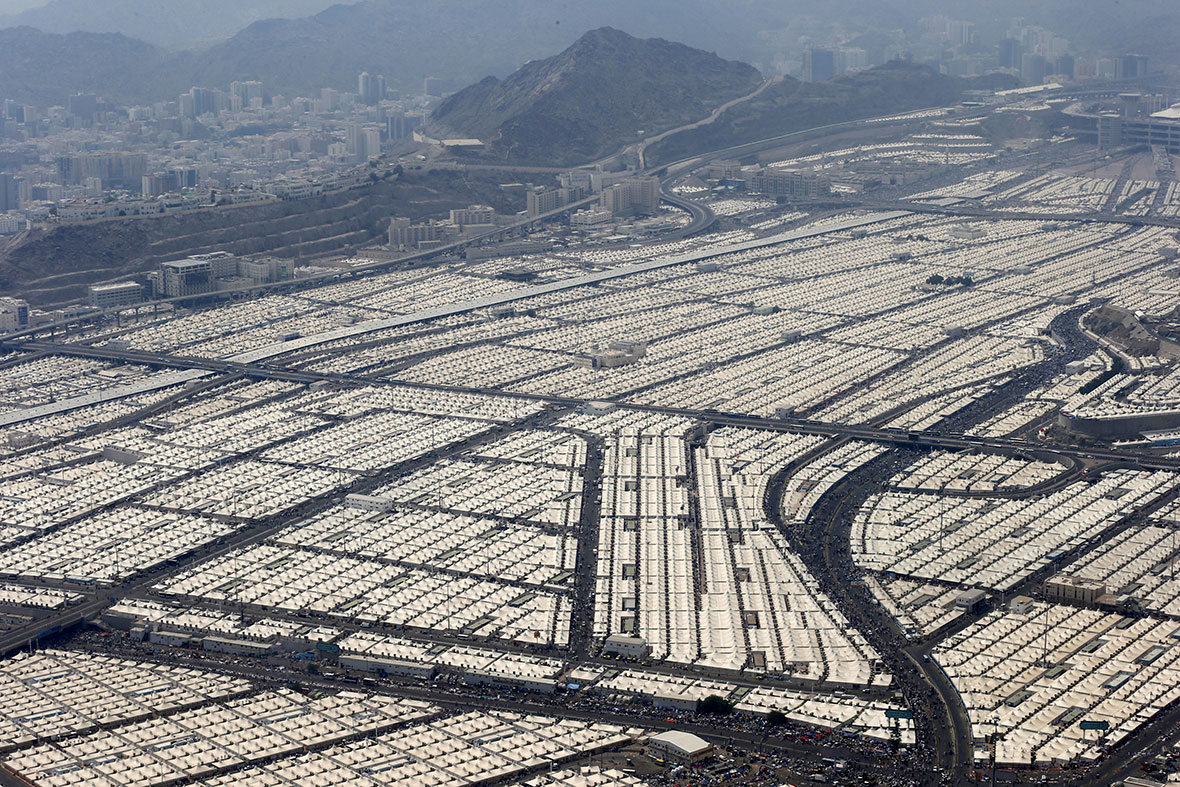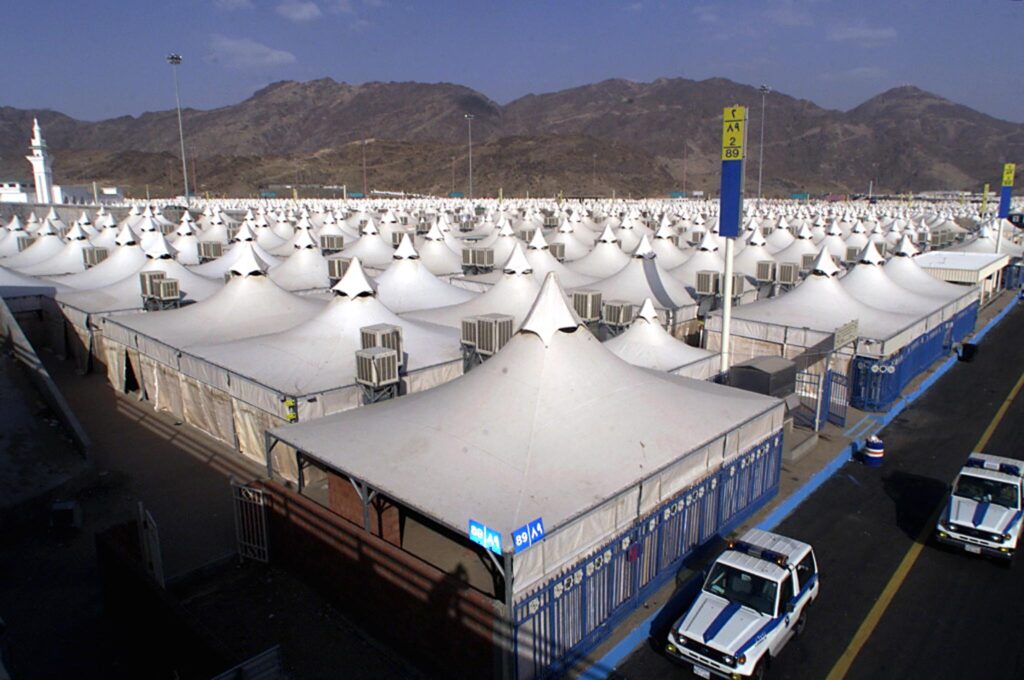بسم الله الرحمن الرحيم
Assalamu Alaikum.
(Here are Parts 1, 2, 3, 4, 5, 6, 7 and 8.)
In this part, we start with the days of Hajj. Hajj consists of 6 days, starting from the 8th of Dhul Hijjah to the 13th of Dhul Hijjah. Each day has a name and has acts specific to it. The first two days will be covered in this part, and the remaining 4 days in the next part, in shaa Allah.
This year is the first post-covid year where there are no limits to the Hajj pilgrims so it should be the most “normal” Hajj since 2019, in shaa Allah.
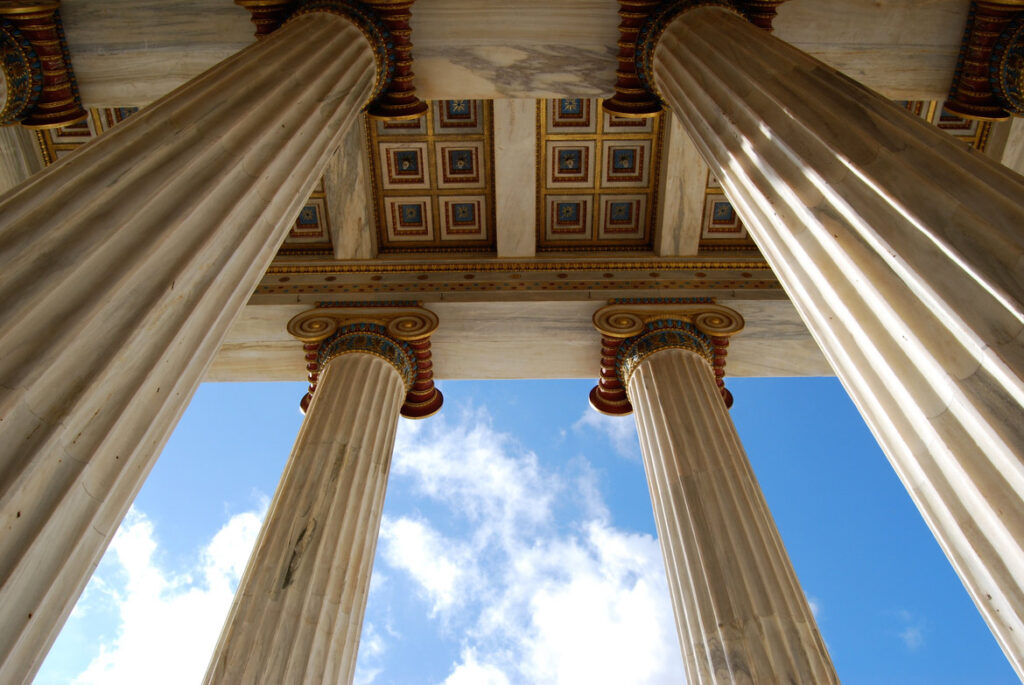
PILLARS OF HAJJ
As mentioned in Part 5, if the pilgrim leaves a pillar, then his/her Hajj is invalid. The pillars of Hajj are as follows:
1. Assuming ihram
One should intend to assume ihram for Hajj.
عن عُمَرَ بْنَ الْخَطَّابِ ـ رضى الله عنه قَالَ سَمِعْتُ رَسُولَ اللَّهِ صلى الله عليه وسلم يَقُولُ :إِنَّمَا الأَعْمَالُ بِالنِّيَّاتِ، وَإِنَّمَا لِكُلِّ امْرِئٍ مَا نَوَى، فَمَنْ كَانَتْ هِجْرَتُهُ إِلَى دُنْيَا يُصِيبُهَا أَوْ إِلَى امْرَأَةٍ يَنْكِحُهَا فَهِجْرَتُهُ إِلَى مَا هَاجَرَ إِلَيْهِ
Umar ibn Al-Khattab (radiallahu anhu) narrated: I heard Allah’s Messenger (sallallahu alaihi wasallam) saying, “The reward of deeds depends upon the intentions and every person will get the reward according to what he has intended. So whoever emigrated for worldly benefits or for a woman to marry, his emigration was for what he emigrated for.” [Sahih Al-Bukhari, Volume 1, Hadeeth No. 1]
2. Standing in Arafah
Standing in Arafah means actually being at Arafah. It does not mean that one is required to stand throughout their time in Arafah.
لَيْسَ عَلَيْكُمْ جُنَاحٌ أَن تَبْتَغُوا فَضْلًا مِّن رَّبِّكُمْ ۚ فَإِذَا أَفَضْتُم مِّنْ عَرَفَاتٍ فَاذْكُرُوا اللَّـهَ عِندَ الْمَشْعَرِ الْحَرَامِ ۖ وَاذْكُرُوهُ كَمَا هَدَاكُمْ وَإِن كُنتُم مِّن قَبْلِهِ لَمِنَ الضَّالِّينَ
There is no sin on you if you seek the Bounty of your Lord (during pilgrimage by trading, etc.). Then when you leave Arafaat, remember Allah (by glorifying His Praises, i.e. prayers and invocations, etc.) at the Mashar-al-Haraam. And remember Him (by invoking Allah for all good, etc.) as He has guided you, and verily, you were, before, of those who were astray. Then depart from the place whence all the people depart and ask Allah for His Forgiveness. Truly, Allah is Oft-Forgiving, Most-Merciful. [Surah Al-Baqarah (2) : 198]
Shaikh Saeed Al-Qahtani points out in his book “Manaasak Al-Hajj wal-Umrah” that one can only leave a place after one has been there. So this ayah (verse) shows that one has to stand in Arafah.
عَنْ بُكَيْرِ بْنِ عَطَاءٍ، سَمِعْتُ عَبْدَ الرَّحْمَنِ بْنَ يَعْمُرَ الدِّيلِيَّ، قَالَ شَهِدْتُ رَسُولَ اللَّهِ ـ صلى الله عليه وسلم ـ وَهُوَ وَاقِفٌ بِعَرَفَةَ وَأَتَاهُ نَاسٌ مِنْ أَهْلِ نَجْدٍ فَقَالُوا يَا رَسُولَ اللَّهِ كَيْفَ الْحَجُّ قَالَ : الْحَجُّ عَرَفَةُ فَمَنْ جَاءَ قَبْلَ صَلاَةِ الْفَجْرِ لَيْلَةَ جَمْعٍ فَقَدْ تَمَّ حَجُّهُ أَيَّامُ مِنًى ثَلاَثَةٌ فَمَنْ تَعَجَّلَ فِي يَوْمَيْنِ فَلاَ إِثْمَ عَلَيْهِ وَمَنْ تَأَخَّرَ فَلاَ إِثْمَ عَلَيْهِ
فَمَن تَعَجَّلَ فِي يَوْمَيْنِ فَلَا إِثْمَ عَلَيْهِ وَمَن تَأَخَّرَ فَلَا إِثْمَ عَلَيْهِ
But whosoever hastens to leave in two days, there is no sin on him and whosoever stays on, there is no sin on him. [Surah Al-Baqarah (2) : 203]
عَنْ عَبْدِ الرَّحْمَنِ بْنِ يَعْمَرَ، قَالَ قَالَ رَسُولُ اللَّهِ صلى الله عليه وسلم : الْحَجُّ عَرَفَاتٌ الْحَجُّ عَرَفَاتٌ الْحَجُّ عَرَفَاتٌ أَيَّامُ مِنًى ثَلاَثٌ (فَمَنْ تَعَجَّلَ فِي يَوْمَيْنِ فَلاَ إِثْمَ عَلَيْهِ وَمَنْ تَأَخَّرَ فَلاَ إِثْمَ عَلَيْهِ ) وَمَنْ أَدْرَكَ عَرَفَةَ قَبْلَ أَنْ يَطْلُعَ الْفَجْرُ فَقَدْ أَدْرَكَ الْحَجَّ
فَمَن تَعَجَّلَ فِي يَوْمَيْنِ فَلَا إِثْمَ عَلَيْهِ وَمَن تَأَخَّرَ فَلَا إِثْمَ عَلَيْهِ
But whosoever hastens to leave in two days, there is no sin on him and whosoever stays on, there is no sin on him. [Surah Al-Baqarah (2) : 203]
3. Tawaf Al-Ifaadhah
This is the tawaf of Hajj and is also referred to as Tawaf Az-Ziyarah (Tawaf of Visiting).
ثُمَّ لْيَقْضُوا تَفَثَهُمْ وَلْيُوفُوا نُذُورَهُمْ وَلْيَطَّوَّفُوا بِالْبَيْتِ الْعَتِيقِ
Then let them complete the prescribed duties (Manaasik of Hajj) for them, and perform their vows, and circumambulate the Ancient House (the Kabah at Makkah). [Surah Al-Hajj (22) : 29]
عَنْ أَبِي سَلَمَةَ، وَعُرْوَةَ، أَنَّ عَائِشَةَ، قَالَتْ حَاضَتْ صَفِيَّةُ بِنْتُ حُيَىٍّ بَعْدَ مَا أَفَاضَتْ – قَالَتْ عَائِشَةُ – فَذَكَرْتُ حِيضَتَهَا لِرَسُولِ اللَّهِ صلى الله عليه وسلم فَقَالَ رَسُولُ اللَّهِ صلى الله عليه وسلم : أَحَابِسَتُنَا هِيَ . قَالَتْ فَقُلْتُ يَا رَسُولَ اللَّهِ إِنَّهَا قَدْ كَانَتْ أَفَاضَتْ وَطَافَتْ بِالْبَيْتِ ثُمَّ حَاضَتْ بَعْدَ الإِفَاضَةِ . فَقَالَ رَسُولُ اللَّهِ صلى الله عليه وسلم : فَلْتَنْفِرْ
Abu Salamah and Urwah narrated that Aishah (radiallahu anha)) said: Safiyyah bint Huyayy entered the period of menses after performing Tawaf Al-Ifaadah. I made a mention of her menses to Allah’s Messenger (sallallahu alaihi wasallam), whereupon Allah’s Messenger (sallallahu alaihi wasallam) remarked: Well, then she will detain us. I said: Messenger of Allah, she has performed Tawaf Al-Ifaadah and circumambulated the House, and it was after this that she entered the period of menses. Thereupon Allah’s Messenger (sallallahu alaihi wasallam) said: (If it is so), then proceed forth. [Sahih Muslim, Hadeeth No. 3060]
4. Saee between As-Safa and Al-Marwah
This is the saee for Hajj for those who are doing Hajj At-Tamattu. Those are doing Hajj Ifrad or Qiran and have performed saee during Umrah are not obligated to do another saee. However, if they did not do the saee during Umrah, they are obliged to do it during Hajj.
إِنَّ الصَّفَا وَالْمَرْوَةَ مِن شَعَائِرِ اللَّـهِ ۖ فَمَنْ حَجَّ الْبَيْتَ أَوِ اعْتَمَرَ فَلَا جُنَاحَ عَلَيْهِ أَن يَطَّوَّفَ بِهِمَا ۚ وَمَن تَطَوَّعَ خَيْرًا فَإِنَّ اللَّـهَ شَاكِرٌ عَلِيمٌ
Verily! As-Safa and Al-Marwah (two mountains in Makkah) are of the Symbols of Allah. So it is not a sin on him who perform Hajj or Umrah (pilgrimage) of the House (the Kabah at Makkah) to perform the going (Tawaf) between them (As-Safa and Al-Marwah). And whoever does good voluntarily, then verily, Allah is All-Recogniser, All-Knower. [Surah Al-Baqarah (2) : 158]
The tawaf mentioned here is saee, not the tawaf of the Kabah.
عَنْ هِشَامِ بْنِ عُرْوَةَ، عَنْ أَبِيهِ، عَنْ عَائِشَةَ، قَالَ قُلْتُ لَهَا إِنِّي لأَظُنُّ رَجُلاً لَوْ لَمْ يَطُفْ بَيْنَ الصَّفَا وَالْمَرْوَةِ مَا ضَرَّهُ . قَالَتْ لِمَ قُلْتُ لأَنَّ اللَّهَ تَعَالَى يَقُولُ { إِنَّ الصَّفَا وَالْمَرْوَةَ مِنْ شَعَائِرِ اللَّهِ} إِلَى آخِرِ الآيَةِ . فَقَالَتْ مَا أَتَمَّ اللَّهُ حَجَّ امْرِئٍ وَلاَ عُمْرَتَهُ لَمْ يَطُفْ بَيْنَ الصَّفَا وَالْمَرْوَةِ وَلَوْ كَانَ كَمَا تَقُولُ لَكَانَ فَلاَ جُنَاحَ عَلَيْهِ أَنْ لاَ يَطَّوَّفَ بِهِمَا . وَهَلْ تَدْرِي فِيمَا كَانَ ذَاكَ إِنَّمَا كَانَ ذَاكَ أَنَّ الأَنْصَارَ كَانُوا يُهِلُّونَ فِي الْجَاهِلِيَّةِ لِصَنَمَيْنِ عَلَى شَطِّ الْبَحْرِ يُقَالُ لَهُمَا إِسَافٌ وَنَائِلَةٌ . ثُمَّ يَجِيئُونَ فَيَطُوفُونَ بَيْنَ الصَّفَا وَالْمَرْوَةِ ثُمَّ يَحْلِقُونَ . فَلَمَّا جَاءَ الإِسْلاَمُ كَرِهُوا أَنْ يَطُوفُوا بَيْنَهُمَا لِلَّذِي كَانُوا يَصْنَعُونَ فِي الْجَاهِلِيَّةِ قَالَتْ فَأَنْزَلَ اللَّهُ عَزَّ وَجَلَّ { إِنَّ الصَّفَا وَالْمَرْوَةَ مِنْ شَعَائِرِ اللَّهِ} إِلَى آخِرِهَا – قَالَتْ – فَطَافُوا .
Hisham ibn Urwah reported on the authority of his father who narrated from Aishah (radiallahu anha). He said to Aishah: I think if a person does not run between as-Safa and al-Marwah, it does not do any harm to him (so far as Hajj is concerned). She said: Why (do you think so)? I said: For Allah says:
إِنَّ الصَّفَا وَالْمَرْوَةَ مِن شَعَائِرِ اللَّـهِ
Verily! As-Safa and Al-Marwah (two mountains in Makkah) are of the Symbols of Allah. [Surah Al-Baqarah (2) : 158] (to the end of the verse),
whereupon she said: Allah does not complete the Hajj of a person or his Umrah if he does not observe Saee between as-Safa and al-Marwha; and if it were so as you state, then (the wording would have been (fala janah an la yatufu biha) [” There is no harm for him if he does not circumambulate between them’]. Do you know in what context (this verse was revealed)? (It was revealed in this context) that the Ansar in the Days of Ignorance pronounced the Talbiya for two idols fixed on the bank of the river which were called Isaf and Naila. The people went there, and then circumambulated between as-Safa and al-Marwah and then got their heads shaved. With the advent of Islam they (the Muslims) did not like to circumambulate between them as they used to do during the Days of Ignorance. It was on account of this that Allah. the Exalted and Majestic, revealed:
إِنَّ الصَّفَا وَالْمَرْوَةَ مِن شَعَائِرِ اللَّـهِ
Verily! As-Safa and Al-Marwah (two mountains in Makkah) are of the Symbols of Allah. [Surah Al-Baqarah (2) : 158] to the end of the verse.
She said: Then people began to observe Saee. [Sahih Muslim, Hadeeth No. 2923]
عن حبيبة بنت أبي تجراة قالت :قال النبي صلى الله عليه وسلم: اسْعَوُا ، فإِنَّ اللهَ قدْ كَتَبَ عليْكمْ السَّعْيَ
Habeebah bint Abee Tijaarah (radiallahu anha) narrated that the Prophet (sallallahu alaihi wasallam) said: “Do saee because Allah has ordained saee upon you.” [Sahih Al-Jaami, Hadeeth No. 968]

OBLIGATIONS OF HAJJ
If one leaves an obligation, one needs to offer a sacrifice for each obligation that was left. However, the person’s Hajj is still valid.
The obligations of Hajj are as follows:
1.Assuming Ihram at the Meeqat
عنِ ابنِ عباسٍ قال إنَّ النبيَّ صلى الله عليه وسلّم وَقَّتَ لأهلِ المدينةِ ذا الحُلَيفةِ، ولأهلِ الشأْمِ الجُحفَة، ولأهلِ نجدٍ قرْنَ المنازِلِ، ولأهل اليمنِ يَلَمْلَمَ، هنَّ لهنَّ ولمن أتى عليهنَّ مِن غيرِهنَّ ممن أرادَ الحجَّ والعُمرةَ، ومَن كانَ دُونَ ذلكَ فمن حيثُ أنشأَ، حتى أهلُ مكةَ مِن مكةَ
Narrated Ibn Abbas (radiallahu anhuma): Allah’s Messenger (sallallahu alaihi wasallam) made Dhul Hulaifah the Meeqat for the people of Madinah; Al-Juhfah for the people of Sham; Qarn Al-Manazil for the people of Najd; and Yalamlam for the people of Yemen; and these Mawaqeet are for the people at those very places, and besides them for those who come thorough those places with the intention of performing Hajj and Umrah; and whoever is living within these boundaries can assume lhram from the place he starts, and the people of Makkah can assume Ihram from Makkah. [Sahih Al-Bukhari, Volume 2, Hadeeth No. 599]
This is what I stated in Part 5 of this series when talking about Umrah:
“Please note that entering ihram itself is a pillar, but entering it at the meeqat is an obligation. So if someone enters ihram after the meeqat, his Umrah is still valid but he needs to pay the penalty (i.e. sacrifice) for missing an obligatory act. This animal must be slaughtered in Makkah and its meat is distributed to the poor people of Makkah. (To know more about the types of sacrifices in Hajj and Umrah, please refer to this article.)
However, if someone does not enter ihram at all, his Umrah is invalid.”
Similarly, if one who enters ihram after the meeqat, his Hajj is valid but he needs to offer a sacrifice. If he does not assume ihram at all, his Hajj is not valid, as he did not fulfill a pillar.
Those people who are in Makkah can assume ihram in Makkah itself, unlike in Umrah where they are required to leave the haram area before assuming ihram.
2. Standing in Arafah until sunset, for the one who came during the day
It states in the Hadeeth of Jaabir (radiallahu anhu):
فَلَمَّا كَانَ يَوْمُ التَّرْوِيَةِ تَوَجَّهُوا إِلَى مِنًى. فَأَهَلُّوا بِالْحَجِّ يَوْمَ التَّرْوِيَةِ. وَرَكِبَ رَسُولُ اللّهِ فَصَلَّى بِهَا الظُّهْرَ وَالْعَصْرَ وَالْمَغْرِبَ وَالْعِشَاءَ وَالْفَجْرَ. ثُمَّ مَكَثَ قَلِيلاً حَتَّى طَلَعَتِ الشَّمْسُ. وَأَمَرَ بِقُبَّةٍ مِنْ شَعَرٍ تُضْرَبُ لَهُ بِنَمِرَةَ. فَسَارَ رَسُولُ اللّهِ وَلاَ تَشُكُّ قُرَيْشٌ إِلاَّ أَنَّهُ وَاقِفٌ عِنْدَ الْمَشْعَرِ الْحَرَامِ.كَمَا كَانَتْ قُرَيْشٌ تَصْنَعُ فِي الْجَاهِلِيَّةِ. فَأَجَازَ رَسُولُ اللّهِ حَتَّى أَتَى عَرَفَةَ. فَوَجَدَ القُبَّةَ قَدْ ضُرِبَتْ لَهُ بِنَمِرَةَ. فَنَزَلَ بِهَا. حَتَّى إِذَا زَاغَتِ الشَّمْسُ أَمَرَ بِالْقَصْوَاءِ. فَرُحِلَتْ لَهُ. فَأَتَى بَطْنَ الْوَادِي. فَخَطَبَ النَّاسَ وَقَالَ: إِنَّ دِمَاءَكُمْ وَأَمْوَالَكُمْ حَرَامٌ عَلَيْكُمْ، كَحُرْمَةِ يَوْمِكُمْ هذَا، فِي شَهْرِكُمْ هذَا، فِي بَلَدِكُمْ هذَا. أَلاَ كُلُّ شَيْءٍ مِنْ أَمْرِ الْجَاهِلِيَّةِ تَحْتَ قَدَمَيَّ مَوْضُوعٌ، وَدِمَاءُ الْجَاهِلِيَّةِ مَوْضُوعَةٌ، وَإِنَّ أَوَّلَ دَمٍ أَضَعُ مِنْ دِمَائِنَا دَمُ ابْنِ رَبِيعَةَ بْنِ الْحَارِثِ، كَانَ مُسْتَرْضِعاً فِي بَنِي سَعْدٍ فَقَتَلَتْهُ هُذَيْلٌ، وَرِبَا الْجَاهِلِيَّةِ مَوْضُوعٌ، وَأَوَّلُ رِباً أَضَعُ رِبَانَا، رِبَا عَبَّاسِ بْنِ عَبْدِ الْمُطَّلِبِ. فَإِنَّهُ مَوْضُوعٌ كُلُّهُ. فَاتَّقُوا اللّهِ فِي النِّسَاءِ. فَإِنَّكُمْ أَخَذْتُمُوهُنَّ بِأَمَانِ اللّهِ، وَاسْتَحْلَلْتُمْ فُرُوجَهُنَّ بِكَلِمَةِ اللّهِ. وَلَكُمْ عَلَيْهِنَّ أَنْ لاَ يُوطِئْنَ فُرُشَكُمْ أَحَداً تَكْرَهُونَهُ. فَإِنْ فَعَلْنَ ذَلِكَ فَاضْرِبُوهُنَّ ضَرْباً غَيْرَ مُبَرِّحٍ. وَلَهُنَّ عَلَيْكُمْ رِزْقُهُنَّ وَكِسْوَتُهُنَّ بِالْمَعْرُوفِ. وَقَدْ تَرَكْتُ فِيكُمْ مَا لَنْ تَضِلُّوا بَعْدَهُ إِنِ اعْتَصَمْتُمْ بِهِ. كِتَابُ اللّهِ. وَأَنْتُمْ تُسْأَلُونَ عَنِّي. فَمَا أَنْتُمْ قَائِلُونَ؟ قَالُوا: نَشْهَدُ أَنَّكَ قَدْ بَلَّغْتَ وَأَدَّيْتَ وَنَصَحْتَ. فَقَالَ بِإِصْبَعِهِ السَّبَّابَةِ، يَرْفَعُهَا إِلَى السَّمَاءِ وَيَنْكُتُهَا إِلَى النَّاسِ: اللَّهُمَّ اشْهَدْ. اللَّهُمَّ اشْهَدْ. ثَلاَثَ مَرَّاتٍ. ثُمَّ أَذَّنَ. ثُمَّ أَقَامَ فَصَلَّى الظُّهْرَ. ثُمَّ أَقَامَ فَصَلَّى الْعَصْرَ. وَلَمْ يُصَلِّ بَيْنَهُمَا شَيْئاً. ثُمَّ رَكِبَ رَسُولُ اللّهِ . حَتَّى أَتَى الْمَوْقِفَ. فَجَعَلَ بَطْنَ نَاقَتِهِ الْقَصْوَاءِ إِلَى الصَّخَرَاتِ. وَجَعَلَ حَبْلَ الْمُشَاةِ بَيْنَ يَدَيْهِ. وَاسْتَقْبَلَ الْقِبْلَةَ. فَلَمْ يَزَلْ وَاقِفاً حَتَّى غَرَبَتِ الشَّمْسُ. وَذَهَبَتِ الصُّفْرَةُ قَلِيلاً حَتَّى غَابَ الْقُرْصُ. وَأَرْدَفَ أُسَامَةَ خَلْفَهُ. وَدَفَعَ رَسُولُ اللّهِ وَقَدْ شَنَقَ لِلْقَصْوَاءِ الزِّمَامَ. حَتَّى إِنَّ رَأْسَهَا لَيُصِيبُ مَوْرِكَ رَحْلِهِ. وَيَقُولُ بِيَدِهِ الْيُمْنَى: أَيُّهَا النَّاسُ السَّكِينَةَ السَّكِينَةَ. كُلَّمَا أَتَى حَبْلاً مِنَ الْحِبَالِ أَرْخَى لَهَا قَليلاً.حَتَّى تَصْعَدَ. حَتَّى أَتَى الْمُزْدَلِفَةَ
When it was the day of Tarwiyah (8th of Dhul Hijjah) they went to Mina and put on the ihram for Hajj and the Messenger of Allah (sallahu alaihi wasallam) rode and led the Dhuhr, Asr, Maghrib, Isha and Fajr prayers. He then waited a little until the sun rose, and commanded that a tent of hair should be pitched at Namirah. The Messenger of Allah (sallahu alaihi wasallam) then set out and the Quraish did not doubt that he would halt at al-Mashar al-Haram (the sacred site) as the Quraish used to do in the pre-Islamic period. The Messenger of Allah (sallahu alaihi wasallam), however, passed on until he came to Arafah and he found that the tent had been pitched for him at Namirah. There he got down until the sun had passed the meridian; he commanded that al-Qaswa should be brought and saddled for him.
Then he came to the bottom of the valley, and addressed the people saying: Verily your blood, your property are as sacred and inviolable as the sacredness of this day of yours, in this month of yours, in this town of yours. Behold! Everything pertaining to the Days of Ignorance is under my feet completely abolished. Abolished are also the blood-revenges of the Days of Ignorance. The first claim of ours on blood-revenge which I abolish is that of the son of Rabia ibn al-Harith, who was nursed among the tribe of Sad and killed by Hudhail. And the riba of the pre-Islamic period is abolished, and the first of our riba I abolish is that of Abbas ibn Abdil-Muttalib, for it is all abolished. Fear Allah concerning women! Verily you have taken them on the security of Allah, and intercourse with them has been made lawful unto you by words of Allah. You too have right over them, and that they should not allow anyone to sit on your bed whom you do not like. But if they do that, you can chastise them but not severely. Their rights upon you are that you should provide them with food and clothing in a fitting manner. I have left among you the Book of Allah, and if you hold fast to it, you would never go astray. And you would be asked about me (on the Day of Resurrection), (now tell me) what would you say?
They (the audience) said: We will bear witness that you have conveyed (the message), discharged (the ministry of Prophethood) and given wise (sincere) counsel. He (the narrator) said: He (the Prophet) then raised his forefinger towards the sky and pointing it at the people (said):” O Allah, be witness. 0 Allah, be witness,” saying it thrice. (Bilal then) pronounced Adhan and later on Iqamah and he (the Prophet) led the noon prayer. He (Bilal) then uttered Iqamah and he (the Prophet) led the afternoon prayer and he observed no other prayer in between the two.
The Messenger of Allah (sallahu alaihi wasallam) then mounted his camel and came to the place of stay, making his she-camel al-Qaswa, turn towards the side where there we are rocks, having the path taken by those who went on foot in front of him, and faced the Qibla. He kept standing there until the sun set, and the yellow light had somewhat gone, and the disc of the sun had disappeared. He made Usama (radiallahu anhu) sit behind him, and he pulled the nose-string of Qaswa so forcefully that its head touched the saddle (in order to keep her under perfect control), and he pointed out to the people with his right hand to be moderate (in speed), and whenever he happened to pass over an elevated tract of sand, he slightly loosened it (the nose-string of his camel) until she climbed up and this is how he reached al-Muzdalifah. [Sahih Muslim, Hadeeth No. 2803]
The Prophet (sallallahu alaihi wasallam) stayed in Arafah until the sun had set and left only after that.
Shaikh Saeed Al-Qahtani points out in his book “Manaasak Al-Hajj wal-Umrah” that it is not known that anyone got permission to leave Arafah early (i.e. before sunset) whereas we have narrations that shows that some people were permitted to leave Muzdalifah early (as is proven in the next point).
3. Staying overnight in Muzdalifah
فَإِذَا أَفَضْتُم مِّنْ عَرَفَاتٍ فَاذْكُرُوا اللَّـهَ عِندَ الْمَشْعَرِ الْحَرَامِ ۖ وَاذْكُرُوهُ كَمَا هَدَاكُمْ وَإِن كُنتُم مِّن قَبْلِهِ لَمِنَ الضَّالِّينَ
Then when you leave Arafaat, remember Allah (by glorifying His Praises, i.e. prayers and invocations, etc.) at the Mashar-al-Haraam. And remember Him (by invoking Allah for all good, etc.) as He has guided you, and verily, you were, before, of those who were astray. Then depart from the place whence all the people depart and ask Allah for His Forgiveness. Truly, Allah is Oft-Forgiving, Most-Merciful. [Surah Al-Baqarah (2) : 198]
Shaikh Saeed Al-Qahtani points out that the people were ordered to remember Allah at Muzdalifah (thus implying that they were required to stay there). He also points out that some people were granted a concession to leave Muzdalifah early i.e. after the middle of the night.
عن ابْن عَبَّاسٍ ـ رضى الله عنهما ـ يَقُولُ أَنَا مِمَّنْ، قَدَّمَ النَّبِيُّ صلى الله عليه وسلم لَيْلَةَ الْمُزْدَلِفَةِ فِي ضَعَفَةِ أَهْلِهِ
Narrated Ibn Abbas (radiallahu anhuma): I was among those whom the Prophet (sallallahu alaihi wasallam) sent on the night of Al-Muzdalifah early being among the weak members of his family. [Sahih Al-Bukhari, Volume 2, Hadeeth No. 738]
عَن سَالِم وَكَانَ عَبْدُ اللَّهِ بْنُ عُمَرَ ـ رضى الله عنهما ـ يُقَدِّمُ ضَعَفَةَ أَهْلِهِ، فَيَقِفُونَ عِنْدَ الْمَشْعَرِ الْحَرَامِ بِالْمُزْدَلِفَةِ بِلَيْلٍ، فَيَذْكُرُونَ اللَّهَ مَا بَدَا لَهُمْ، ثُمَّ يَرْجِعُونَ قَبْلَ أَنْ يَقِفَ الإِمَامُ، وَقَبْلَ أَنْ يَدْفَعَ، فَمِنْهُمْ مَنْ يَقْدَمُ مِنًى لِصَلاَةِ الْفَجْرِ، وَمِنْهُمْ مَنْ يَقْدَمُ بَعْدَ ذَلِكَ، فَإِذَا قَدِمُوا رَمَوُا الْجَمْرَةَ، وَكَانَ ابْنُ عُمَرَ ـ رضى الله عنهما ـ يَقُولُ أَرْخَصَ فِي أُولَئِكَ رَسُولُ اللَّهِ صلى الله عليه وسلم.
Narrated Salim: Abdullah bin Umar (radiallahu anhuma) used to send the weak among his family early to Mina. So they used to depart from Al-Mashar Al-Haram (Al-Muzdalifa) at night (when the moon had set) and invoke Allah as much as they could, and then they would return (to Mina) before the Imam had started from Al-Muzdalifah to Mina. So some of them would reach Mina at the time of the Fajr prayer and some of them would come later. When they reached Mina they would throw pebbles on the Jamrah (Jamrat Al-Aqabah).
Ibn Umar used to say, “Allah’s Messenger (sallallahu alaihi wasallam) gave the permission to them (weak people) to do so.” [Sahih Al-Bukhari, Volume 2, Hadeeth No. 736]
If the people were not obliged to stay at Muzdalifah, there would be no reason to provide a concession.
4. Staying overnight in Mina during the Days of Tashreeq (11th-13th of Dhul Hijjah)
The one who wishes to hasten needs to stay in Mina for two nights whereas the one who wishes to stay on should spend three nights there, as mentioned in the following ayah (verse):
وَاذْكُرُوا اللَّـهَ فِي أَيَّامٍ مَّعْدُودَاتٍ ۚ فَمَن تَعَجَّلَ فِي يَوْمَيْنِ فَلَا إِثْمَ عَلَيْهِ وَمَن تَأَخَّرَ فَلَا إِثْمَ عَلَيْهِ ۚ لِمَنِ اتَّقَىٰ ۗ وَاتَّقُوا اللَّـهَ وَاعْلَمُوا أَنَّكُمْ إِلَيْهِ تُحْشَرُونَ
And remember Allah during the appointed Days. But whosoever hastens to leave in two days, there is no sin on him and whosoever stays on, there is no sin on him, if his aim is to do good and obey Allah (fear Him), and know that you will surely be gathered unto Him. [Surah Al-Baqarah (2) : 203]
Those who provide water to the pilgrims are allowed to stay in Makkah instead of Mina.
عَنِ ابْنِ عُمَرَ، قَالَ اسْتَأْذَنَ الْعَبَّاسُ بْنُ عَبْدِ الْمُطَّلِبِ رَسُولَ اللَّهِ ـ صلى الله عليه وسلم ـ أَنْ يَبِيتَ بِمَكَّةَ أَيَّامَ مِنًى مِنْ أَجْلِ سِقَايَتِهِ فَأَذِنَ لَهُ
It was narrated that Ibn Umar (radiallahu anhuma) said: “Abbas bin Abdul-Muttalib asked the Messenger of Allah (sallallahu alaihi wasallam) for permission to stay overnight in Makkah on the nights of Mina for the purpose of supplying water to the pilgrims, and he gave him permission. [Sunan Ibn Majah, Hadeeth No. 3065. Graded “sahih” (authentic) by Al-Albani.]
If one is able to give the pilgrims nabeedh (water sweetened with dates) to drink, then one should do so as the Prophet (sallallahu alaihi wasallam) approved of that.
عَنْ بَكْرِ بْنِ عَبْدِ اللَّهِ الْمُزَنِيِّ، قَالَ كُنْتُ جَالِسًا مَعَ ابْنِ عَبَّاسٍ عِنْدَ الْكَعْبَةِ فَأَتَاهُ أَعْرَابِيٌّ فَقَالَ مَا لِي أَرَى بَنِي عَمِّكُمْ يَسْقُونَ الْعَسَلَ وَاللَّبَنَ وَأَنْتُمْ تَسْقُونَ النَّبِيذَ أَمِنْ حَاجَةٍ بِكُمْ أَمْ مِنْ بُخْلٍ فَقَالَ ابْنُ عَبَّاسٍ الْحَمْدُ لِلَّهِ مَا بِنَا مِنْ حَاجَةٍ وَلاَ بُخْلٍ قَدِمَ النَّبِيُّ صلى الله عليه وسلم عَلَى رَاحِلَتِهِ وَخَلْفَهُ أُسَامَةُ فَاسْتَسْقَى فَأَتَيْنَاهُ بِإِنَاءٍ مِنْ نَبِيذٍ فَشَرِبَ وَسَقَى فَضْلَهُ أُسَامَةَ وَقَالَ : أَحْسَنْتُمْ وَأَجْمَلْتُمْ كَذَا فَاصْنَعُوا . فَلاَ نُرِيدُ تَغْيِيرَ مَا أَمَرَ بِهِ رَسُولُ اللَّهِ صلى الله عليه وسلم
Bakr ibn Abdullah al-Muzani said: While I was sitting along with Ibn Abbas (radiallahu anhuma) near the Kabah, there came a bedouin to him and said: What is the matter that I see that the progeny of your uncle supply honey and milk (as drink to the travellers), whereas you supply al-nabeedh (water sweetened with dates)? Is it due to your poverty or due to your close-fistedness? Thereupon Ibn Abbas said: Allah be praised, it is neither due to poverty nor due to close-fistedness (but due to the fact) that Allah’s Messenger (sallallahu alaihi wasallam) came here riding his she-came, and there was sitting behind him Usaamah. He asked for water, and we gave him a cup full of nabeedh and he drank it, and gave the remaining (part) to Usaamah; and he (the Prophet) said: “You have done good, You have done well. So continue doing like it.” So we do not like to change what Allah’s Messenger (sallallahu alaihi wasallam) had commanded us to do. [Sahih Muslim, Hadeeth No. 3018]
Those who have livestock to take care of are also exempted from staying in Mina.
عَنْ أَبِي الْبَدَّاحِ بْنِ عَاصِمِ بْنِ عَدِيٍّ، عَنْ أَبِيهِ، أَنَّ رَسُولَ اللَّهِ صلى الله عليه وسلم رَخَّصَ لِلرُّعَاةِ فِي الْبَيْتُوتَةِ يَرْمُونَ يَوْمَ النَّحْرِ وَالْيَوْمَيْنِ اللَّذَيْنِ بَعْدَهُ يَجْمَعُونَهُمَا فِي أَحَدِهِمَا
It was narrated from al-Baddah bin Asim bin Adiyy from his father, that the Messenger of Allah granted a concession to some camel herders, allowing them to not stay overnight in Mina, and allowing them to stone the Jimar on the Day of Sacrifice, then to combine the stoning of two days after sacrifice, so that they could do it on one of the two days. [Sunan An-Nasai, Hadeeth No. 3071. Graded “sahih” (authentic) by Al-Albani.]
Shaikh Saeed Al-Qahtani quotes Imam ibn Baz as saying that those that are similar to camel herders are also exempted, for example those that are ill or those who work as security guards.
I would advise those that might require an exemption to get a fatwa (ruling) directly from a person of knowledge, rather than assuming that they are exempt.
5. Stoning the Jamraat in the correct order
وَاذْكُرُوا اللَّـهَ فِي أَيَّامٍ مَّعْدُودَاتٍ ۚ فَمَن تَعَجَّلَ فِي يَوْمَيْنِ فَلَا إِثْمَ عَلَيْهِ وَمَن تَأَخَّرَ فَلَا إِثْمَ عَلَيْهِ ۚ لِمَنِ اتَّقَىٰ ۗ وَاتَّقُوا اللَّـهَ وَاعْلَمُوا أَنَّكُمْ إِلَيْهِ تُحْشَرُونَ
And remember Allah during the appointed Days. But whosoever hastens to leave in two days, there is no sin on him and whosoever stays on, there is no sin on him, if his aim is to do good and obey Allah (fear Him), and know that you will surely be gathered unto Him. [Surah Al-Baqarah (2) : 203]
Shaikh Saeed Al-Qahtani points out that the people were ordered to remember Allah during the Days of Tashreeq (i.e. the days in Mina) and the only remembrance specified (in the Sunnah) is stoning the pillars.
عن عائشة قالت: قال رسول الله صلى الله عليه وسلّم: إنما جعل الطواف بالبيت وبين الصفا والمروة ورمى الجمار لإقامة ذكر الله
The Prophet (sallallahu alaihi wasallam) said, “The Tawaaf of the House and between As-Safa and Al-Marwah (i.e. Saee) and stoning the Jimaar are only done for the establishment of Allah’s remembrance.” [Sahih Ibn Khuzaimah, Hadeeth No. 2882. Graded “sahih” (authentic) by Mustafa Azami.]
The largest pillar (Jamrat Al-Aqabah) is stoned on the 10th of Dhul Hijjah and all three pillars are stoned each day in the Days of Tashreeq. The details will be mentioned in the next part, in shaa Allah.
6. Shaving or trimming the hair
وَأَتِمُّوا الْحَجَّ وَالْعُمْرَةَ لِلَّـهِ ۚ فَإِنْ أُحْصِرْتُمْ فَمَا اسْتَيْسَرَ مِنَ الْهَدْيِ ۖ وَلَا تَحْلِقُوا رُءُوسَكُمْ حَتَّىٰ يَبْلُغَ الْهَدْيُ مَحِلَّهُ ۚ فَمَن كَانَ مِنكُم مَّرِيضًا أَوْ بِهِ أَذًى مِّن رَّأْسِهِ فَفِدْيَةٌ مِّن صِيَامٍ أَوْ صَدَقَةٍ أَوْ نُسُكٍ
And perform properly (i.e. all the ceremonies according to the ways of Prophet Muhammad), the Hajj and Umrah (i.e. the pilgrimage to Makkah) for Allah. But if you are prevented (from completing them), sacrifice a Hady (animal, i.e. a sheep, a cow, or a camel, etc.) such as you can afford, and do not shave your heads until the Hady reaches the place of sacrifice. And whosoever of you is ill or has an ailment in his scalp (necessitating shaving), he must pay a Fidyah (ransom) of either observing Saum (fasts) (three days) or giving Sadaqah (charity – feeding six poor persons) or offering sacrifice (one sheep). [Surah Al-Baqarah (2) : 196]
عَنْ نَافِعٍ، أَخْبَرَهُ ابْنُ عُمَرَ، أَنَّ النَّبِيَّ صلى الله عليه وسلم حَلَقَ فِي حَجَّةِ الْوَدَاعِ وَأُنَاسٌ مِنْ أَصْحَابِهِ وَقَصَّرَ بَعْضُهُمْ
Narrated Ibn Umar (radiallahu anhu): During Haj Al-Wada (the Farewell Hajj) , the Prophet (sallallahu alaihi wasallam) and some of his companions got their heads shaved while some of his companions got their hair cut short. [Sahih Al-Bukhari, Volume 5, Hadeeth No. 695]
عَنْ سَالِمِ بْنِ عَبْدِ اللَّهِ، أَنَّ ابْنَ عُمَرَ ـ رضى الله عنهما ـ قَالَ تَمَتَّعَ رَسُولُ اللَّهِ صلى الله عليه وسلم فِي حَجَّةِ الْوَدَاعِ بِالْعُمْرَةِ إِلَى الْحَجِّ، وَأَهْدَى فَسَاقَ مَعَهُ الْهَدْىَ مِنْ ذِي الْحُلَيْفَةِ، وَبَدَأَ رَسُولُ اللَّهِ صلى الله عليه وسلم فَأَهَلَّ بِالْعُمْرَةِ، ثُمَّ أَهَلَّ بِالْحَجِّ، فَتَمَتَّعَ النَّاسُ مَعَ النَّبِيِّ صلى الله عليه وسلم بِالْعُمْرَةِ إِلَى الْحَجِّ، فَكَانَ مِنَ النَّاسِ مَنْ أَهْدَى فَسَاقَ الْهَدْىَ، وَمِنْهُمْ مَنْ لَمْ يُهْدِ، فَلَمَّا قَدِمَ النَّبِيُّ صلى الله عليه وسلم مَكَّةَ، قَالَ لِلنَّاسِ : مَنْ كَانَ مِنْكُمْ أَهْدَى فَإِنَّهُ لاَ يَحِلُّ لِشَىْءٍ حَرُمَ مِنْهُ حَتَّى يَقْضِيَ حَجَّهُ، وَمَنْ لَمْ يَكُنْ مِنْكُمْ أَهْدَى فَلْيَطُفْ بِالْبَيْتِ، وَبِالصَّفَا وَالْمَرْوَةِ، وَلْيُقَصِّرْ، وَلْيَحْلِلْ، ثُمَّ لِيُهِلَّ بِالْحَجِّ، فَمَنْ لَمْ يَجِدْ هَدْيًا فَلْيَصُمْ ثَلاَثَةَ أَيَّامٍ فِي الْحَجِّ وَسَبْعَةً إِذَا رَجَعَ إِلَى أَهْلِهِ . فَطَافَ حِينَ قَدِمَ مَكَّةَ، وَاسْتَلَمَ الرُّكْنَ أَوَّلَ شَىْءٍ، ثُمَّ خَبَّ ثَلاَثَةَ أَطْوَافٍ، وَمَشَى أَرْبَعًا، فَرَكَعَ حِينَ قَضَى طَوَافَهُ بِالْبَيْتِ عِنْدَ الْمَقَامِ رَكْعَتَيْنِ، ثُمَّ سَلَّمَ، فَانْصَرَفَ فَأَتَى الصَّفَا فَطَافَ بِالصَّفَا وَالْمَرْوَةِ سَبْعَةَ أَطْوَافٍ، ثُمَّ لَمْ يَحْلِلْ مِنْ شَىْءٍ حَرُمَ مِنْهُ حَتَّى قَضَى حَجَّهُ وَنَحَرَ هَدْيَهُ يَوْمَ النَّحْرِ، وَأَفَاضَ فَطَافَ بِالْبَيْتِ، ثُمَّ حَلَّ مِنْ كُلِّ شَىْءٍ حَرُمَ مِنْهُ، وَفَعَلَ مِثْلَ مَا فَعَلَ رَسُولُ اللَّهِ صلى الله عليه وسلم مَنْ أَهْدَى وَسَاقَ الْهَدْىَ مِنَ النَّاسِ.
7. Tawaf Al-Wadaa (the Farewell Tawaf)
عَنِ ابْنِ عَبَّاسٍ، قَالَ كَانَ النَّاسُ يَنْصَرِفُونَ فِي كُلِّ وَجْهٍ فَقَالَ رَسُولُ اللَّهِ صلى الله عليه وسلم : لاَ يَنْفِرَنَّ أَحَدٌ حَتَّى يَكُونَ آخِرُ عَهْدِهِ بِالْبَيْتِ
The women who are menstruating at the time of leaving are exempt from doing this tawaf.
عَنِ ابْنِ عَبَّاسٍ ـ رضى الله عنهما ـ قَالَ أُمِرَ النَّاسُ أَنْ يَكُونَ آخِرُ عَهْدِهِمْ بِالْبَيْتِ، إِلاَّ أَنَّهُ خُفِّفَ عَنِ الْحَائِضِ
Narrated Ibn Abbas: The people were ordered to perform the Tawaf of the Kabah (Tawaf-al-Wada) as the last rite, before leaving (Makkah), except the menstruating women who were excused. [Sahih Al-Bukhari, Volume 2, Hadeeth No. 810]
All the other acts of Hajj, not mentioned under pillars or obligations, are recommended acts. If someone omits a recommended act, one does not need to offer a sacrifice. Please refer to this article for a list of those acts.
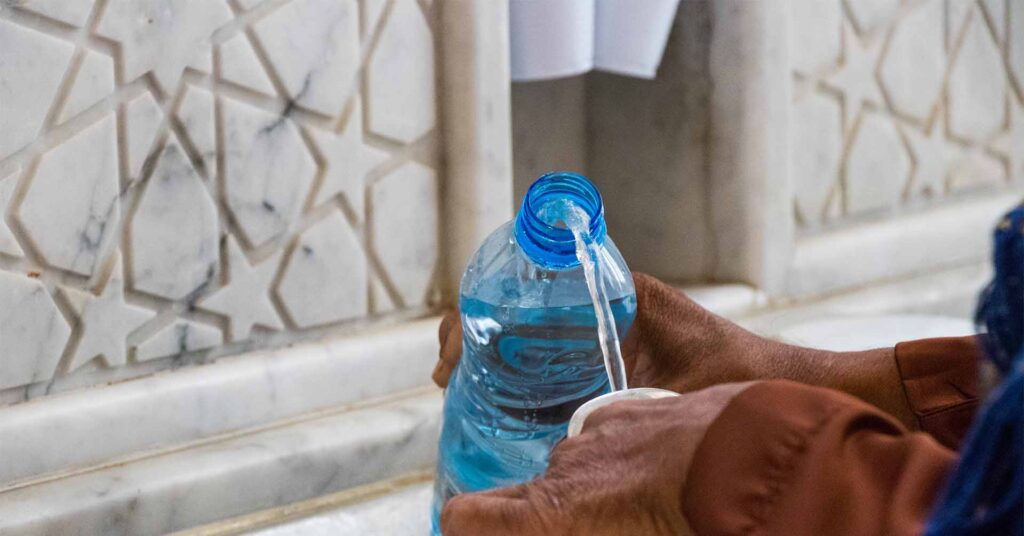
VIRTUES OF THE 8TH OF DHUL HIJJAH
The first day of Hajj is the 8th of Dhul Hijjah and it’s called the Day of Tarwiyah. Tarwiyah means to quench one’s thirst. The Hajj pilgrims used to drink a lot of water, make their animals drink water and carry water for the journey ahead as there was no water in Mina. Of course, we do not have this issue these days and this is something we need to be grateful for.
There may be some other reasons for this day’s name. Those who understand Arabic can refer to this video and this one.
The Day of Tarwiyah is one of the ten days of Dhul Hijjah, which are the best days of the year.
عن جابر قال: قَالَ رَسُولُ اللَّهِ صلى الله عليه وسلم: أفضلُ أيامِ الدنيا أيامُ العشْرِ
Jaabir (radiallahu anhu) said: The Messenger of Allah (sallallahu alaihi wasallam) said: The best days in this (worldly) life are the ten days (i.e. the first ten days of Dhul Hijjah).” [Sahih Al-Jaami, Hadeeth No. 1133]
:عَنِ ابْنِ عَبَّاسٍ، عَنِ النَّبِيِّ صلى الله عليه وسلم أَنَّهُ قَالَ : مَا الْعَمَلُ فِي أَيَّامِ الْعَشْرِ أَفْضَلَ مِنَ الْعَمَلِ فِي هَذِهِ .قَالُوا وَلاَ الْجِهَادُ قَالَ وَلاَ الْجِهَادُ، إِلاَّ رَجُلٌ خَرَجَ يُخَاطِرُ بِنَفْسِهِ وَمَالِهِ فَلَمْ يَرْجِعْ بِشَىْءٍ
Narrated Ibn Abbas (radiallahu anhuma): The Prophet (sallallahu alaihi wasallam) said, “No good deeds done on other days are superior to those done on these (first ten days of Dhul Hijjah).” Then some companions of the Prophet (sallallahu alaihi wasallam) said, “Not even Jihad?” He replied, “Not even Jihad, except that of a man who does it by putting himself and his property in danger (for Allah’s sake) and does not return with any of those things.” [Sahih Al-Bukhari, Volume 2, Hadeeth No. 86]
عن ابن عمر عن النبي صلى الله عليه وسلم قال :ما من أيامٍ أعظَمُ عند الله، ولا أحَبُّ إليه من العملُ فيهنَّ مِن هذه الأيامِ العَشرِ، فأكثِروا فيهنَّ من التهليلِ والتكبيرِ والتحميدِ
Ibn Umar (radiallahu anhuma) that the Prophet (sallallahu alaihi wasallam) said: “There are no days that are greater before Allah or in which good deeds are more beloved to Him, than these ten days, so recite a great deal of tahleel (laa ilaaha illallah), takbeer (Allahu Akbar) and tahmeed (Alhamdulillah) during them.” [Musnad Ahmad, Hadeeth No. 5446. Graded “sahih” (authentic) by Shuaib Al-Arnaut.]
These ten days have also been mentioned in the Quran.
وَلَيَالٍ عَشْرٍ
By the ten nights. [Surah Al-Fajr (89) : 2]
You can read more about the ten days of Dhul Hijjah in this post.
As mentioned in the previous part, fasting on the first nine days of Dhul Hijjah is recommended.
أَنَّ رَسُولَ اللَّهِ صلى الله عليه وسلم كَانَ يَصُومُ تِسْعًا مِنْ ذِي الْحِجَّةِ وَيَوْمَ عَاشُورَاءَ وَثَلاَثَةَ أَيَّامٍ مِنْ كُلِّ شَهْرٍ أَوَّلَ اثْنَيْنِ مِنَ الشَّهْرِ وَخَمِيسَيْنِ
It was narrated from Hunaidah bin Khalid, from his wife, from one of the wives of the Prophet, that the Messenger of Allah (sallallahu alaihi wasallam) used to fast nine days of Dhul-Hijjah, the day of Ashura, and three days of each month: The first Monday of the month, and two Thursday. [Sunan An-Nasai, Hadeeth No. 2419. Graded “sahih” by Al-Albani.]
As for whether the person doing Hajj should fast on the 8th of Dhul Hijjah or not, it would be better for each person to look at their own situation and ability and to ask a person of knowledge for advice.
As for the 9th day, fasting on it is NOT sunnah for the pilgrims as will be discussed later on in this post, in shaa Allah.
HEADING FOR MINA
The previous section showed us that the 8th of Dhul Hijjah is a special day. However, it is also the first day of Hajj, so what acts are to be performed therein? Well, the Day of Tarwiyah simply involves assuming ihram and then heading to Mina for the day. There is no stoning involved on this day. Also, going to Mina on this day is voluntary and not obligatory.
It states in the Hadeeth of Jaabir (radiallahu anhu):
فَلَمَّا كَانَ يَوْمُ التَّرْوِيَةِ تَوَجَّهُوا إِلَى مِنًى. فَأَهَلُّوا بِالْحَجِّ يَوْمَ التَّرْوِيَةِ. وَرَكِبَ رَسُولُ اللّهِ فَصَلَّى بِهَا الظُّهْرَ وَالْعَصْرَ وَالْمَغْرِبَ وَالْعِشَاءَ وَالْفَجْرَ. ثُمَّ مَكَثَ قَلِيلاً حَتَّى طَلَعَتِ الشَّمْسُ. وَأَمَرَ بِقُبَّةٍ مِنْ شَعَرٍ تُضْرَبُ لَهُ بِنَمِرَةَ. فَسَارَ رَسُولُ اللّهِ وَلاَ تَشُكُّ قُرَيْشٌ إِلاَّ أَنَّهُ وَاقِفٌ عِنْدَ الْمَشْعَرِ الْحَرَامِ.كَمَا كَانَتْ قُرَيْشٌ تَصْنَعُ فِي الْجَاهِلِيَّةِ. فَأَجَازَ رَسُولُ اللّهِ حَتَّى أَتَى عَرَفَةَ. فَوَجَدَ القُبَّةَ قَدْ ضُرِبَتْ لَهُ بِنَمِرَةَ
When it was the day of Tarwiyah (8th of Dhul Hijjah) they went to Mina and put on the ihram for Hajj and the Messenger of Allah (sallahu alaihi wasallam) rode and led the Dhuhr, Asr, Maghrib, Isha and Fajr prayers. He then waited a little until the sun rose, and commanded that a tent of hair should be pitched at Namirah. The Messenger of Allah (sallahu alaihi wasallam) then set out and the Quraish did not doubt that he would halt at al-Mashar al-Haram (the sacred site) as the Quraish used to do in the pre-Islamic period. The Messenger of Allah (sallahu alaihi wasallam), however, passed on until he came to Arafah and he found that the tent had been pitched for him at Namirah. [Sahih Muslim, Hadeeth No. 2803]
Remember that you will be staying in Mina on the 8th of Dhul Hijjah and then going to Arafah and Muzdalifah on the 9th then returning to Mina on the 10th then going to Makkah then returning to Mina on the 10th itself and staying there for 11th-13th Dhul Hijjah before leaving.
You might want to pack two bags, one for the 8th and 9th and the second one for the 10th to 13th, so that you will not have to worry about packing on the 10th or worry about washing your clothes until the 13th. Or you might prefer packing for all 6 days at once. That will be fine but if you are required to walk for long (which is quite possible), a big bag would be a hassle. A small trolley bag would be ideal though.
Try to pack only what you need and not more than that. Remember: Hajj is not a vacation, rather it is an act of worship. Also, try to pack on the 7th night rather than on the 8th so that your mind is not distracted.
Food at Mina does not arrive on time for everyone it seems, and Arafah and Muzdalifah might not have stores around. So one would do well to pack snacks and drinks, just in case. Once you’ve done your packing, you’re all set to go! Here are the steps you need to follow on the 8th:
1.Assume Ihram for Hajj
This is for those who are doing Hajj At-Tamattu because those doing Hajj Al-Qiran are still in ihram. Remember, the mawaqeet are the same for both Umrah and Hajj.
عنِ ابنِ عباسٍ قال إنَّ النبيَّ صلى الله عليه وسلّم وَقَّتَ لأهلِ المدينةِ ذا الحُلَيفةِ، ولأهلِ الشأْمِ الجُحفَة، ولأهلِ نجدٍ قرْنَ المنازِلِ، ولأهل اليمنِ يَلَمْلَمَ، هنَّ لهنَّ ولمن أتى عليهنَّ مِن غيرِهنَّ ممن أرادَ الحجَّ والعُمرةَ، ومَن كانَ دُونَ ذلكَ فمن حيثُ أنشأَ، حتى أهلُ مكةَ مِن مكةَ
Narrated Ibn Abbas (radiallahu anhuma): Allah’s Messenger (sallallahu alaihi wasallam) made Dhul Hulaifah the Meeqat for the people of Madinah; Al-Juhfah for the people of Sham; Qarn Al-Manazil for the people of Najd; and Yalamlam for the people of Yemen; and these Mawaqeet are for the people at those very places, and besides them for those who come thorough those places with the intention of performing Hajj and Umrah; and whoever is living within these boundaries can assume lhram from the place he starts, and the people of Makkah can assume Ihram from Makkah. [Sahih Al-Bukhari, Volume 2, Hadeeth No. 599]
However, if you are in Makkah on the 8th of Dhul Hijjah, you need to enter ihram from Makkah itself. Unlike in Umrah, there is no need to leave Makkah and go to the Meeqat.
عن أَبي شِهَابٍ، قَالَ قَدِمْتُ مُتَمَتِّعًا مَكَّةَ بِعُمْرَةٍ فَدَخَلْنَا قَبْلَ التَّرْوِيَةِ بِثَلاَثَةِ أَيَّامٍ، فَقَالَ لِي أُنَاسٌ مِنْ أَهْلِ مَكَّةَ تَصِيرُ الآنَ حَجَّتُكَ مَكِّيَّةً. فَدَخَلْتُ عَلَى عَطَاءٍ أَسْتَفْتِيهِ فَقَالَ حَدَّثَنِي جَابِرُ بْنُ عَبْدِ اللَّهِ ـ رضى الله عنهما ـ أَنَّهُ حَجَّ مَعَ النَّبِيِّ صلى الله عليه وسلم يَوْمَ سَاقَ الْبُدْنَ مَعَهُ، وَقَدْ أَهَلُّوا بِالْحَجِّ مُفْرَدًا، فَقَالَ لَهُمْ : أَحِلُّوا مِنْ إِحْرَامِكُمْ بِطَوَافِ الْبَيْتِ وَبَيْنَ الصَّفَا وَالْمَرْوَةِ، وَقَصِّرُوا ثُمَّ أَقِيمُوا :حَلاَلاً، حَتَّى إِذَا كَانَ يَوْمُ التَّرْوِيَةِ فَأَهِلُّوا بِالْحَجِّ، وَاجْعَلُوا الَّتِي قَدِمْتُمْ بِهَا مُتْعَةً . فَقَالُوا كَيْفَ نَجْعَلُهَا مُتْعَةً وَقَدْ سَمَّيْنَا الْحَجَّ فَقَالَ افْعَلُوا مَا أَمَرْتُكُمْ، فَلَوْلاَ أَنِّي سُقْتُ الْهَدْىَ لَفَعَلْتُ مِثْلَ الَّذِي أَمَرْتُكُمْ، وَلَكِنْ لاَ يَحِلُّ مِنِّي حَرَامٌ حَتَّى يَبْلُغَ الْهَدْىُ مَحِلَّهُ. فَفَعَلُوا
Narrated Abu Shihab: I left for Makkah for Hajj-at-Tamattu assuming Ihram for Umrah. I reached Makkah three days before the day of Tarwiyah (8th Dhul-Hijjah). Some people of Makkah said to me, “Your Hajj will be like the Hajj performed by the people of Makkah (i.e. you will lose the superiority of assuming Ihram from the Meeqat). So I went to Ataa asking him his view about it. He said, “Jabir bin Abdullah narrated to me, ‘I performed Hajj with Allah’s Messenger (sallallahu alaihi wasallam) on the day when he drove camels with him. The people had assumed Ihram for Hajj-al-Ifrad. The Prophet (sallallahu alaihi wasallam) ordered them to finish their Ihram after Tawaf round the Kabah, and between Safa and Marwa and to cut short their hair and then to stay there (in Makkah) as non-Muhrims till the day of Tarwiyah (i.e. 8th of Dhul-Hijjah) when they would assume Ihram for Hajj and they were ordered to make the Ihram with which they had come as for Umrah only. They asked, ‘How can we make it Umrah (Tamattu) as we have intended to perform Hajj?’ The Prophet (sallallahu alaihi wasallam) said, ‘Do what I have ordered you. Had I not brought the Hadi (sacrificial animal) with me, I would have done the same, but I cannot finish my Ihram till the Hadi reaches its destination (i.e. is slaughtered).’ So, they did (what he ordered them to do).” [Sahih Al-Bukhari, Volume 2, Hadeeth No. 639]
It is sunnah to assume ihram before noon.
The Prophet (sallallahu alaihi wasallam) stopped at a place called “Al-Abtah” which is a wide valley that is part of Makkah. This is where his companions assumed ihram. The Prophet (sallallahu alaihi wasallam) was doing Hajj Al-Qiran so he was already in ihram.
عَنْ جَابِرِ بْنِ عَبْدِ اللَّهِ، – رضى الله عنهما – قَالَ أَمَرَنَا النَّبِيُّ صلى الله عليه وسلم لَمَّا أَحْلَلْنَا أَنْ نُحْرِمَ إِذَا تَوَجَّهْنَا إِلَى مِنًى . قَالَ فَأَهْلَلْنَا مِنَ الأَبْطَحِ
Jabir bin Abdullah (radiallahu anhu) reported that the Messenger of Allah (sallallahu alaihi wasallam) ordered us to put on Ihram (again) as we proceeded towards Mina after we had put it off (i.e. on the 8th of Dhul Hijjah). So we pronounced Talbiyah at al-Abtah. [Sahih Muslim, Hadeeth No. 2795]
The three rightly guided caliphs after him also did the same.
عَنِ ابْنِ عُمَرَ، قَالَ كَانَ النَّبِيُّ صلى الله عليه وسلم وَأَبُو بَكْرٍ وَعُمَرُ وَعُثْمَانُ يَنْزِلُونَ الأَبْطَحَ .
However, the stopover at Al-Abtah was simply for convenience. It is not the sunnah so one can assume ihram from somewhere else in Makkah as well.
عَنْ عَائِشَةَ، قَالَتْ نُزُولُ الأَبْطَحِ لَيْسَ بِسُنَّةٍ إِنَّمَا نَزَلَهُ رَسُولُ اللَّهِ صلى الله عليه وسلم لأَنَّهُ كَانَ أَسْمَحَ لِخُرُوجِهِ إِذَا خَرَجَ
Aishah (radiallahu anha) reported: Halt at al-Abtah is not the Sunnah. Allah’s Messenger (sallallahu alaihi wasallam) halted there simply because it was easier for him to depart from there, when he left. [Sahih Muslim, Hadeeth No. 3008]
عَنِ ابْنِ عَبَّاسٍ، قَالَ لَيْسَ التَّحْصِيبُ بِشَيْءٍ إِنَّمَا هُوَ مَنْزِلٌ نَزَلَهُ رَسُولُ اللَّهِ صلى الله عليه وسلم . قَالَ أَبُو عِيسَى التَّحْصِيبُ نُزُولُ الأَبْطَحِ
Please refer to Part 5 of this series for a detailed look at ihram. Please follow the steps outlined there (including taking a bath, cutting one’s nails, etc.) except for the Talbiyah for Umrah. When assuming ihram for Hajj, the one doing Hajj At-Tamattu needs to say:
لَبَّيْكَ حَجًّا
Labbaik Hajjan (Here I am, for Hajj)
Now, you are in ihram. Please remember all the acts that you are not permitted to do. Also, remember to be well-mannered and patient.
2. Recite the Talbiyah
Remember to keep reciting the talbiyah (discussed in Part 5) until one starts to stone the Jamaratul Aqabah on the 10th of Dhul Hijjah.
عَنِ ابْنِ عَبَّاسٍ ـ رضى الله عنهما ـ أَنَّ أُسَامَةَ ـ رضى الله عنه ـ كَانَ رِدْفَ النَّبِيِّ صلى الله عليه وسلم مِنْ عَرَفَةَ إِلَى الْمُزْدَلِفَةِ، ثُمَّ أَرْدَفَ الْفَضْلَ مِنَ الْمُزْدَلِفَةِ إِلَى مِنًى. قَالَ فَكِلاَهُمَا قَالَ لَمْ يَزَلِ النَّبِيُّ صلى الله عليه وسلم يُلَبِّي، حَتَّى رَمَى جَمْرَةَ الْعَقَبَةِ
Narrated Ubaidullah ibn Abdullah: Ibn Abbas (radiallahu anhuma) said, “Usama rode behind Allah’s Messenger (sallallahu alaihi wasallam) from Arafah to Al-Muzdalifah; and then Al-Fadl rode behind Allah’s Messenger (sallallahu alaihi wasallam) from Al-Muzdalifah to Mina.” Ibn Abbas added, “Both of them said, ‘The Prophet (sallallahu alaihi wasallam) kept on reciting talbiyah till he did the rami (stoning) of Jamrat Al-Aqabah.’” [Sahih Al-Bukhari, Volume 2, Hadeeth No. 616]
3. Set out for Mina
One should try to be in Mina by Dhuhr time so that one can pray Dhuhr there.
There are multiple ways to get to Mina: bus, Hajj metro, walking, etc. This would depend on your Hajj operator. They used to go on camels and buses in the past.
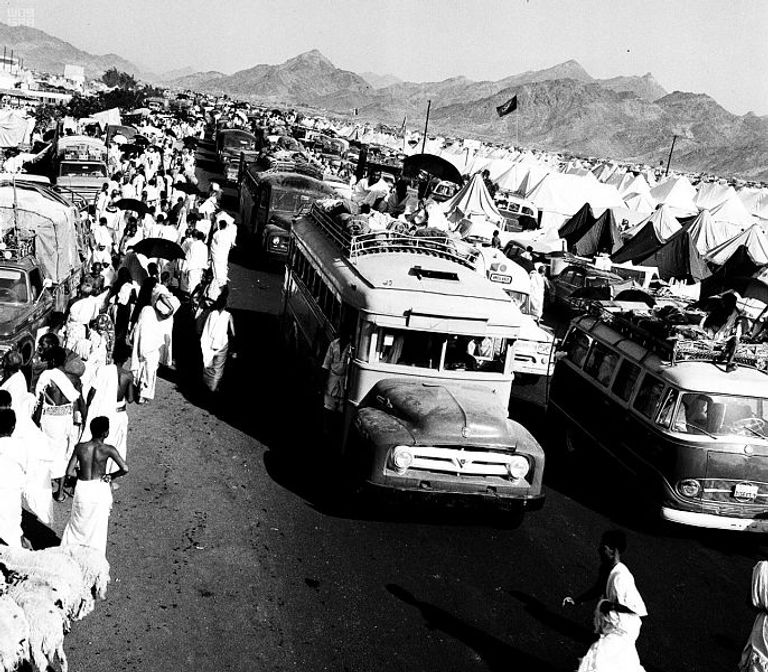
Now, they have better buses.
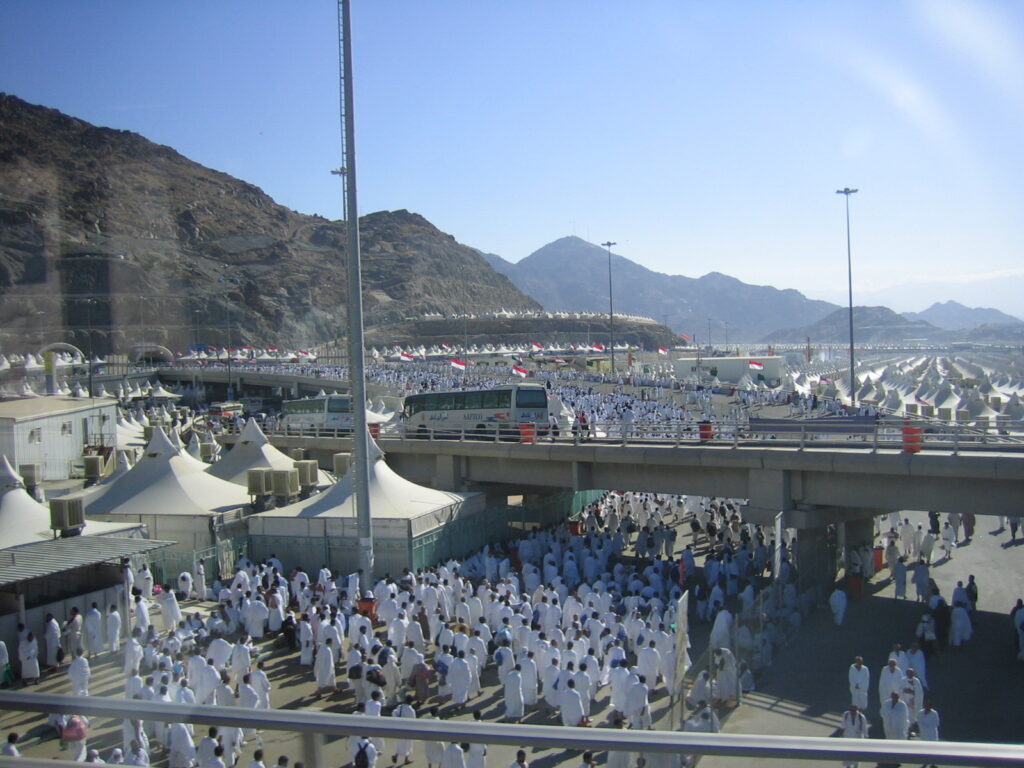
And of course, the Metro looks even better.

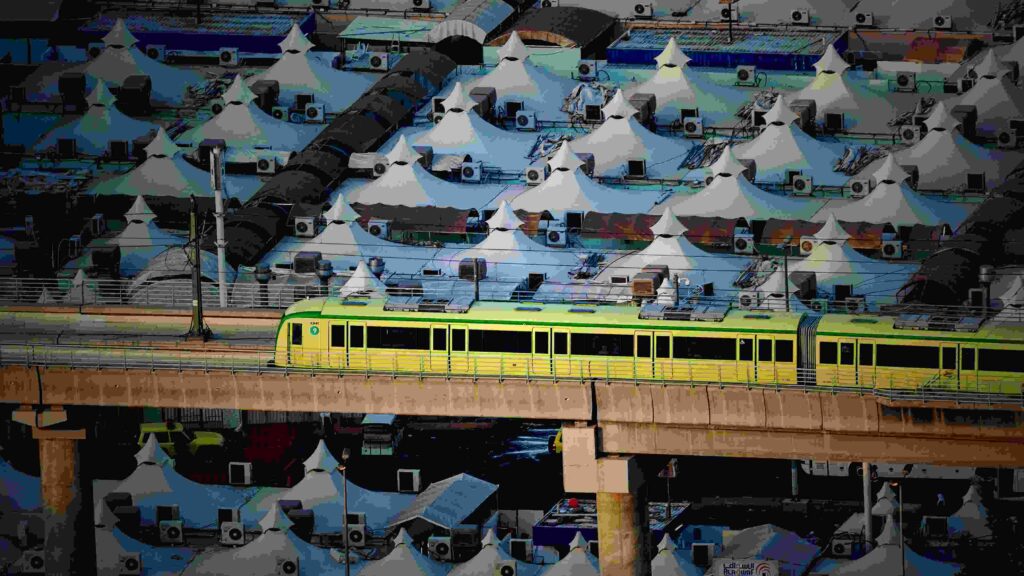
If you are going by bus, and there is a huge amount of traffic, you might be required to walk. Don’t get depressed. Just get down, keep walking and keep your tongue moist with the remembrance of Allah and keep reciting the talbiyah (softly if you are a woman and loudly if you are a man).
This is what Mina looked like in the past:
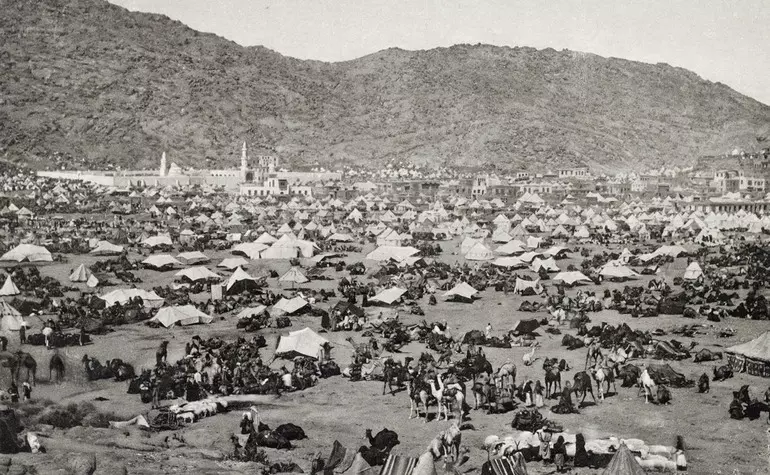
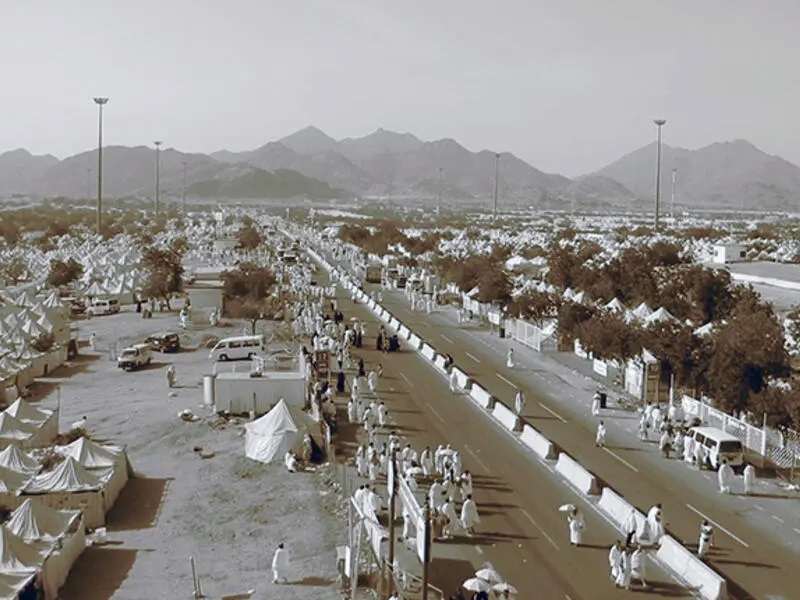
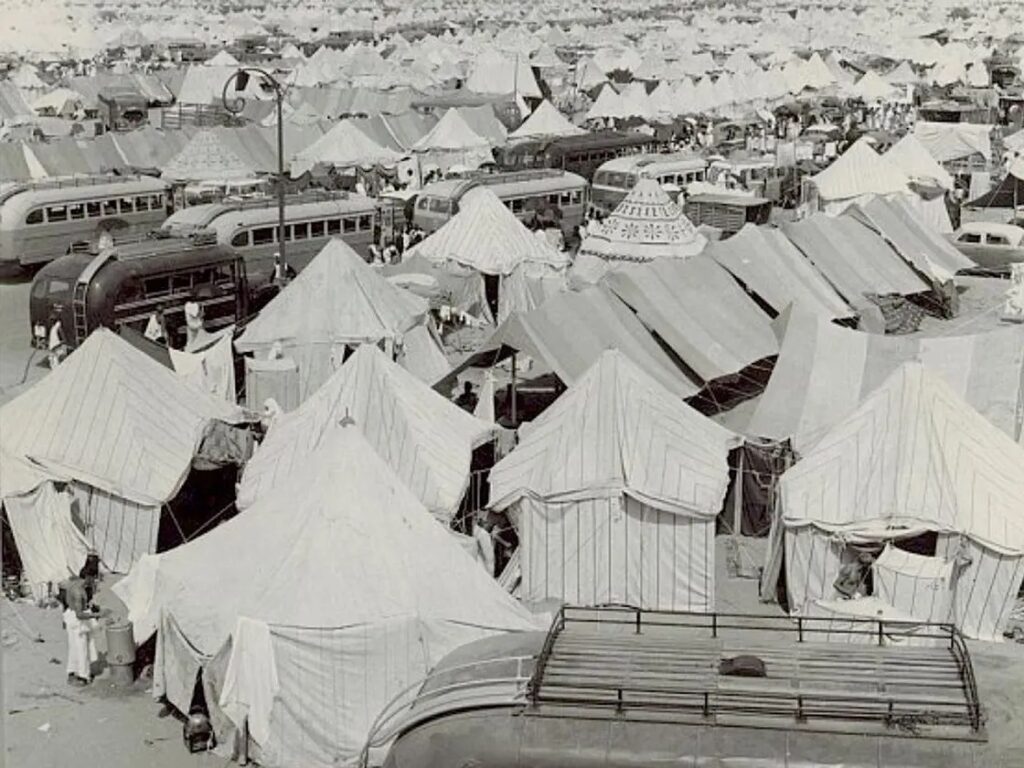
This is what it looks like in recent times:
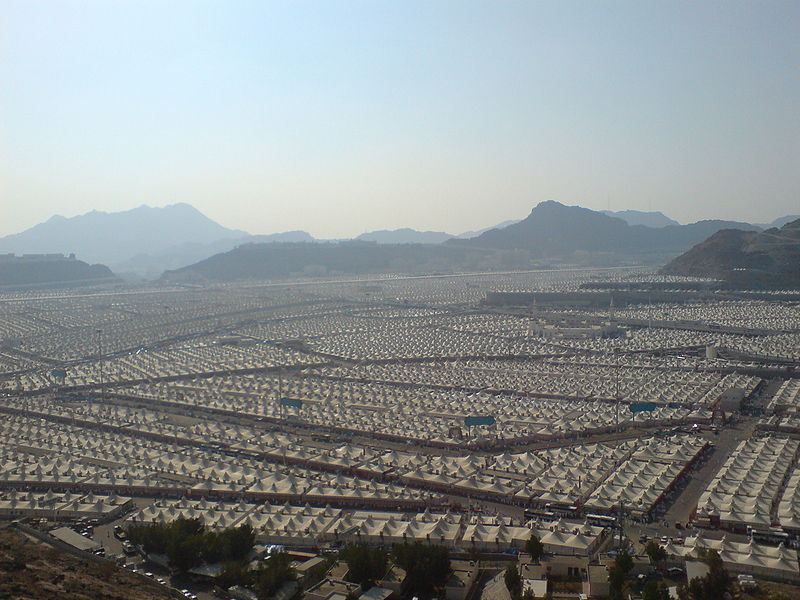
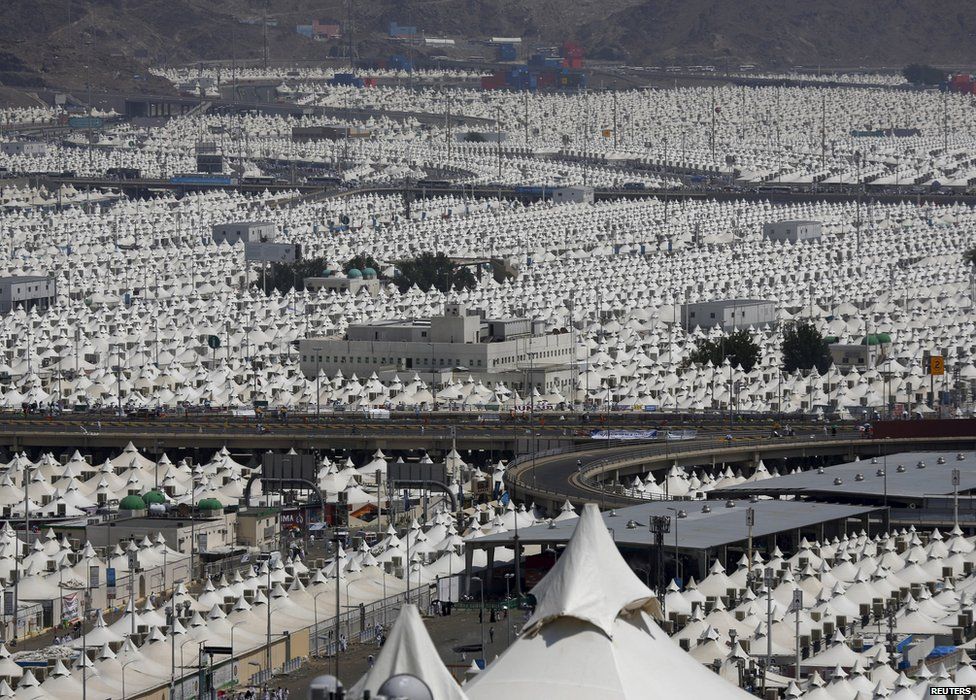
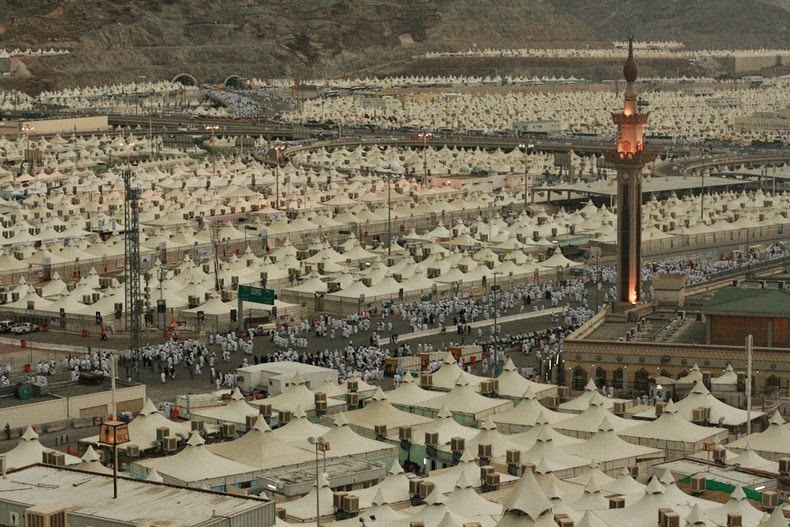
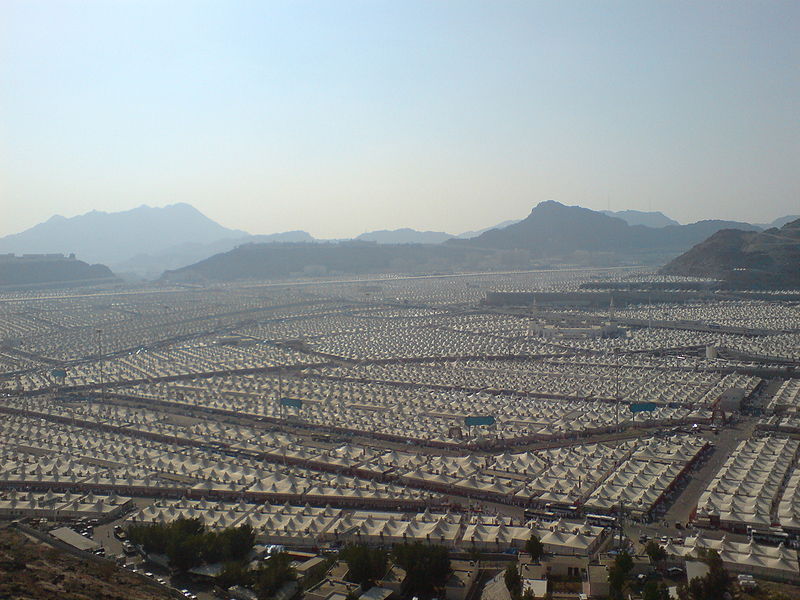
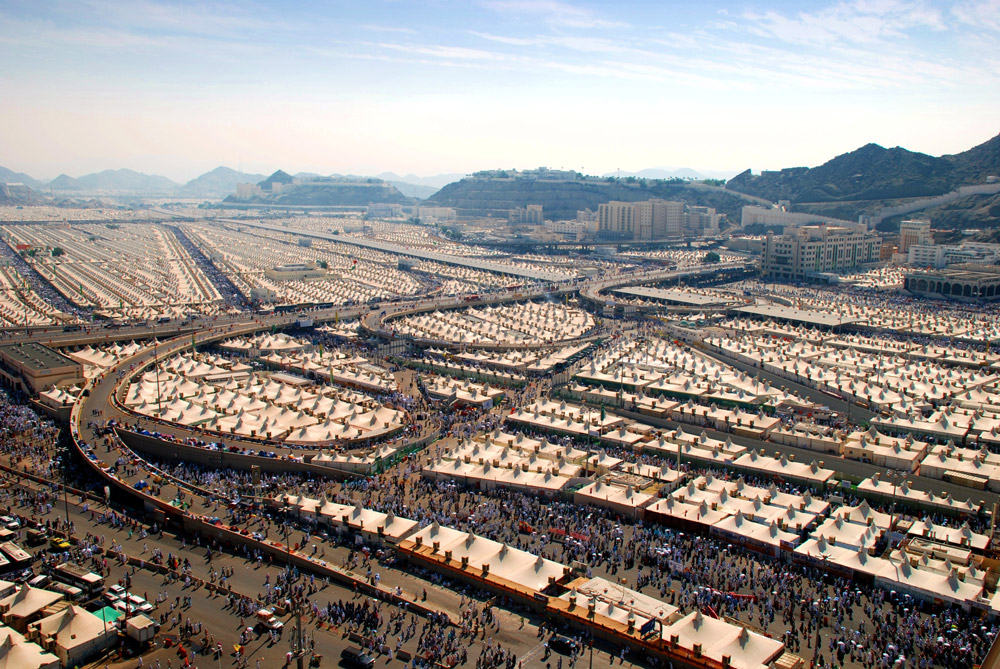
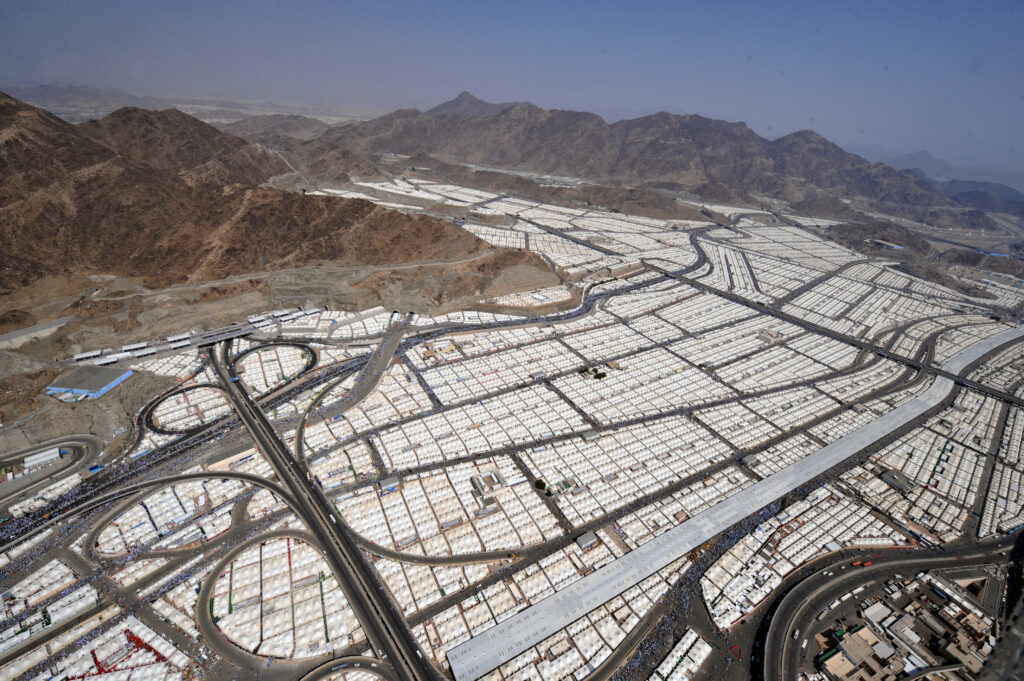
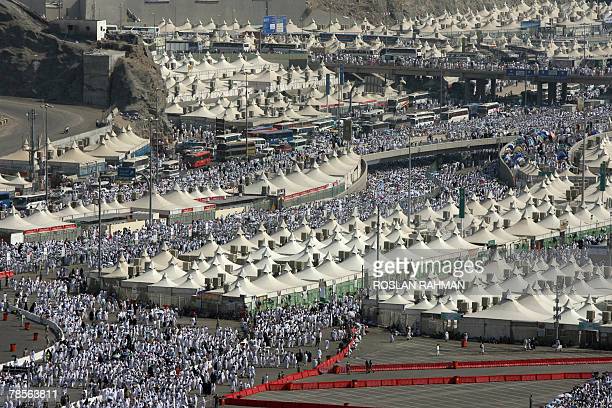
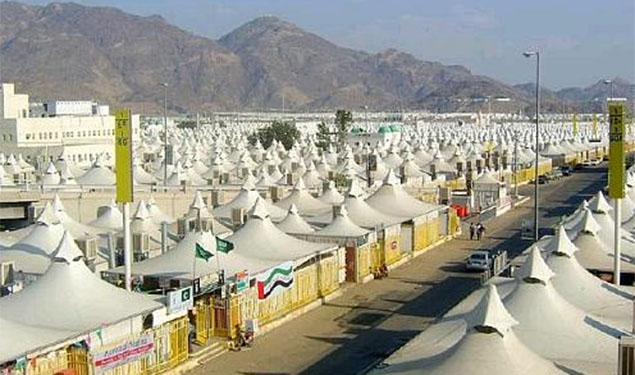
Apparently, there might be two storey tents available:
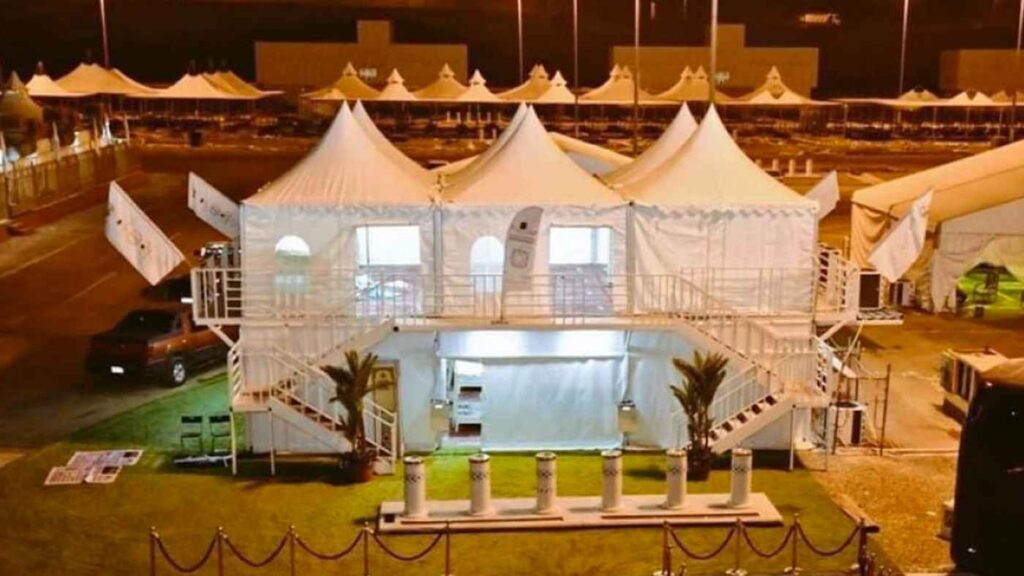
Here’s a peek inside a simple tent. The first one shows people praying.
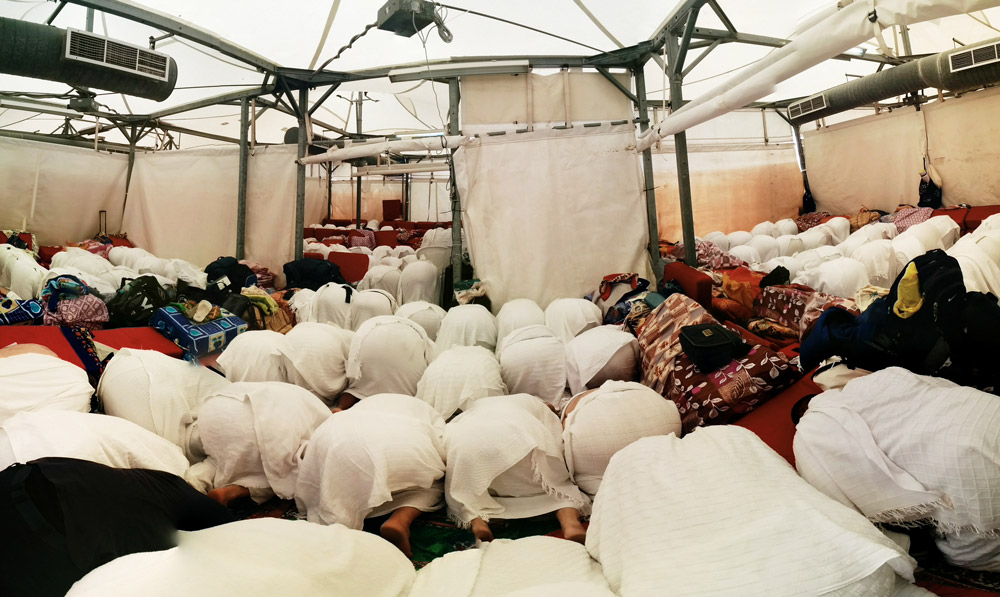
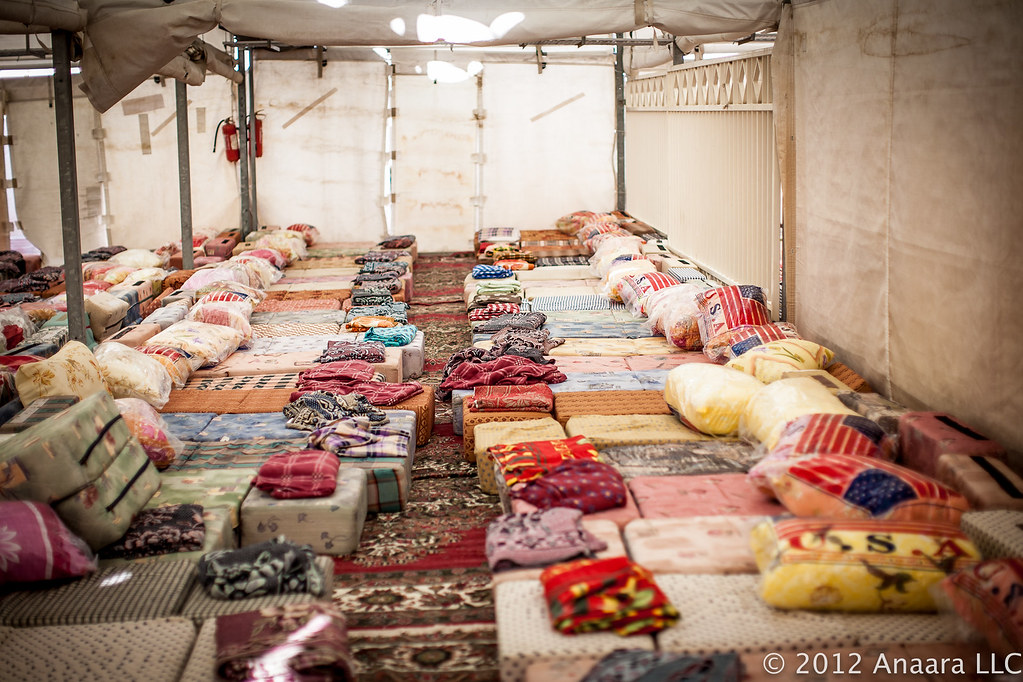
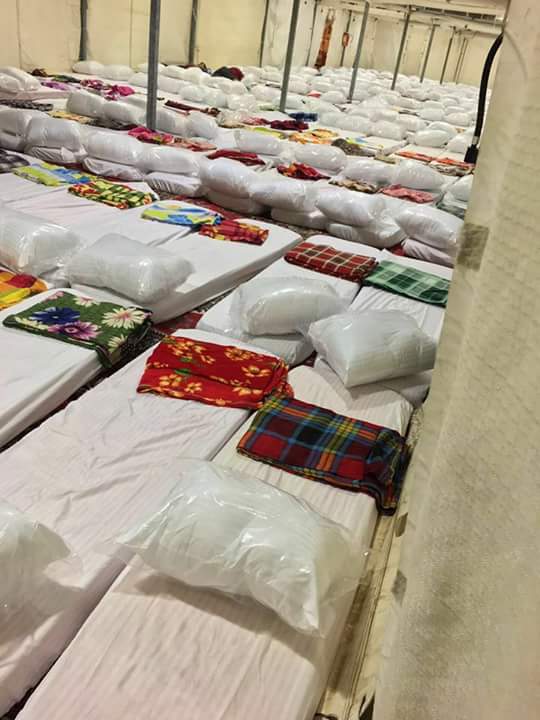
Apparently, bunk beds were also being tested. I’m not sure if they still have them:
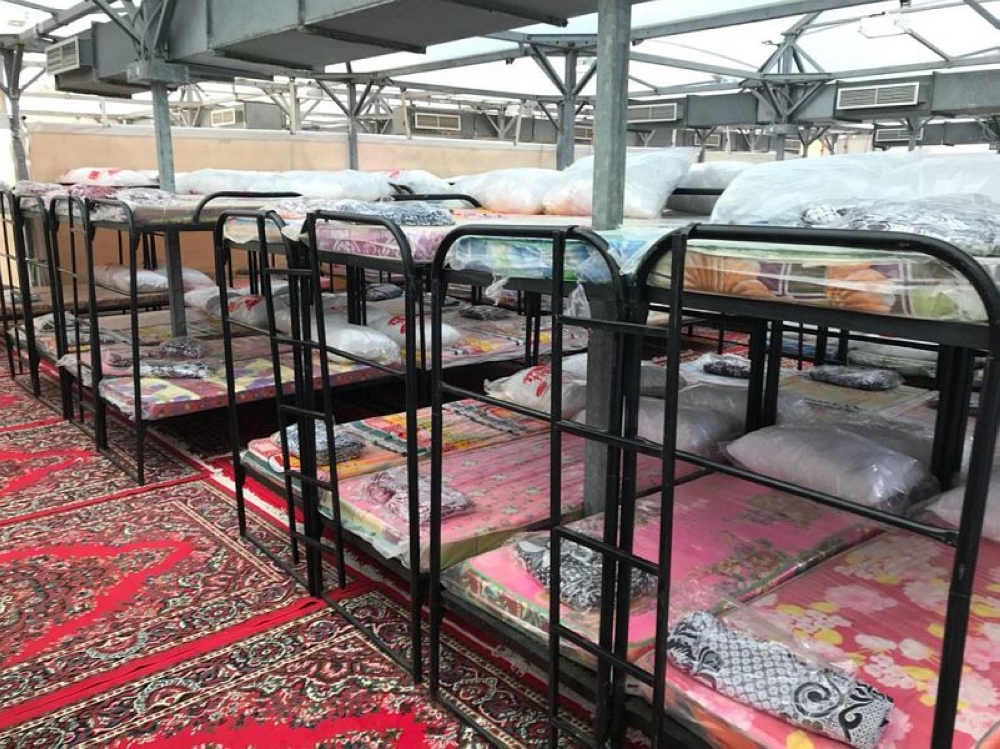
Hajj 2022 (last year) saw tents with fewer occupants, presumably because of Covid:
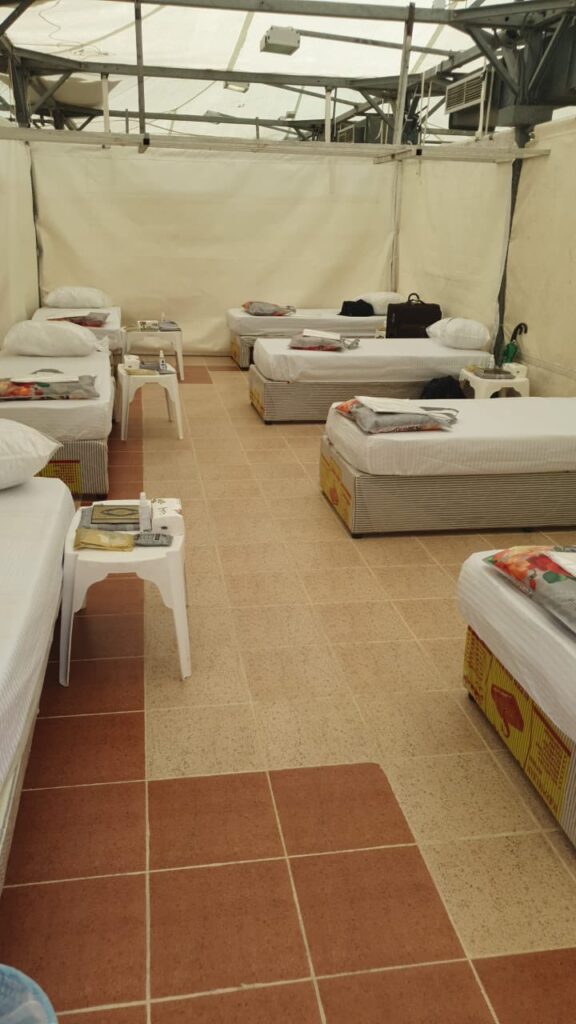
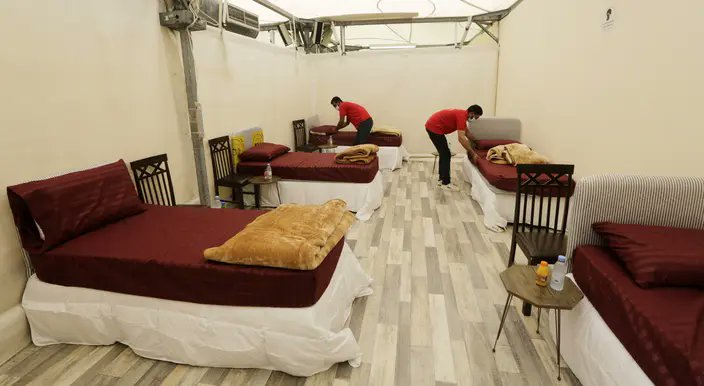
Try not to wander around alone because Mina is a huge maze and it is easy to get lost there. Please follow all the rules and make sure you know the address of your tent and have the mobile number of the person in charge.
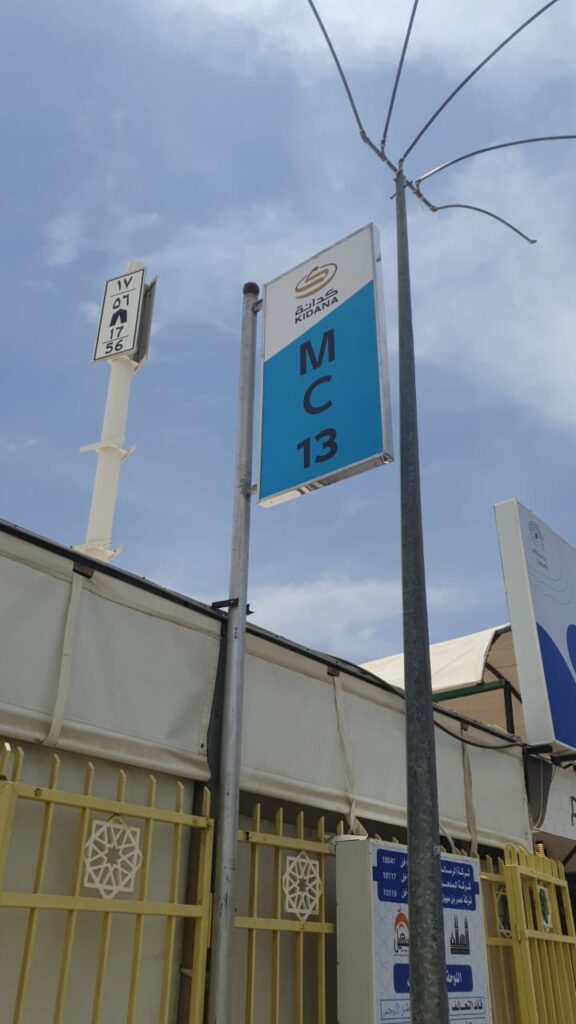
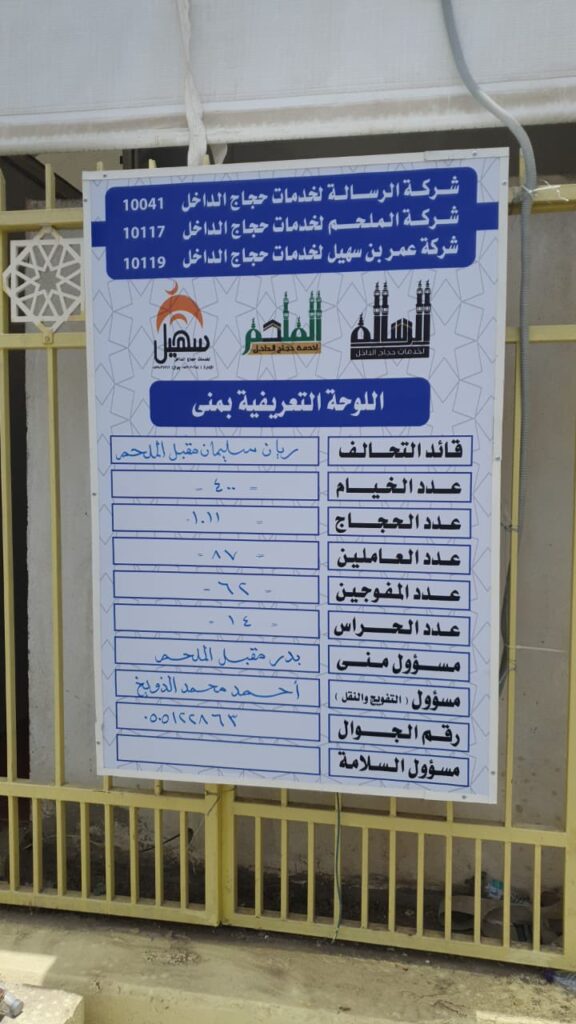
Please remember that Mina is part of the Haram area therefore the rules of the Haram apply to it.
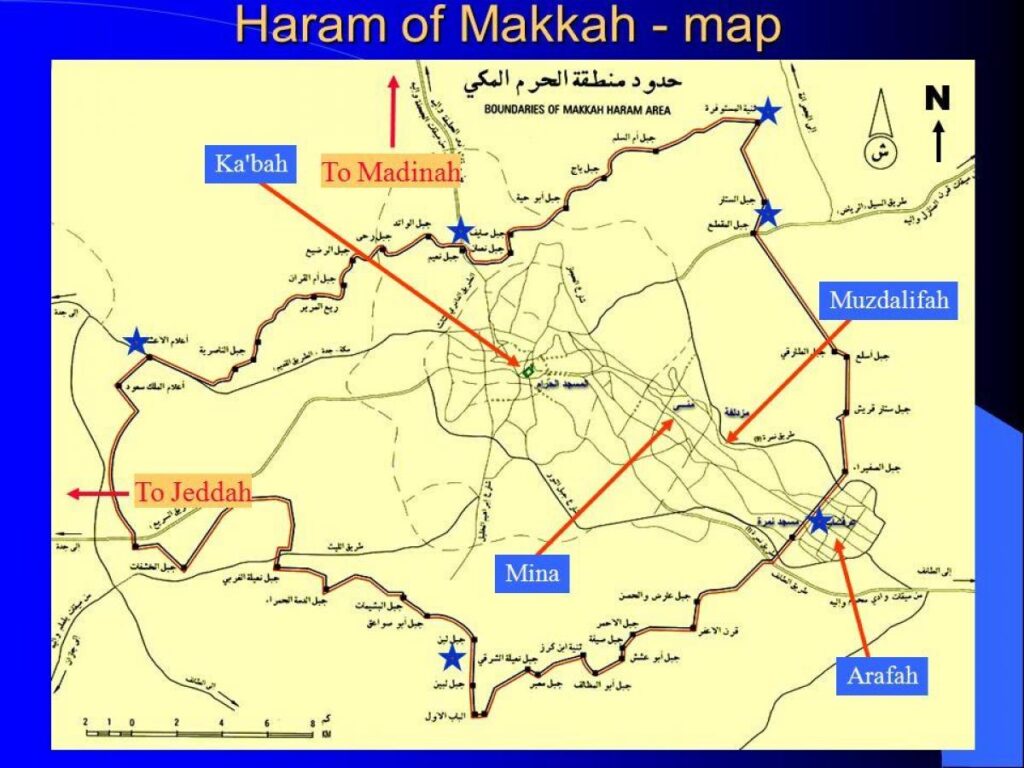
4. Pray 5 prayers at Mina and shorten them
It states in the Hadeeth of Jaabir (radiallahu anhu):
فَلَمَّا كَانَ يَوْمُ التَّرْوِيَةِ تَوَجَّهُوا إِلَى مِنًى. فَأَهَلُّوا بِالْحَجِّ يَوْمَ التَّرْوِيَةِ. وَرَكِبَ رَسُولُ اللّهِ فَصَلَّى بِهَا الظُّهْرَ وَالْعَصْرَ وَالْمَغْرِبَ وَالْعِشَاءَ وَالْفَجْرَ. ثُمَّ مَكَثَ قَلِيلاً حَتَّى طَلَعَتِ الشَّمْسُ
When it was the day of Tarwiyah (8th of Dhul Hijjah) they went to Mina and put on the ihram for Hajj and the Messenger of Allah (sallahu alaihi wasallam) rode and led the Dhuhr, Asr, Maghrib, Isha and Fajr prayers. He then waited a little until the sun rose, and commanded that a tent of hair should be pitched at Namirah. [Sahih Muslim, Hadeeth No. 2803]
So, 5 prayers are meant to be prayed in Mina: from Dhuhr on the 8th until Fajr on the 9th. The 4 rakahs are meant to be shortened to 2 rakahs, even if one is a resident of Mina or its surrounding areas.
عَنْ أَنَسِ بْنِ مَالِكٍ، قَالَ خَرَجْنَا مَعَ رَسُولِ اللَّهِ صلى الله عليه وسلم مِنَ الْمَدِينَةِ إِلَى مَكَّةَ فَصَلَّى رَكْعَتَيْنِ رَكْعَتَيْنِ حَتَّى رَجَعَ . قُلْتُ كَمْ أَقَامَ بِمَكَّةَ قَالَ عَشْرًا
Anas bin Malik (radiallahu anhu) reported: We went out from Madinah to Makkah with the Messenger of Allah (sallallahu alaihi wasallam) and he prayed two rakahs at each time of prayer till we returned to Madinah. I said: For how long did he stay in Makkah? He said: (For) ten (days). [Sahih Muslim, Hadeeth No. 1473]
عن حَارِثَة بْنُ وَهْبٍ الْخُزَاعِيُّ، – وَكَانَتْ أُمُّهُ تَحْتَ عُمَرَ فَوَلَدَتْ لَهُ عُبَيْدَ اللَّهِ بْنَ عُمَرَ – قَالَ صَلَّيْتُ خَلْفَ رَسُولِ اللَّهِ صلى الله عليه وسلم بِمِنًى وَالنَّاسُ أَكْثَرُ مَا كَانُوا فَصَلَّى بِنَا رَكْعَتَيْنِ فِي حَجَّةِ الْوَدَاعِ . قَالَ أَبُو دَاوُدَ حَارِثَةُ مِنْ خُزَاعَةَ وَدَارُهُمْ بِمَكَّةَ
Narrated Harithah ibn Wahb al-Khuzai (radiallahu anhu), whose mother was a wife of Umar’s (radiallahu anhu) and who gave birth to Ubaidullah bin Umar: I prayed along with the Messenger of Allah (sallallahu alaihi wasallam) at Mina and the people (congregated) behind were the most that ever did so. He led us in two rakahs during the Farewell Pilgrimage.
Abu Dawud said: Harithah belonged to the tribe of Khuzaah, and they had their houses in Makkah. [Sunan Abee Dawood, Hadeeth No. 1965. Graded “sahih” (authentic) by Al-Albani.]
The 2 rakahs of Fajr and 3 rakahs of Maghrib are not to be shortened obviously.
Please note that one is only meant to shorten the prayers, not combine them. Combining means praying Dhuhr and Asr at the same time and praying Maghrib and Isha at the same time.
In general, travellers can both shorten and combine their prayers as can the pilgrims on the 9th of Dhul Hijjah. Those in Mina during the days of Hajj simply shorten without combining. Those who are ill can combine prayers but not shorten them. So shortening prayers and combining them are two different things.
The masjid in Mina is called Masjid Al-Khaif. The Prophet (sallallahu alaihi wasallam) prayed there.
عن جَابِر بْن يَزِيدَ بْنِ الأَسْوَدِ الْعَامِرِيُّ، عَنْ أَبِيهِ، قَالَ شَهِدْتُ مَعَ النَّبِيِّ صلى الله عليه وسلم حَجَّتَهُ فَصَلَّيْتُ مَعَهُ صَلاَةَ الصُّبْحِ فِي مَسْجِدِ الْخَيْفِ . قَالَ فَلَمَّا قَضَى صَلاَتَهُ وَانْحَرَفَ إِذَا هُوَ بِرَجُلَيْنِ فِي أُخْرَى الْقَوْمِ لَمْ يُصَلِّيَا مَعَهُ فَقَالَ : عَلَىَّ بِهِمَا. فَجِيءَ بِهِمَا تُرْعَدُ فَرَائِصُهُمَا فَقَالَ : مَا مَنَعَكُمَا أَنْ تُصَلِّيَا مَعَنَا . فَقَالاَ يَا رَسُولَ اللَّهِ إِنَّا كُنَّا قَدْ صَلَّيْنَا فِي رِحَالِنَا . قَالَ: فَلاَ تَفْعَلاَ إِذَا صَلَّيْتُمَا فِي رِحَالِكُمَا ثُمَّ أَتَيْتُمَا مَسْجِدَ جَمَاعَةٍ فَصَلِّيَا مَعَهُمْ فَإِنَّهَا لَكُمَا نَافِلَةٌ
He also camped around the masjid and gave sermons there in the ensuing days of Hajj.
، عَنْ عَبْدِ الرَّحْمَنِ بْنِ مُعَاذٍ التَّيْمِيِّ، قَالَ خَطَبَنَا رَسُولُ اللَّهِ صلى الله عليه وسلم وَنَحْنُ بِمِنًى فَفُتِحَتْ أَسْمَاعُنَا حَتَّى كُنَّا نَسْمَعُ مَا يَقُولُ وَنَحْنُ فِي مَنَازِلِنَا فَطَفِقَ يُعَلِّمُهُمْ مَنَاسِكَهُمْ حَتَّى بَلَغَ الْجِمَارَ فَوَضَعَ أُصْبُعَيْهِ السَّبَّابَتَيْنِ فِي أُذُنَيْهِ ثُمَّ قَالَ : بِحَصَى الْخَذْفِ . ثُمَّ أَمَرَ الْمُهَاجِرِينَ فَنَزَلُوا فِي مُقَدَّمِ الْمَسْجِدِ وَأَمَرَ الأَنْصَارَ فَنَزَلُوا مِنْ وَرَاءِ الْمَسْجِدِ ثُمَّ نَزَلَ النَّاسُ بَعْدَ ذَلِكَ
Narrated Abdur Rahman ibn Muadh at-Taymi (radiallahu anhu) : The Messenger of Allah (sallallahu alaihi wasallam) addressed us when we were at Mina. Our ears were open and we were listening to what he was saying, while we were in our dwellings. He began to teach them the rites of Hajj till he reached the injunction of throwing pebbles at the Jamrahs (pillars at Mina). He put his forefingers in his ears and said: (Throw) small pebbles. He then commanded the Emigrants (Muhajirun) to station themselves. They stationed themselves before the mosque. He then commanded the Helpers (Ansar) to encamp. They encamped behind the mosque. Thereafter the people encamped. [Sunan Abee Dawood, Hadeeth No. 1957. Graded “sahih” (authentic) by Al-Albani.]
عَنْ مُحَمَّدِ بْنِ جُبَيْرِ بْنِ مُطْعِمٍ، عَنْ أَبِيهِ، قَالَ قَامَ رَسُولُ اللَّهِ ـ صلى الله عليه وسلم ـ بِالْخَيْفِ مِنْ مِنًى فَقَالَ : نَضَّرَ اللَّهُ امْرَأً سَمِعَ مَقَالَتِي فَبَلَّغَهَا فَرُبَّ حَامِلِ فِقْهٍ غَيْرُ فَقِيهٍ وَرُبَّ حَامِلِ فِقْهٍ إِلَى مَنْ هُوَ أَفْقَهُ مِنْهُ ثَلاَثٌ لاَ يُغِلُّ عَلَيْهِنَّ قَلْبُ مُؤْمِنٍ إِخْلاَصُ الْعَمَلِ لِلَّهِ وَالنَّصِيحَةُ لِوُلاَةِ الْمُسْلِمِينَ وَلُزُومُ جَمَاعَتِهِمْ فَإِنَّ دَعْوَتَهُمْ تُحِيطُ مِنْ وَرَائِهِمْ
It was narrated from Muhammad bin Jubair bin Mutim that his father said: “The Messenger of Allah (sallallahu alaihi wasallam) stood up in Khaif in Mina, and said: ‘May Allah make his face shine, the man who hears my words and conveys them. It may be that the bearer of knowledge does not understand it, and it may be that he takes it to one who will understand it more than he does. There are three things in which the heart of the believer does not betray: sincerity of action for the sake of Allah, offering sincere advice to the rulers of the Muslims, and adhering to the Jamaah (main body of the Muslims). Their supplication is answered (i.e. encompassing every good, and all of the people).” [Sunan Ibn Majah, Hadeeth No. 3056. Graded “sahih” (authentic) by Al-Albani.]
It wasn’t just the Prophet (sallallahu alaihi wasallam) who prayed in Masjid Al-Khaif. 70 Prophets before him did too!
عَنِ ابْنِ عَبَّاسٍ ، قَالَ: قَالَ رَسُولُ اللهِ صَلَّى اللهُ عَلَيْهِ وَسَلَّمَ : صَلَّى فِي مَسْجِدِ الْخَيْفِ سَبْعُونَ نَبِيًّا ، مِنْهُمْ مُوسَى ، كَأَنِّي أَنْظُرُ إِلَيْهِ وَعَلَيْهِ عباءتانِ قَطْوانِيَّتانِ ، وَهُوَ مُحْرِمٌ عَلَى بَعِيرٍ مِنْ إِبِلِ شَنُوءةَ ، مَخْطُومٍ بِخِطَامِ لِيفٍ لَهُ ضَفْرَانِ
Ibn Abbas (radiallahu anhuma) narrated: The Messenger of Allah (sallallahu alaihi wasallam) said: “Seventy Prophets prayed in Masjid al-Khayf, including Musa. It is as if I can see him, wearing two qatwaani garments, in ihram, riding one of the camels of Shanuah with a bridle of twisted palm fibre.” [Sahih At-Targheeb Wat-Tarheeb, Hadeeth No. 1127]
Some people say that 70 Prophets are buried there but this claim is incorrect and is not backed by any proof.
This is what the masjid used to look like in the past.
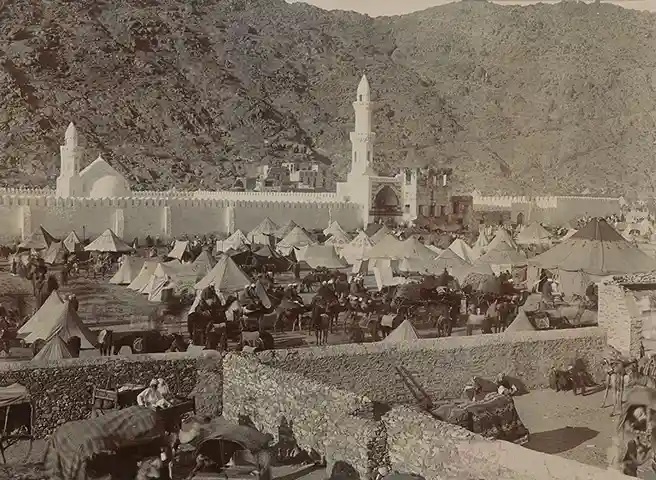
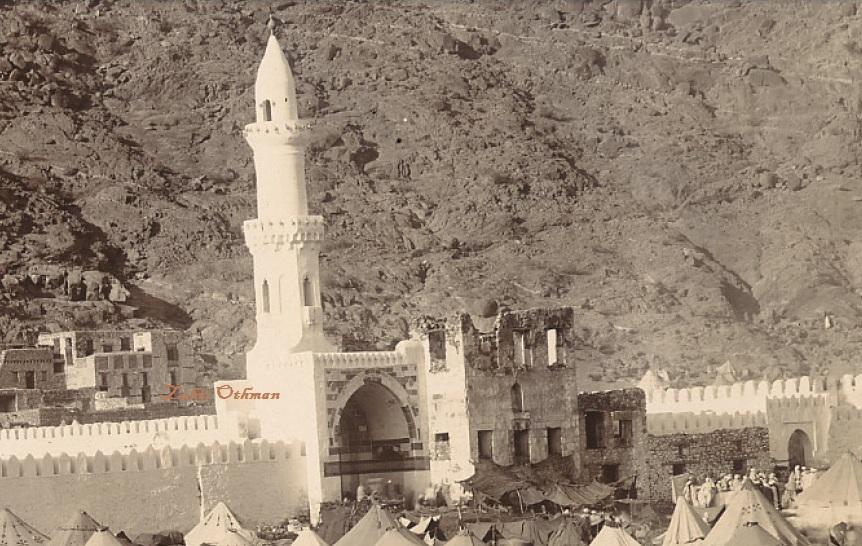
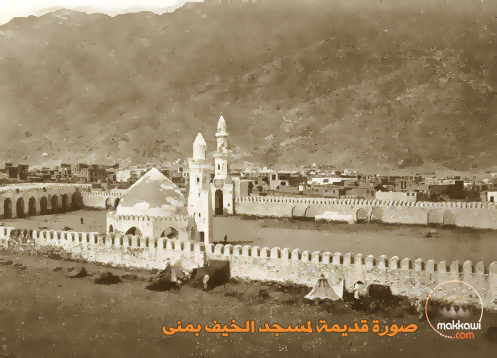
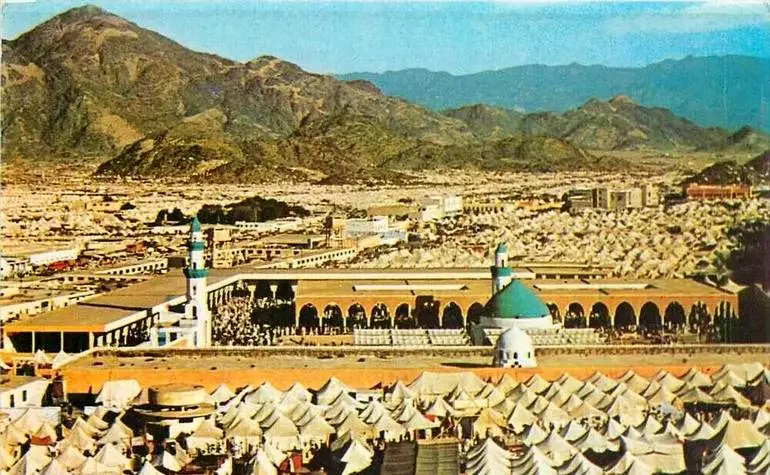
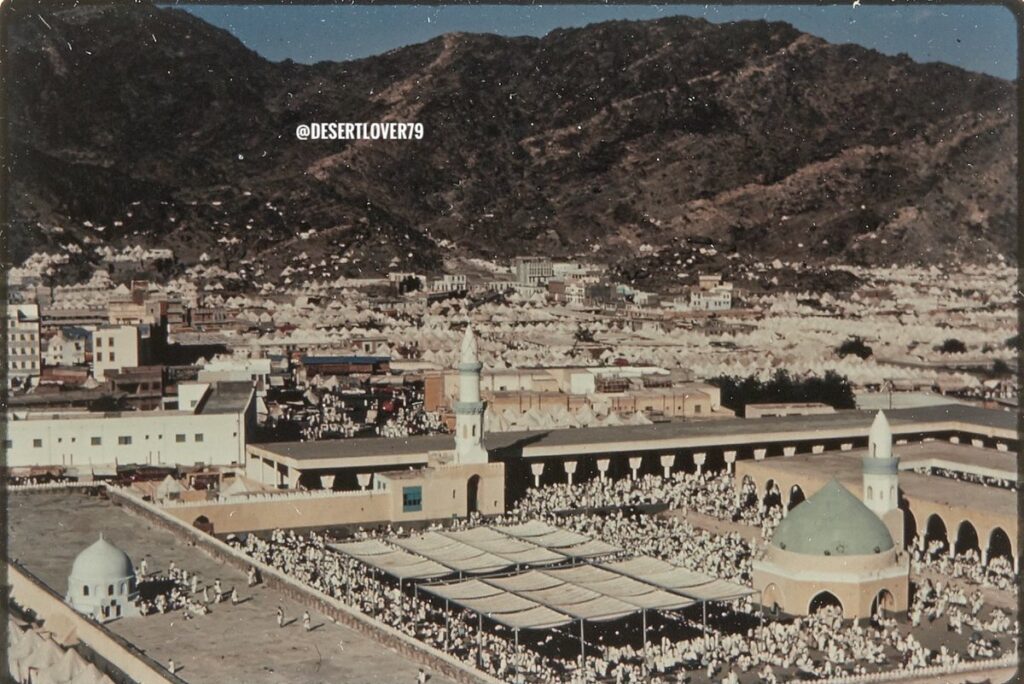

This is what it looks like in recent times.
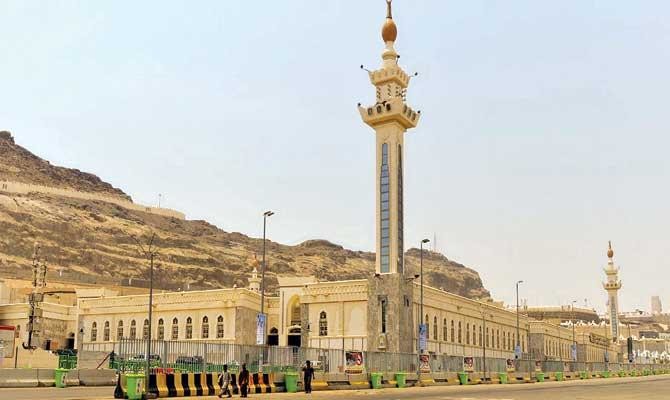
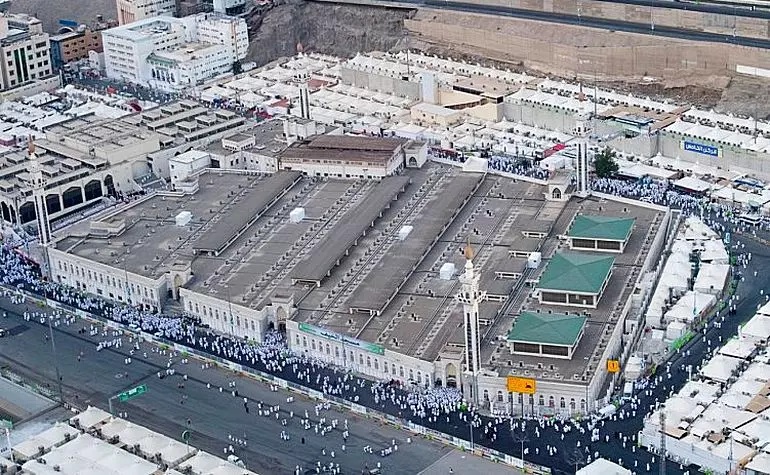

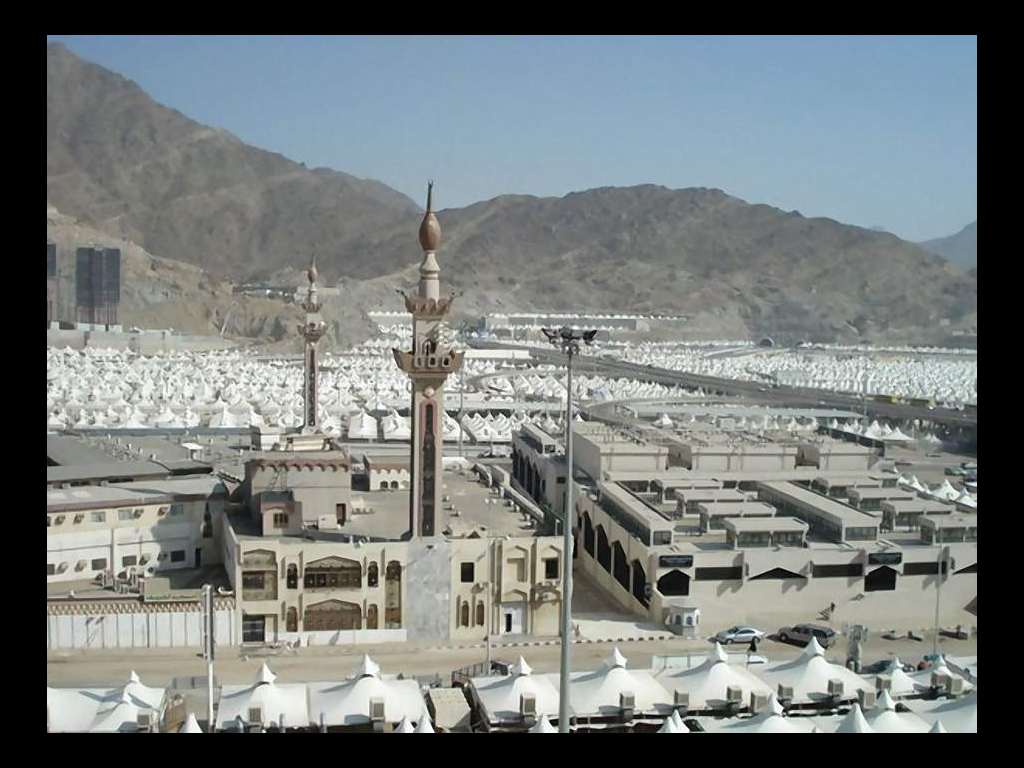
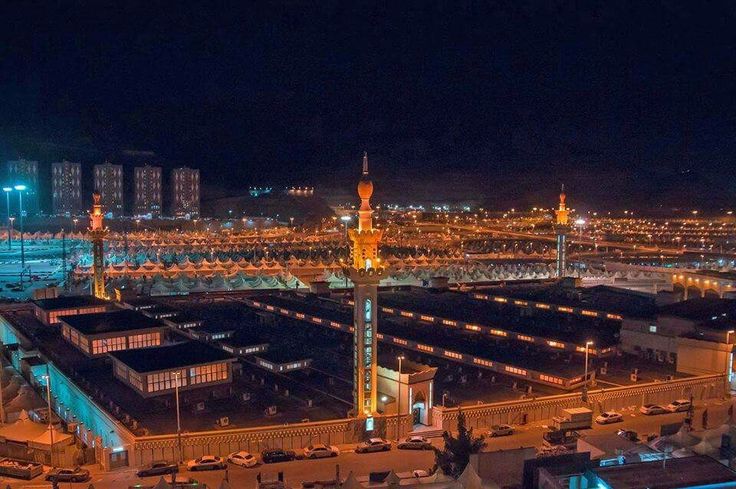
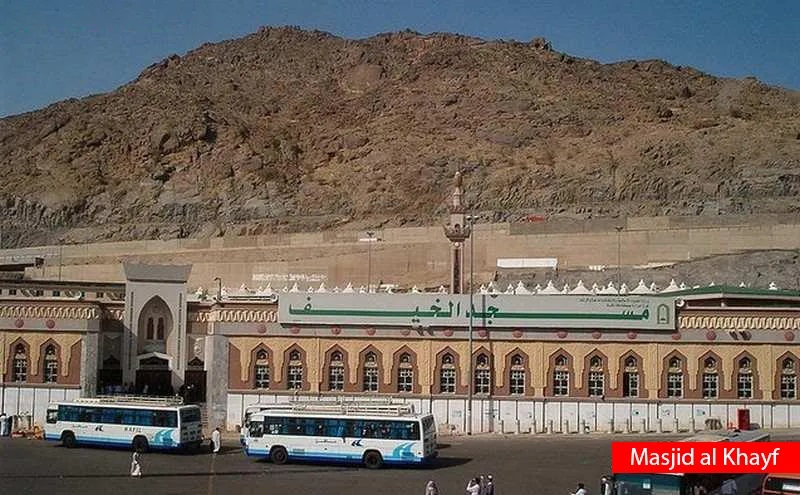
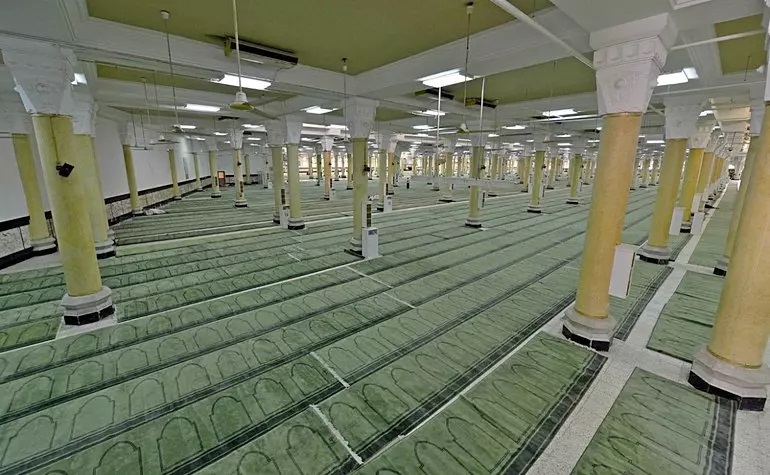
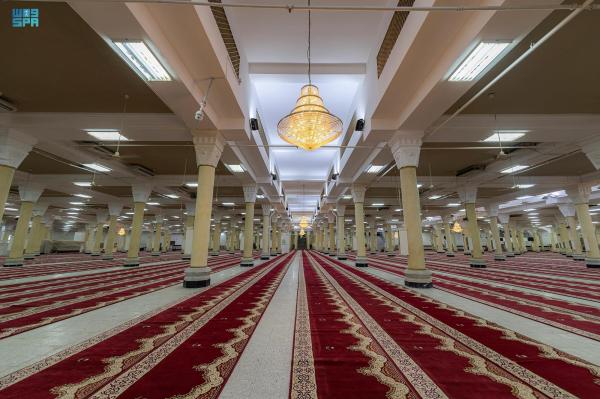
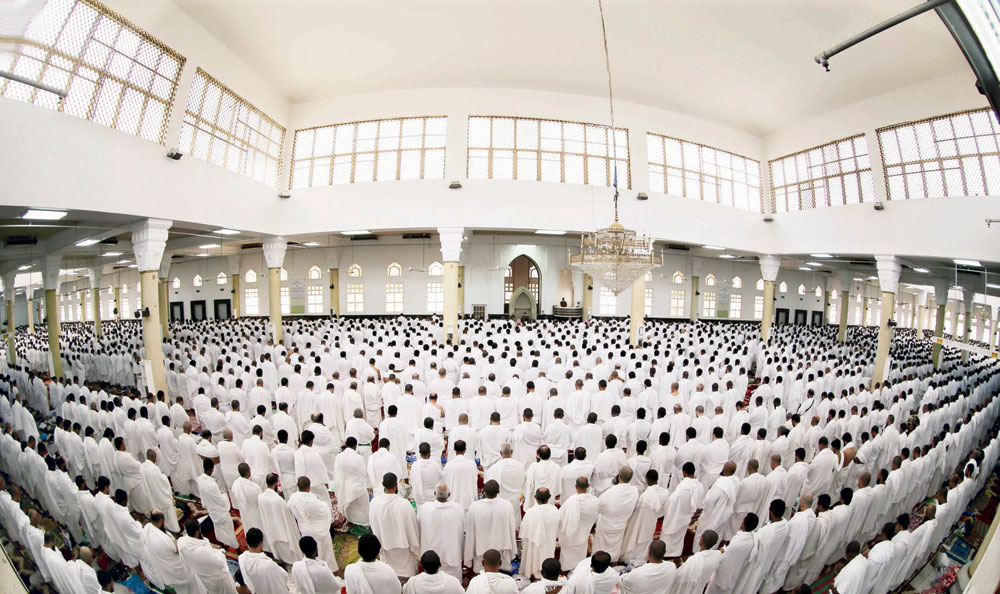
5. Spend the day remembering Allah and doing acts of worship
Those at Mina are on Hajj obviously. Apart from that, the 8th of Dhul Hijjah is also one of the best days of the year.
If one cannot remember Allah and do many acts of worship on these occasions, then when will one be able to do it?? Don’t waste time chatting. Focus on worshipping Allah alone.
6. Spend the night in Mina
The sunnah is to spend the night in Mina, not Azeeziyyah (which is not part of Mina) as many people do. As staying on Mina on this night is a sunnah, those staying outside Mina will not be incurring a penalty but will have left a sunnah. However, staying at Mina in the remaining days of Hajj (apart from the 9th) IS obligatory so those staying in Azeeziyyah will be incurring a penalty for every night missed in Mina. Please refer to the following article for more information on this issue.
They have signposts where Mina starts and ends so make sure you are within that area.
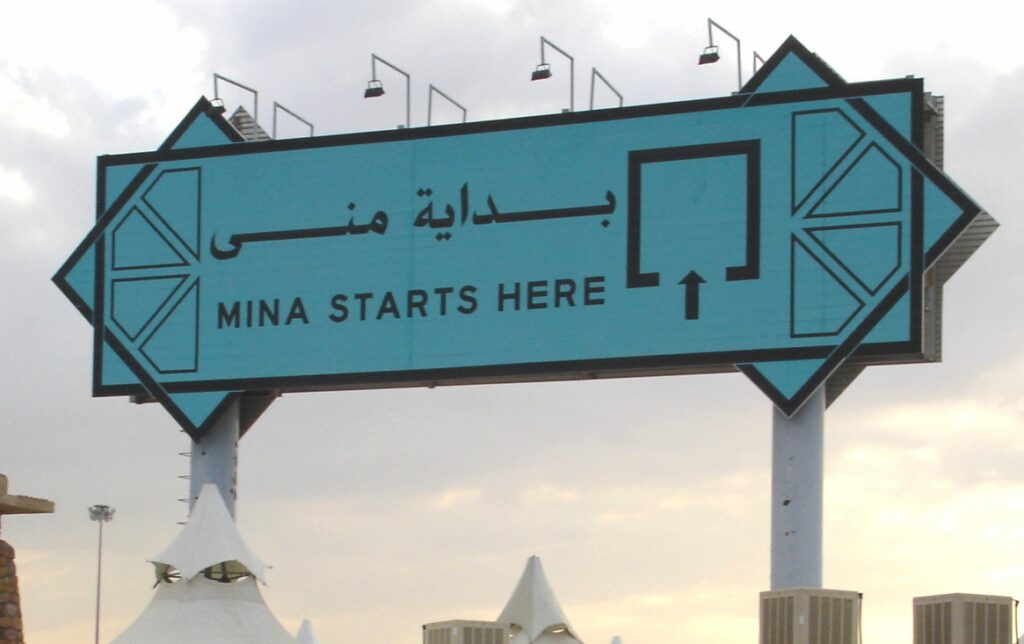
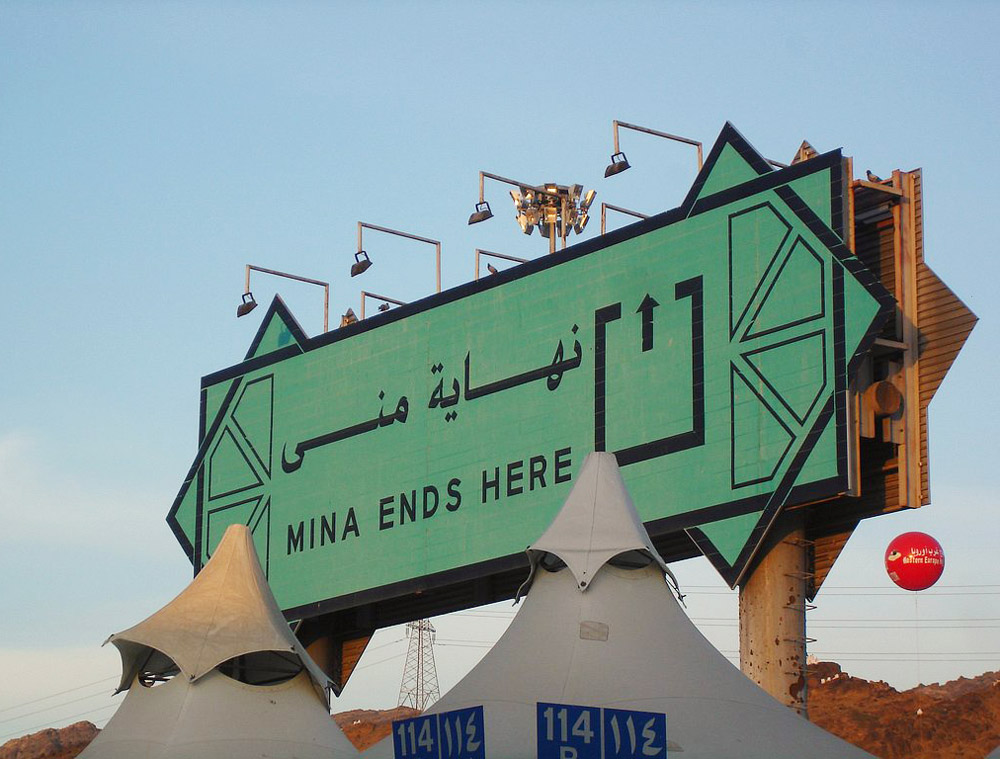
One should then set out for Arafah after sunrise.
فَلَمَّا كَانَ يَوْمُ التَّرْوِيَةِ تَوَجَّهُوا إِلَى مِنًى. فَأَهَلُّوا بِالْحَجِّ يَوْمَ التَّرْوِيَةِ. وَرَكِبَ رَسُولُ اللّهِ فَصَلَّى بِهَا الظُّهْرَ وَالْعَصْرَ وَالْمَغْرِبَ وَالْعِشَاءَ وَالْفَجْرَ. ثُمَّ مَكَثَ قَلِيلاً حَتَّى طَلَعَتِ الشَّمْسُ. وَأَمَرَ بِقُبَّةٍ مِنْ شَعَرٍ تُضْرَبُ لَهُ بِنَمِرَةَ. فَسَارَ رَسُولُ اللّهِ وَلاَ تَشُكُّ قُرَيْشٌ إِلاَّ أَنَّهُ وَاقِفٌ عِنْدَ الْمَشْعَرِ الْحَرَامِ.كَمَا كَانَتْ قُرَيْشٌ تَصْنَعُ فِي الْجَاهِلِيَّةِ. فَأَجَازَ رَسُولُ اللّهِ حَتَّى أَتَى عَرَفَةَ. فَوَجَدَ القُبَّةَ قَدْ ضُرِبَتْ لَهُ بِنَمِرَةَ
When it was the day of Tarwiyah (8th of Dhul Hijjah) they went to Mina and put on the ihram for Hajj and the Messenger of Allah (sallahu alaihi wasallam) rode and led the Dhuhr, Asr, Maghrib, Isha and Fajr prayers. He then waited a little until the sun rose, and commanded that a tent of hair should be pitched at Namirah. The Messenger of Allah (sallahu alaihi wasallam) then set out and the Quraish did not doubt that he would halt at al-Mashar al-Haram (the sacred site) as the Quraish used to do in the pre-Islamic period. The Messenger of Allah (sallahu alaihi wasallam), however, passed on until he came to Arafah and he found that the tent had been pitched for him at Namirah. [Sahih Muslim, Hadeeth No. 2803]
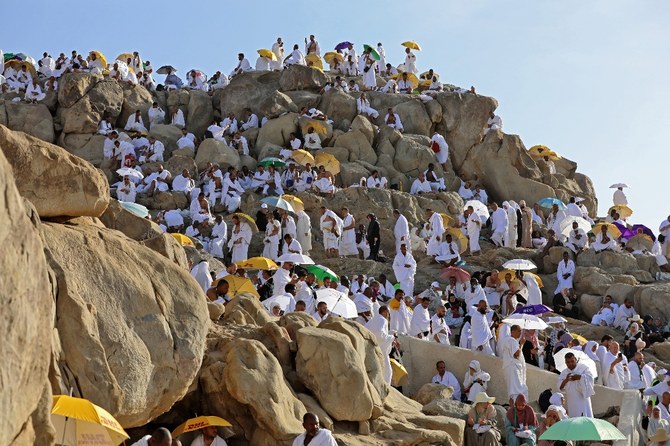
VIRTUES OF THE 9TH OF DHUL HIJJAH
On the 9th of Dhul Hijjah, also called the Day of Arafah, one leaves Mina after sunrise and sets out for Arafah.
This day (the 9th of Dhul Hijjah) is one of the best ten days of the year, the virtues of which were mentioned in the previous section. Apart from that, this day also has virtues specific to it.
Allah swore by this day in the Quran.
وَالْيَوْمِ الْمَوْعُودِ
وَشَاهِدٍ وَمَشْهُودٍ
And by the Promised Day; And by the witnessing day, and by the witnessed day; [Surah Al-Burooj (85) : 2-3]
عَنْ أَبِي هُرَيْرَةَ، قَالَ قَالَ رَسُولُ اللَّهِ صلى الله عليه وسلم : الْيَوْمُ الْمَوْعُودُ يَوْمُ الْقِيَامَةِ وَالْيَوْمُ الْمَشْهُودُ يَوْمُ عَرَفَةَ وَالشَّاهِدُ يَوْمُ الْجُمُعَةِ
Abu Hurairah (radiallahu anhu) narrated that the Messenger of Allah (sallallahu alaihi wasallam) said: “Al-Yawmul-Mawud (the Promised Day) is the Day of Resurrection, and Al-Yawmul-Mashhud (the Attended Day) is the Day of Arafah, and Ash-Shahid (the witness) is Friday.” [Jaami At-Tirmidhi, Hadeeth No. 3339. Graded “hasan” (good) by Al-Albani. The whole narration can be read here.]
وَالشَّفْعِ وَالْوَتْرِ
And by the even and the odd (of all the creations of Allah). [Surah Al-Fajr (89) : 3]
Imam Ibn Kathir states in his explanation of this verse*:
“It has been mentioned in a hadeeth that Al-Witr (the odd) is the Day of Arafah because it falls on the ninth, and Ash-Shafi (the even) is the Day of An-Nahr (sacrifice) because it falls on the tenth day. This was also said by Ibn Abbas, Ikrimah and Ad-Dahhak.”
[*I got this from my book (the hardcopy) as it seeming to be missing from the online version. In the footnote, it says that the hadeeth referred to is inauthentic. Allah knows better.]
The religion of Allah was perfected on this day and Allah’s favour upon us was also completed on this day.
الْيَوْمَ أَكْمَلْتُ لَكُمْ دِينَكُمْ وَأَتْمَمْتُ عَلَيْكُمْ نِعْمَتِي وَرَضِيتُ لَكُمُ الْإِسْلَامَ دِينًا
This day, I have perfected your religion for you, completed My Favour upon you, and have chosen for you Islam as your religion. [Surah Al-Maaidah (5) : 3]
عَنْ طَارِقِ بْنِ شِهَابٍ، قَالَ قَالَ رَجُلٌ مِنَ الْيَهُودِ لِعُمَرَ يَا أَمِيرَ الْمُؤْمِنِينَ لَوْ أَنَّ عَلَيْنَا نَزَلَتْ هَذِهِ الآيَةُ { الْيَوْمَ أَكْمَلْتُ لَكُمْ دِينَكُمْ وَأَتْمَمْتُ عَلَيْكُمْ نِعْمَتِي وَرَضِيتُ لَكُمُ الإِسْلاَمَ دِينًا} لاَتَّخَذْنَا ذَلِكَ الْيَوْمَ عِيدًا. فَقَالَ عُمَرُ إِنِّي لأَعْلَمُ أَىَّ يَوْمٍ نَزَلَتْ هَذِهِ الآيَةُ، نَزَلَتْ يَوْمَ عَرَفَةَ فِي يَوْمِ جُمُعَةٍ
Narrated Tariq bin Shihab(radiallahu anhu): A Jew said to Umar, “O Chief of the Believers, if this verse:
الْيَوْمَ أَكْمَلْتُ لَكُمْ دِينَكُمْ وَأَتْمَمْتُ عَلَيْكُمْ نِعْمَتِي وَرَضِيتُ لَكُمُ الْإِسْلَامَ دِينًا
This day, I have perfected your religion for you, completed My Favour upon you, and have chosen for you Islam as your religion. [Surah Al-Maaidah (5) : 3]
had been revealed upon us, we would have taken that day as an Eid (festival) day.” Umar said, “I know definitely on what day this Verse was revealed; it was revealed on the day of Arafah, on a Friday.” [Sahih Al-Bukhari, Volume 9, Hadeeth No. 373]
The Day of Arafah is also a day of Eid (for those in Arafah).
عَنْ عَمَّارِ بْنِ أَبِي عَمَّارٍ، قَالَ قَرَأَ ابْنُ عَبَّاسٍ : ( الْيَوْمَ أَكْمَلْتُ لَكُمْ دِينَكُمْ وَأَتْمَمْتُ عَلَيْكُمْ نِعْمَتِي وَرَضِيتُ لَكُمُ الإِسْلاَمَ دِينًا ) وَعِنْدَهُ يَهُودِيٌّ فَقَالَ لَوْ أُنْزِلَتْ هَذِهِ عَلَيْنَا لاَتَّخَذْنَا يَوْمَهَا عِيدًا . قَالَ ابْنُ عَبَّاسٍ فَإِنَّهَا نَزَلَتْ فِي يَوْمِ عِيدٍ فِي يَوْمِ جُمُعَةٍ وَيَوْمِ عَرَفَةَ
Narrated Ammar bin Abee Ammar: “Ibn Abbas (radiallahu anhuma) recited:
الْيَوْمَ أَكْمَلْتُ لَكُمْ دِينَكُمْ وَأَتْمَمْتُ عَلَيْكُمْ نِعْمَتِي وَرَضِيتُ لَكُمُ الْإِسْلَامَ دِينًا
This day, I have perfected your religion for you, completed My Favour upon you, and have chosen for you Islam as your religion. [Surah Al-Maaidah (5) : 3]
And a Jew was with him who said: ‘If this Ayah (verse) was revealed to us then we would have taken that day as a day of Eid (celebration).’ So Ibn Abbas said: ‘Indeed it was revealed on (two) Eids: On Friday, and on the Day of Arafah.’ [Jaami At-Tirmidhi, Hadeeth 3044. Graded “sahih al-isnad” (authentic chain of narrators) by Al-Albani.]
عن عُقْبَة بْنَ عَامِرٍ، قَالَ قَالَ رَسُولُ اللَّهِ صلى الله عليه وسلم : يَوْمُ عَرَفَةَ وَيَوْمُ النَّحْرِ وَأَيَّامُ التَّشْرِيقِ عِيدُنَا أَهْلَ الإِسْلاَمِ وَهِيَ أَيَّامُ أَكْلٍ وَشُرْبٍ
Narrated Uqbah ibn Amir (radiallahu anhu): The Prophet (sallallahu alaihi wasallam) said: The Day of Arafah, the Day of Sacrifice, the Days of Tashreeq are (the days of) our Eid, the people of Islam and they are the days of eating and drinking. [Sunan Abee Dawood, Hadeeth No. 2419. Graded “sahih” (authentic) by Al-Albani.]
However, it is a day of fasting for those who are not at Arafah. Fasting on the Day of Arafah expiates the (minor) sins of the previous year and the coming year.
وَسُئِلَ عَنْ صَوْمِ يَوْمِ عَرَفَةَ فَقَالَ : يُكَفِّرُ السَّنَةَ الْمَاضِيَةَ وَالْبَاقِيَةَ
He was asked about fasting on the day of Arafah (9th of Dhul Hijjah), whereupon he said: It expiates the sins of the preceding year and the coming year. [Sahih Muslim, Hadeeth No. 2603. The whole narration can be read here.]
However, the ones doing Hajj should NOT fast on this day as that is from the sunnah.
عَنْ أُمِّ الْفَضْلِ بِنْتِ الْحَارِثِ، أَنَّ نَاسًا، تَمَارَوْا عِنْدَهَا يَوْمَ عَرَفَةَ فِي صِيَامِ رَسُولِ اللَّهِ صلى الله عليه وسلم فَقَالَ بَعْضُهُمْ هُوَ صَائِمٌ وَقَالَ بَعْضُهُمْ لَيْسَ بِصَائِمٍ . فَأَرْسَلْتُ إِلَيْهِ بِقَدَحِ لَبَنٍ وَهُوَ وَاقِفٌ عَلَى بَعِيرِهِ بِعَرَفَةَ فَشَرِبَهُ
عَنِ ابْنِ أَبِي نَجِيحٍ، عَنْ أَبِيهِ، قَالَ سُئِلَ ابْنُ عُمَرَ عَنْ صَوْمِ، يَوْمِ عَرَفَةَ بِعَرَفَةَ فَقَالَ حَجَجْتُ مَعَ النَّبِيِّ صلى الله عليه وسلم فَلَمْ يَصُمْهُ وَمَعَ أَبِي بَكْرٍ فَلَمْ يَصُمْهُ وَمَعَ عُمَرَ فَلَمْ يَصُمْهُ وَمَعَ عُثْمَانَ فَلَمْ يَصُمْهُ . وَأَنَا لاَ أَصُومُهُ وَلاَ آمُرُ بِهِ وَلاَ أَنْهَى عَنْهُ
Ibn Abi Najib narrated from his father who said: “Ibn Umar was asked about fasting (the Day of) Arafah (at Arafah). He said: ‘I performed Hajj with the Prophet, and he did not fast it, and with Abu Bakr, and he did not fast it, and with Umar, and he did not fast it, and with Uthman, and he did not fast it. I do not fast it, nor order it nor forbid it.” [Jaami At-Tirmidhi, Hadeeth No. 751. Graded “sahih al-isnad” (authentic chain of narrators) by Al-Albani.]
There is no day where more people are saved from the Hellfire than on this day.
عَن عَائِشَة قَالَتْ إِنَّ رَسُولَ اللَّهِ صلى الله عليه وسلم قَالَ : مَا مِنْ يَوْمٍ أَكْثَرَ مِنْ أَنْ يُعْتِقَ اللَّهُ فِيهِ عَبْدًا مِنَ النَّارِ مِنْ يَوْمِ عَرَفَةَ وَإِنَّهُ لَيَدْنُو ثُمَّ يُبَاهِي بِهِمُ الْمَلاَئِكَةَ فَيَقُولُ مَا أَرَادَ هَؤُلاَءِ
Aishah (radiallahu anhu) reported Allah’s Messenger (sallallahu alaihi wasallam) as saying: There is no day when Allah sets free more servants from Hell than the Day of Arafah. He draws near, then praises them to the angels, saying: What do these want? [Sahih Muslim, Hadeeth No. 3126]
عَنْ ابن عمر أن النبي صلى الله عليه وسلم قال: إنَّ اللهَ عزَّ وجلَّ يُباهي ملائكتَه عشيَّةَ عرفةَ بأهلِ عرفةَ ، فيقول : انظُروا إلى عبادي شُعْثًا غُبْرًا
Ibn Umar (radiallahu anhu) narrated that the Prophet (sallallahu alaihi wasallam) said: “Allah expresses His pride to His angels at last part of the day on the Day of Arafah, about the people of Arafah. He says, ‘Look at My slaves who have come unkempt and dusty.’” [Sahih At-Targheeb Wat-Tarheeb, Hadeeth No. 1153]
عن ابن عمر رضي الله عنه قال: كنتُ جالسًا مع النَّبيِّ صلَّى اللهُ عليه وسلَّم في مسجدِ منًى فأتاه رجلٌ من الأنصارِ ورجلٌ من ثَقيفٍ فسلَّما ثمَّ قالا يا رسولَ اللهِ جِئنا نسألُك فقال إن شئتُما أخبرَتُكما بما جِئتما تسألاني عنه فعلتُ وإن شِئتُما أن أمسِكَ وتسألاني فعلتُ فقال أخبرنا يا رسولَ اللهِ فقال الثَّقفيُّ للأنصاريِّ سلْ فقال أخبِرْني يا رسولَ اللهِ فقال جِئتَني تسألُني عن مخرجِك من بيتِك تؤُمُّ البيتَ الحرامَ وما لك فيه وعن ركعتَيْك بعد الطَّوافِ وما لك فيهما وعن طوافِك بين الصَّفا والمروةِ وما لك فيه وعن وقوفِك عشيَّةَ عرفةَ وما لك فيه وعن رميِك الجِمارِ وما لك فيه وعن نحرِك فيه وما لك فيه مع الإفاضةِ فقال والَّذي بعثك بالحقِّ لَعَنْ هذا جئتُ أسألُك قال فإنَّك إذا خرجتَ من بيتِك تؤُمُّ البيتَ الحرامَ لا تضعُ ناقتُك خفًّا ولا ترفعُه إلَّا كتب اللهُ لك به حسنةً ومحا عنك خطيئةً وأمَّا ركعتاك بعد الطَّوافِ كعِتقِ رقبةٍ وأمَّا وقوفُك عشيَّةَ عرفةَ فإنَّ اللهَ يهبِطُ إلى سماءِ الدُّنيا فيباهي بكم الملائكةَ يقولُ عبادي جاءوني شُعثًا من كلِّ فجٍّ عميقٍ يرجُون جنَّتي فلو كانت ذنوبُكم كعددِ الرَّملِ أو كقطْرِ المطرِ أو كزَبَدِ البحرِ لغفرتُها أفيضوا عبادي مغفورًا لكم ولمن شفعتُم له وأمَّا رميُك الجمارَ فلك بكلِّ حصاةٍ رميْتَها تُكفِّرُ كبيرةً من الموبقاتِ وأمَّا نحرُك فمذخورٌ لك عند ربِّك وأمَّا حِلاقُك رأسَك فلك بكلِّ شعرةٍ حلقتَها حسنةٌ ويُمحَى عنك بها خطيئةٌ وأمَّا طوافُك بالبيتِ بعد ذلك فإنَّك تطوفُ ولا ذنبَ لك ويأتي ملَكٌ حتَّى يضعَ يدَيْه بين كتِفَيْك فيقولُ اعملْ فيما تستقبِلُ فقد غُفِر لك ما مضَى
It is narrated on the authority of Ibn Umar – radiAllaahu anhuma – who said: I was sitting with the Prophet – sallAllaahu alayhi wa sallam – in the masjid in Mina when a man from the Ansaar came and a man from the Thaqeef, they gave Salaam and said, “O Messenger of Allaah, we came to ask you questions.”
So the Messenger said: “If you want I can inform you why you came and what you want to ask, and I will do so, and if you want I will hold back and you can ask me and I will answer you.”
They said: “Tell us O Messenger of Allaah!”
The man from Thaqeef said to the Ansaari: “Ask.” So the Ansaari man said: “Inform me O Messenger of Allaah!”
The Messenger of Allaah said: “You came to me, to ask about leaving your house and aiming for the Bait-ul-Haraam and the reward for it; about praying two Rakah after Tawaaf and the reward for it; going between as-Safa and Marwa and the reward for it; your staying the evening in Mina, and the reward for it; stoning the Jamarah and the reward for it; slaughtering an animal and the reward for it; and the Tawaaf of al-Ifaadhah.” The man said: “I swear by the One who sent you with the truth! This is what I came to ask you about.”
The Prophet said: “As for you leaving your homes aiming for the Bait-ul-Haraam: then your she-camel does not place its foot nor does it raise it except that Allaah writes for you a reward due to it, and wipes off one of your sins.
As for the two Rakah after the Tawaaf, then it is equivalent to freeing a slave from the Children of Ismaeel. As for your circuiting of as-Safa and al-Marwa, then it is the same as freeing 70 slaves.
As for you staying till the evening in Arafah, then Allaah descends to the sky of the Duniya* and He boasts about you to the Angels, and says: ‘My slaves have come to Me, looking rough, from every deep valley hoping for My mercy, so if your sins were equivalent to the amount of sand or the drops of rain or like the foam on the sea I will forgive them. So go forth My slaves! Having forgiveness and for what or who you have interceded for.’
As for stoning the Jamaar (the pillars), then for every stone that you throw, it removes a big sin from the deadly sins. As for your slaughtering, then it is saved for you with your Lord. As for shaving your head, then there is a reward for every strand of hair that you shaved, and a sin is wiped off by it.
As for you performing Tawaaf of the House after all this, then by this time your are performing Tawaaf with no sin upon you and an Angel comes and places his hand between your shoulders saying: “Perform good deeds in what you face of the future for verily your past sins have been forgiven.” [Sahih At-Targheeb Wat-Tarheeb, Hadeeth No. 1112]
[* Duniya is this world.]
[Note: As mentioned in the previous parts, this hadeeth was translated by Brother Abbas Abu Yahya on his blog, so I decided to copy as it is and not make any changes to the translation.]
Ponder over this part for a moment. There is no day where more people are set free from the Hellfire than this day. Compare how lax we are on this day and the rest of the ten days of Dhul Hijjah compared to how active we are in the last ten nights of Ramadan. Laylatul Qadr is a great night, yes but Arafah is a great day as well. We need to bring our Ramadan mindset for these ten days i.e. give it our all.
This day, like Laylatul Qadr, also has a specific dua (supplication) for it.
جَدِّهِ، أَنَّ النَّبِيَّ صلى الله عليه وسلم قَالَ : خَيْرُ الدُّعَاءِ دُعَاءُ يَوْمِ عَرَفَةَ وَخَيْرُ مَا قُلْتُ أَنَا وَالنَّبِيُّونَ مِنْ قَبْلِي لاَ إِلَهَ إِلاَّ اللَّهُ وَحْدَهُ لاَ شَرِيكَ لَهُ لَهُ الْمُلْكُ وَلَهُ الْحَمْدُ وَهُوَ عَلَى كُلِّ شَيْءٍ قَدِيرٌ
Amr ibn Shuaib narrated from his father, from his grandfather, that the Prophet (sallallahu alaihi wasallam) said: “The best of supplication is the supplication of the Day of Arafah. And the best of what I and the Prophets before me have said is: None has the right to be worshipped but Allah, Alone, without partner, to Him belongs all that exists, and to Him belongs the Praise, and He is powerful over all things. (Lā ilāha illallāh, waḥdahu lā sharīka lahu, lahul-mulku wa lahul-ḥamdu, wa huwa `alā kulli shai’in qadīr).’” [Jaami At-Tirmidhi, Hadeeth No. 3585. Graded “hasan” (good) by Al-Albani.]
Ultimately, this day is where you make or break your Hajj, because the one who misses standing at Arafah has invalidated their Hajj.
عَنْ عَبْدِ الرَّحْمَنِ بْنِ يَعْمَرَ، قَالَ شَهِدْتُ رَسُولَ اللَّهِ صلى الله عليه وسلم فَأَتَاهُ نَاسٌ فَسَأَلُوهُ عَنِ الْحَجِّ فَقَالَ رَسُولُ اللَّهِ صلى الله عليه وسلم : الْحَجُّ عَرَفَةُ فَمَنْ أَدْرَكَ لَيْلَةَ عَرَفَةَ قَبْلَ طُلُوعِ الْفَجْرِ مِنْ لَيْلَةِ جَمْعٍ فَقَدْ تَمَّ حَجُّهُ .
It was narrated that Abdur-Rahman bin Yamur (radiallahu anhu) said: “I saw the Messenger of Allah when people came to him and asked him about Hajj. The Messenger of Allah (sallallahu alaihi wasallam) said: ‘Hajj is Arafah. Whoever catches up with the night of Arafah before dawn comes on the night of Jam (Al-Muzdalifah), his Hajj is complete.’” [Sunan An-Nasai, Hadeeth No. 3019. Graded “sahih” (authentic) by Al-Albani.]
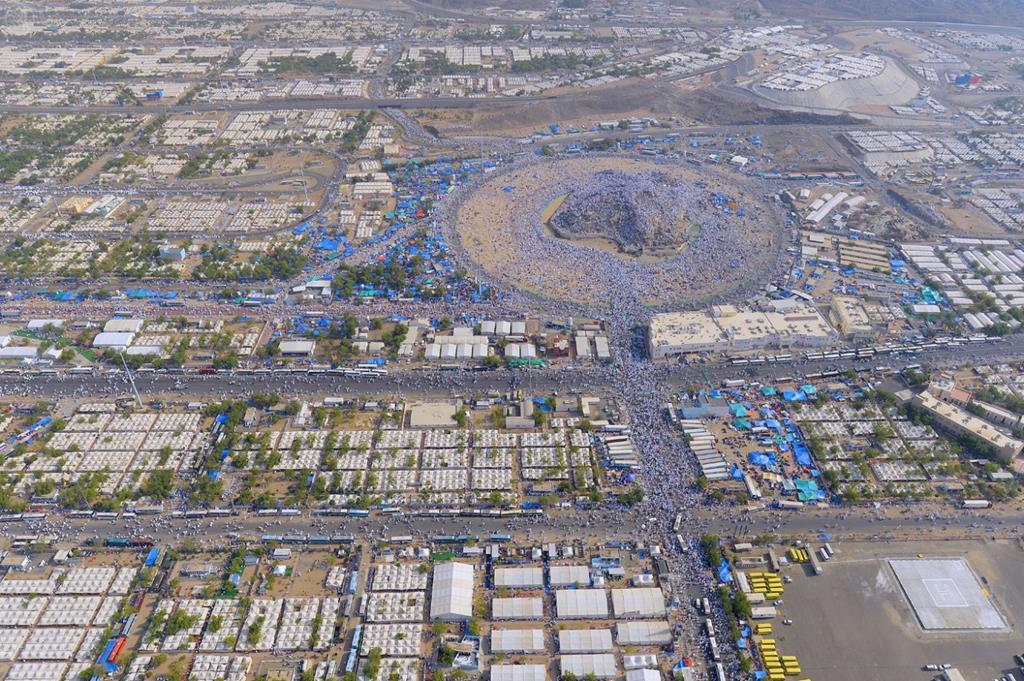
HEADING TO ARAFAH
The Day of Arafah is the second day of Hajj, so what does a pilgrim need to do on this day?
It states in the Hadeeth of Jaabir (radiallahu anhu):
فَلَمَّا كَانَ يَوْمُ التَّرْوِيَةِ تَوَجَّهُوا إِلَى مِنًى. فَأَهَلُّوا بِالْحَجِّ يَوْمَ التَّرْوِيَةِ. وَرَكِبَ رَسُولُ اللّهِ فَصَلَّى بِهَا الظُّهْرَ وَالْعَصْرَ وَالْمَغْرِبَ وَالْعِشَاءَ وَالْفَجْرَ. ثُمَّ مَكَثَ قَلِيلاً حَتَّى طَلَعَتِ الشَّمْسُ. وَأَمَرَ بِقُبَّةٍ مِنْ شَعَرٍ تُضْرَبُ لَهُ بِنَمِرَةَ. فَسَارَ رَسُولُ اللّهِ وَلاَ تَشُكُّ قُرَيْشٌ إِلاَّ أَنَّهُ وَاقِفٌ عِنْدَ الْمَشْعَرِ الْحَرَامِ.كَمَا كَانَتْ قُرَيْشٌ تَصْنَعُ فِي الْجَاهِلِيَّةِ. فَأَجَازَ رَسُولُ اللّهِ حَتَّى أَتَى عَرَفَةَ. فَوَجَدَ القُبَّةَ قَدْ ضُرِبَتْ لَهُ بِنَمِرَةَ. فَنَزَلَ بِهَا. حَتَّى إِذَا زَاغَتِ الشَّمْسُ أَمَرَ بِالْقَصْوَاءِ. فَرُحِلَتْ لَهُ. فَأَتَى بَطْنَ الْوَادِي. فَخَطَبَ النَّاسَ وَقَالَ: إِنَّ دِمَاءَكُمْ وَأَمْوَالَكُمْ حَرَامٌ عَلَيْكُمْ، كَحُرْمَةِ يَوْمِكُمْ هذَا، فِي شَهْرِكُمْ هذَا، فِي بَلَدِكُمْ هذَا. أَلاَ كُلُّ شَيْءٍ مِنْ أَمْرِ الْجَاهِلِيَّةِ تَحْتَ قَدَمَيَّ مَوْضُوعٌ، وَدِمَاءُ الْجَاهِلِيَّةِ مَوْضُوعَةٌ، وَإِنَّ أَوَّلَ دَمٍ أَضَعُ مِنْ دِمَائِنَا دَمُ ابْنِ رَبِيعَةَ بْنِ الْحَارِثِ، كَانَ مُسْتَرْضِعاً فِي بَنِي سَعْدٍ فَقَتَلَتْهُ هُذَيْلٌ، وَرِبَا الْجَاهِلِيَّةِ مَوْضُوعٌ، وَأَوَّلُ رِباً أَضَعُ رِبَانَا، رِبَا عَبَّاسِ بْنِ عَبْدِ الْمُطَّلِبِ. فَإِنَّهُ مَوْضُوعٌ كُلُّهُ. فَاتَّقُوا اللّهِ فِي النِّسَاءِ. فَإِنَّكُمْ أَخَذْتُمُوهُنَّ بِأَمَانِ اللّهِ، وَاسْتَحْلَلْتُمْ فُرُوجَهُنَّ بِكَلِمَةِ اللّهِ. وَلَكُمْ عَلَيْهِنَّ أَنْ لاَ يُوطِئْنَ فُرُشَكُمْ أَحَداً تَكْرَهُونَهُ. فَإِنْ فَعَلْنَ ذَلِكَ فَاضْرِبُوهُنَّ ضَرْباً غَيْرَ مُبَرِّحٍ. وَلَهُنَّ عَلَيْكُمْ رِزْقُهُنَّ وَكِسْوَتُهُنَّ بِالْمَعْرُوفِ. وَقَدْ تَرَكْتُ فِيكُمْ مَا لَنْ تَضِلُّوا بَعْدَهُ إِنِ اعْتَصَمْتُمْ بِهِ. كِتَابُ اللّهِ. وَأَنْتُمْ تُسْأَلُونَ عَنِّي. فَمَا أَنْتُمْ قَائِلُونَ؟ قَالُوا: نَشْهَدُ أَنَّكَ قَدْ بَلَّغْتَ وَأَدَّيْتَ وَنَصَحْتَ. فَقَالَ بِإِصْبَعِهِ السَّبَّابَةِ، يَرْفَعُهَا إِلَى السَّمَاءِ وَيَنْكُتُهَا إِلَى النَّاسِ: اللَّهُمَّ اشْهَدْ. اللَّهُمَّ اشْهَدْ. ثَلاَثَ مَرَّاتٍ. ثُمَّ أَذَّنَ. ثُمَّ أَقَامَ فَصَلَّى الظُّهْرَ. ثُمَّ أَقَامَ فَصَلَّى الْعَصْرَ. وَلَمْ يُصَلِّ بَيْنَهُمَا شَيْئاً. ثُمَّ رَكِبَ رَسُولُ اللّهِ . حَتَّى أَتَى الْمَوْقِفَ. فَجَعَلَ بَطْنَ نَاقَتِهِ الْقَصْوَاءِ إِلَى الصَّخَرَاتِ. وَجَعَلَ حَبْلَ الْمُشَاةِ بَيْنَ يَدَيْهِ. وَاسْتَقْبَلَ الْقِبْلَةَ. فَلَمْ يَزَلْ وَاقِفاً حَتَّى غَرَبَتِ الشَّمْسُ. وَذَهَبَتِ الصُّفْرَةُ قَلِيلاً حَتَّى غَابَ الْقُرْصُ. وَأَرْدَفَ أُسَامَةَ خَلْفَهُ. وَدَفَعَ رَسُولُ اللّهِ وَقَدْ شَنَقَ لِلْقَصْوَاءِ الزِّمَامَ. حَتَّى إِنَّ رَأْسَهَا لَيُصِيبُ مَوْرِكَ رَحْلِهِ. وَيَقُولُ بِيَدِهِ الْيُمْنَى: أَيُّهَا النَّاسُ السَّكِينَةَ السَّكِينَةَ. كُلَّمَا أَتَى حَبْلاً مِنَ الْحِبَالِ أَرْخَى لَهَا قَليلاً.حَتَّى تَصْعَدَ. حَتَّى أَتَى الْمُزْدَلِفَةَ
When it was the day of Tarwiyah (8th of Dhul Hijjah) they went to Mina and put on the ihram for Hajj and the Messenger of Allah (sallahu alaihi wasallam) rode and led the Dhuhr, Asr, Maghrib, Isha and Fajr prayers. He then waited a little until the sun rose, and commanded that a tent of hair should be pitched at Namirah. The Messenger of Allah (sallahu alaihi wasallam) then set out and the Quraish did not doubt that he would halt at al-Mashar al-Haram (the sacred site) as the Quraish used to do in the pre-Islamic period. The Messenger of Allah (sallahu alaihi wasallam), however, passed on until he came to Arafah and he found that the tent had been pitched for him at Namirah. There he got down until the sun had passed the meridian; he commanded that al-Qaswa should be brought and saddled for him.
Then he came to the bottom of the valley, and addressed the people saying: Verily your blood, your property are as sacred and inviolable as the sacredness of this day of yours, in this month of yours, in this town of yours. Behold! Everything pertaining to the Days of Ignorance is under my feet completely abolished. Abolished are also the blood-revenges of the Days of Ignorance. The first claim of ours on blood-revenge which I abolish is that of the son of Rabia ibn al-Harith, who was nursed among the tribe of Sad and killed by Hudhail. And the riba of the pre-Islamic period is abolished, and the first of our riba I abolish is that of Abbas ibn Abdil-Muttalib, for it is all abolished. Fear Allah concerning women! Verily you have taken them on the security of Allah, and intercourse with them has been made lawful unto you by words of Allah. You too have right over them, and that they should not allow anyone to sit on your bed whom you do not like. But if they do that, you can chastise them but not severely. Their rights upon you are that you should provide them with food and clothing in a fitting manner. I have left among you the Book of Allah, and if you hold fast to it, you would never go astray. And you would be asked about me (on the Day of Resurrection), (now tell me) what would you say?
They (the audience) said: We will bear witness that you have conveyed (the message), discharged (the ministry of Prophethood) and given wise (sincere) counsel. He (the narrator) said: He (the Prophet) then raised his forefinger towards the sky and pointing it at the people (said):” O Allah, be witness. 0 Allah, be witness,” saying it thrice. (Bilal then) pronounced Adhan and later on Iqamah and he (the Prophet) led the noon prayer. He (Bilal) then uttered Iqamah and he (the Prophet) led the afternoon prayer and he observed no other prayer in between the two.
The Messenger of Allah (sallahu alaihi wasallam) then mounted his camel and came to the place of stay, making his she-camel al-Qaswa, turn towards the side where there we are rocks, having the path taken by those who went on foot in front of him, and faced the Qibla. He kept standing there until the sun set, and the yellow light had somewhat gone, and the disc of the sun had disappeared. He made Usama (radiallahu anhu) sit behind him, and he pulled the nose-string of Qaswa so forcefully that its head touched the saddle (in order to keep her under perfect control), and he pointed out to the people with his right hand to be moderate (in speed), and whenever he happened to pass over an elevated tract of sand, he slightly loosened it (the nose-string of his camel) until she climbed up and this is how he reached al-Muzdalifah. [Sahih Muslim, Hadeeth No. 2803]
Here are the steps that the pilgrim needs to take on this great day:
1. Do ghusl (full bathing)
Doing ghusl (full bathing) on the Day of Arafah is recommended as shown by the actions of the Sahaabah (radiallahu anhum). Please refer to this article for the proof of that.
Now, it is very difficult to bathe in Arafah because the tents are only made for a stopover and are not for staying overnight like in Mina. So it would be better to have a bath in Mina itself, perhaps after Fajr and then set out.
2. Set out from Mina to Arafah after sunrise
فَلَمَّا كَانَ يَوْمُ التَّرْوِيَةِ تَوَجَّهُوا إِلَى مِنًى. فَأَهَلُّوا بِالْحَجِّ يَوْمَ التَّرْوِيَةِ. وَرَكِبَ رَسُولُ اللّهِ فَصَلَّى بِهَا الظُّهْرَ وَالْعَصْرَ وَالْمَغْرِبَ وَالْعِشَاءَ وَالْفَجْرَ. ثُمَّ مَكَثَ قَلِيلاً حَتَّى طَلَعَتِ الشَّمْسُ. وَأَمَرَ بِقُبَّةٍ مِنْ شَعَرٍ تُضْرَبُ لَهُ بِنَمِرَةَ. فَسَارَ رَسُولُ اللّهِ
When it was the day of Tarwiyah (8th of Dhul Hijjah) they went to Mina and put on the ihram for Hajj and the Messenger of Allah (sallahu alaihi wasallam) rode and led the Dhuhr, Asr, Maghrib, Isha and Fajr prayers. He then waited a little until the sun rose, and commanded that a tent of hair should be pitched at Namirah. The Messenger of Allah (sallahu alaihi wasallam) then set out. [Sahih Muslim, Hadeeth No. 2803]
Remember to continue the talbiyah. You can also say the takbeer as well. Perhaps it would be better to say both the talbiyah and the takbeer throughout the journey.
عَنْ عَبْدِ اللَّهِ بْنِ عَبْدِ اللَّهِ بْنِ عُمَرَ، عَنْ أَبِيهِ، قَالَ غَدَوْنَا مَعَ رَسُولِ اللَّهِ صلى الله عليه وسلم مِنْ مِنًى إِلَى عَرَفَاتٍ مِنَّا الْمُلَبِّي وَمِنَّا الْمُكَبِّرُ
Abdullah ibn Abdullah ibn Umar narrated from his father who said: As we proceeded in the morning along with the Messenger of Allah (sallallahu alaihi wasallam) from Mina to Arafah, some of us pronounced Talbiyah, and some pronounced Takbeer (Allahu Akbar). [Sahih Muslim, Hadeeth No. 2937]
عَنْ مُحَمَّدِ بْنِ أَبِي بَكْرٍ الثَّقَفِيِّ، أَنَّهُ سَأَلَ أَنَسَ بْنَ مَالِكٍ وَهُمَا غَادِيَانِ مِنْ مِنًى إِلَى عَرَفَةَ كَيْفَ كُنْتُمْ تَصْنَعُونَ فِي هَذَا الْيَوْمِ مَعَ رَسُولِ اللَّهِ صلى الله عليه وسلم فَقَالَ كَانَ يُهِلُّ مِنَّا الْمُهِلُّ فَلاَ يُنْكِرُ عَلَيْهِ، وَيُكَبِّرُ مِنَّا الْمُكَبِّرُ فَلاَ يُنْكِرُ عَلَيْهِ
Narrated Muhammad bin Abu Bakr Al-Thaqafi: I asked Anas bin Malik while we were proceeding from Mina to Arafah, “What do you use to do on this day when you were with Allah’s Messenger (sallallahu alaihi wasallam ?” Anas said, “Some of us used to recite Talbiyah and nobody objected to that, and others used to recite Takbeer and nobody objected to that.” [Sahih Al-Bukhari, Volume 2, Hadeeth No. 721]
The takbeer of Dhul Hjjah is as follows:

Remember that the specific takbeer is recited after every obligatory prayer starting from Fajr on the Day of Arafah to Asr on the 13th of Dhul Hijjah, whereas the general takbeer is recited on the first 13th Days of Dhul Hijjah throughout the day. Please refer to this article for more details.
3. Stop over at Namirah if one reaches Arafah early
One can do this if it is easy for them, as the Prophet (sallallahi alaihi wasallam) did this. They should then head to their place of stay in Arafah after the sun has passed the meridian (which is a bit before Dhuhr time).
فَأَجَازَ رَسُولُ اللّهِ حَتَّى أَتَى عَرَفَةَ. فَوَجَدَ القُبَّةَ قَدْ ضُرِبَتْ لَهُ بِنَمِرَةَ. فَنَزَلَ بِهَا. حَتَّى إِذَا زَاغَتِ الشَّمْسُ أَمَرَ بِالْقَصْوَاءِ. فَرُحِلَتْ لَهُ
The Messenger of Allah (sallahu alaihi wasallam), however, passed on until he came to Arafah and he found that the tent had been pitched for him at Namirah. There he got down until the sun had passed the meridian; he commanded that al-Qaswa should be brought and saddled for him. [Sahih Muslim, Hadeeth No. 2803]
However, if one is unable to do so, there is no harm if one proceeds directly to their tent in Arafah.
[Masjid Namirah is where the Imam gives the Arafah sermon from. This will be discussed soon, in shaa Allah.]
4. Head for the place you are staying at in Arafah
Now one will be heading for their place of stay in Arafah. A very important event took place here a very long time ago, and it is an event which affected ALL of us.
وَإِذْ أَخَذَ رَبُّكَ مِن بَنِي آدَمَ مِن ظُهُورِهِمْ ذُرِّيَّتَهُمْ وَأَشْهَدَهُمْ عَلَىٰ أَنفُسِهِمْ أَلَسْتُ بِرَبِّكُمْ ۖ قَالُوا بَلَىٰ ۛ شَهِدْنَا ۛ أَن تَقُولُوا يَوْمَ الْقِيَامَةِ إِنَّا كُنَّا عَنْ هَٰذَا غَافِلِينَ
أَوْ تَقُولُوا إِنَّمَا أَشْرَكَ آبَاؤُنَا مِن قَبْلُ وَكُنَّا ذُرِّيَّةً مِّن بَعْدِهِمْ ۖ أَفَتُهْلِكُنَا بِمَا فَعَلَ الْمُبْطِلُونَ
And (remember) when your Lord brought forth from the Children of Adam, from their loins, their seed (or from Adam’s loin his offspring) and made them testify as to themselves (saying): “Am I not your Lord?” They said: “Yes! We testify,” lest you should say on the Day of Resurrection: “Verily, we have been unaware of this.”
Or lest you should say: “It was only our fathers aforetime who took others as partners in worship along with Allah, and we were (merely their) descendants after them; will You then destroy us because of the deeds of men who practiced Al-Batil (i.e. polytheism and committing crimes and sins, invoking and worshipping others besides Allah)?” [Surah Al-Araaf (7) : 172 = 173]
عن ابن عباس رضي الله عنهما عن النبي صلى الله عليه وسلم قال: أخَذ اللهُ المِيثاقَ من ظَهْرِ آدَمَ بنَعْمانَ -يعني: عَرَفةَ- فأخرَجَ من صُلْبِه كلَّ ذُرِّيَّةٍ ذرَأَها، فنثَرَهم بينَ يدَيْه كالذَّرِّ، ثم كلَّمَهم قِبَلًا، قال: {أَلَسْتُ بِرَبِّكُمْ قَالُوا بَلَى شَهِدْنَا أَنْ تَقُولُوا يَوْمَ الْقِيَامَةِ إِنَّا كُنَّا عَنْ هَذَا غَافِلِينَ * أَوْ تَقُولُوا إِنَّمَا أَشْرَكَ آبَاؤُنَا مِنْ قَبْلُ وَكُنَّا ذُرِّيَّةً مِنْ بَعْدِهِمْ أَفَتُهْلِكُنَا بِمَا فَعَلَ الْمُبْطِلُونَ} [الأعراف: 172-173]
It was narrated from Ibn Abbas (radiallahu anhu) that the Prophet (sallallahu alaihi wasallam) said: “Allah took the covenant from the loins of Adam in Naman, i.e. Arafah. He brought forth from his loins all his offspring He created then He spread them before Him like ants, then He spoke to them face to face, and said:
أَلَسْتُ بِرَبِّكُمْ ۖ قَالُوا بَلَىٰ ۛ شَهِدْنَا ۛ أَن تَقُولُوا يَوْمَ الْقِيَامَةِ إِنَّا كُنَّا عَنْ هَٰذَا غَافِلِينَ
أَوْ تَقُولُوا إِنَّمَا أَشْرَكَ آبَاؤُنَا مِن قَبْلُ وَكُنَّا ذُرِّيَّةً مِّن بَعْدِهِمْ ۖ أَفَتُهْلِكُنَا بِمَا فَعَلَ الْمُبْطِلُونَ
“Am I not your Lord?” They said: “Yes! We testify,” lest you should say on the Day of Resurrection: “Verily, we have been unaware of this.”
Or lest you should say: “It was only our fathers aforetime who took others as partners in worship along with Allah, and we were (merely their) descendants after them; will You then destroy us because of the deeds of men who practiced Al-Batil (i.e. polytheism and committing crimes and sins, invoking and worshipping others besides Allah)?” [Surah Al-Araaf (7) : 172 = 173]
[Musnad Ahmad, Hadeeth No. 2455. Shuaib Al-Arnaut said that its men were trustworthy. He also mentioned the statement of some scholars who pointed out that this was a statement of Ibn Abbas (radiallahu anhuma) and not the Prophet (sallallahu alaihi wasallam).]
Some other things took place when all Adam’s (alaihissalaam) offspring were brought forth.
عَنْ أَبِي هُرَيْرَةَ، قَالَ قَالَ رَسُولُ اللَّهِ صلى الله عليه وسلم : لَمَّا خَلَقَ اللَّهُ آدَمَ مَسَحَ ظَهْرَهُ فَسَقَطَ مِنْ ظَهْرِهِ كُلُّ نَسَمَةٍ هُوَ خَالِقُهَا مِنْ ذُرِّيَّتِهِ إِلَى يَوْمِ الْقِيَامَةِ وَجَعَلَ بَيْنَ عَيْنَىْ كُلِّ إِنْسَانٍ مِنْهُمْ وَبِيصًا مِنْ نُورٍ ثُمَّ عَرَضَهُمْ عَلَى آدَمَ فَقَالَ أَىْ رَبِّ مَنْ هَؤُلاَءِ قَالَ هَؤُلاَءِ ذُرِّيَّتُكَ فَرَأَى رَجُلاً مِنْهُمْ فَأَعْجَبَهُ وَبِيصُ مَا بَيْنَ عَيْنَيْهِ فَقَالَ أَىْ رَبِّ مَنْ هَذَا فَقَالَ هَذَا رَجُلٌ مِنْ آخِرِ الأُمَمِ مِنْ ذُرِّيَّتِكَ يُقَالُ لَهُ دَاوُدُ . فَقَالَ رَبِّ كَمْ جَعَلْتَ عُمْرَهُ قَالَ سِتِّينَ سَنَةً قَالَ أَىْ رَبِّ زِدْهُ مِنْ عُمْرِي أَرْبَعِينَ سَنَةً . فَلَمَّا انْقَضَى عُمْرُ آدَمَ جَاءَهُ مَلَكُ الْمَوْتِ فَقَالَ أَوَلَمْ يَبْقَ مِنْ عُمْرِي أَرْبَعُونَ سَنَةً قَالَ أَوَلَمْ تُعْطِهَا ابْنَكَ دَاوُدَ قَالَ فَجَحَدَ آدَمُ فَجَحَدَتْ ذُرِّيَّتُهُ وَنَسِيَ آدَمُ فَنَسِيَتْ ذُرِّيَّتُهُ وَخَطِئَ آدَمُ فَخَطِئَتْ ذُرِّيَّتُهُ
The fact that we all took a covenant is something to ponder over. And this is something that the least punished person in Hell will be reminded of.
عَنْ أَنَس بْنَ مَالِكٍ ـ رضى الله عنه ـ عَنِ النَّبِيِّ صلى الله عليه وسلم قَالَ : يَقُولُ اللَّهُ تَعَالَى لأَهْوَنِ أَهْلِ النَّارِ عَذَابًا يَوْمَ الْقِيَامَةِ لَوْ أَنَّ لَكَ مَا فِي الأَرْضِ مِنْ شَىْءٍ أَكُنْتَ تَفْتَدِي بِهِ فَيَقُولُ نَعَمْ. فَيَقُولُ أَرَدْتُ مِنْكَ أَهْوَنَ مِنْ هَذَا وَأَنْتَ فِي صُلْبِ آدَمَ أَنْ لاَ تُشْرِكَ بِي شَيْئًا فَأَبَيْتَ إِلاَّ أَنْ تُشْرِكَ بِي
Narrated Anas bin Malik (radiallahu anhu): The Prophet (sallallahu alaihi wasallam) said, “Allah will say to the person who will have the minimum punishment in the Fire on the Day of Resurrection, ‘If you had things equal to whatever is on the earth, would you ransom yourself (from the punishment) with it?’ He will reply, Yes. Allah will say, ‘I asked you a much easier thing than this while you were in the backbone of Adam, that is, not to worship others besides Me, but you refused and insisted to worship others besides Me.”‘ [Sahih Al-Bukhari, Volume 8, Hadeeth No. 562]
The “least” punishment in Hell is very severe.
عَنْ أَبِي سَعِيدٍ الْخُدْرِيِّ، أَنَّ رَسُولَ اللَّهِ صلى الله عليه وسلم قَالَ : إِنَّ أَدْنَى أَهْلِ النَّارِ عَذَابًا يَنْتَعِلُ بِنَعْلَيْنِ مِنْ نَارٍ يَغْلِي دِمَاغُهُ مِنْ حَرَارَةِ نَعْلَيْهِ
Abu Saeed al-Khudri (radiallahu anhu) reported: Verily, the Messenger of Allah (sallallahu alaihi wasallam) said: The least tormented of the inhabitants of the Fire would be he who would wear two shoes of Fire and his brain would boil on account of the heat of the shoes. [Sahih Muslim, Hadeeth No. 412]
The identity of this person seems to be have been mentioned in another narration.
عَنِ ابْنِ عَبَّاسٍ، أَنَّ رَسُولَ اللَّهِ صلى الله عليه وسلم قَالَ : أَهْوَنُ أَهْلِ النَّارِ عَذَابًا أَبُو طَالِبٍ وَهُوَ مُنْتَعِلٌ بِنَعْلَيْنِ يَغْلِي مِنْهُمَا دِمَاغُهُ
Ibn Abbas (radiallahu anhuma) reported: The Messenger of Allah (sallallahu alaihi wasallam) said: Among the inhabitants of the Fire, Abu Taalib would have the least suffering, and he would be wearing two shoes (of Fire) which would boil his brain. [Sahih Muslim, Hadeeth No. 413]
Abu Taalib was the paternal uncle of the Prophet (sallallahu alaihi wasallam), and also of Ibn Abbas (radiallahu anhuma) who narrated this hadeeth. Abu Taalib helped the Prophet (sallallahu alaihi wasallam) a lot but he refused to accept Islam. Due to this, he is a person of the Hellfire.
The above narrations should encourage everyone to learn about tawheed (singling out Allah for worship) because they took a covenant to worship Allah alone. Only a person who has tawheed will enter Paradise, so everyone must make sure to learn and apply tawheed.
عَنْ جَابِر بْن عَبْدِ اللَّهِ، قَالَ سَمِعْتُ رَسُولَ اللَّهِ صلى الله عليه وسلم يَقُولُ : مَنْ لَقِيَ اللَّهَ لاَ يُشْرِكُ بِهِ شَيْئًا دَخَلَ الْجَنَّةَ وَمَنْ لَقِيَهُ يُشْرِكُ بِهِ دَخَلَ النَّارِ
It is narrated on the authority of Jaabir bin Abdullah (radiallahu anhu) : I heard the Messenger of Allah (sallallahu alaihi wasallam) saying: He who met Allah without associating anything with Allah entered Paradise and he who met Him associating (anything) with Him entered Fire. [Sahih Muslim, Hadeeth No. 169]
In pre-Islamic times, the Quraish used to not stand in Arafah because they thought they were too “special” to do so.
عَنْ هِشَامِ بْنِ عُرْوَةَ، قَالَ عُرْوَةُ كَانَ النَّاسُ يَطُوفُونَ فِي الْجَاهِلِيَّةِ عُرَاةً إِلاَّ الْحُمْسَ، وَالْحُمْسُ قُرَيْشٌ وَمَا وَلَدَتْ، وَكَانَتِ الْحُمْسُ يَحْتَسِبُونَ عَلَى النَّاسِ يُعْطِي الرَّجُلُ الرَّجُلَ الثِّيَابَ يَطُوفُ فِيهَا، وَتُعْطِي الْمَرْأَةُ الْمَرْأَةَ الثِّيَابَ تَطُوفُ فِيهَا، فَمَنْ لَمْ يُعْطِهِ الْحُمْسُ طَافَ بِالْبَيْتِ عُرْيَانًا، وَكَانَ يُفِيضُ جَمَاعَةُ النَّاسِ مِنْ عَرَفَاتٍ، وَيُفِيضُ الْحُمْسُ مِنْ جَمْعٍ. قَالَ وَأَخْبَرَنِي أَبِي عَنْ عَائِشَةَ ـ رضى الله عنها ـ أَنَّ هَذِهِ الآيَةَ نَزَلَتْ فِي الْحُمْسِ {ثُمَّ أَفِيضُوا مِنْ حَيْثُ أَفَاضَ النَّاسُ} قَالَ كَانُوا يُفِيضُونَ مِنْ جَمْعٍ فَدُفِعُوا إِلَى عَرَفَاتٍ
Narrated Hisham ibn Urwah: Urwah said: During the Pre-Islamic period of Ignorance, the people used to perform Tawaf of the Kabah naked except the Hums; and the Hums were Quraish and their offspring. The Hums used to give clothes to the men who would perform the Tawaf wearing them; and women (of the Hums) used to give clothes to the women who would perform the Tawaf wearing them. Those to whom the Hums did not give clothes would perform Tawaf round the Kabah naked. Most of the people used to go away (disperse) directly from Arafat but they (Hums) used to depart after staying at Jam (Al-Muzdalifah). He (Hisham) said “And my father narrated from Aishah (radiallahu anha) that the following verses were revealed about the Hums:
ثُمَّ أَفِيضُوا مِنْ حَيْثُ أَفَاضَ النَّاسُ
Then depart from the place whence all the people depart. [Surah Al-Baqarah (2) : 199]
He said: “They (the Hums) used to stay at Jam (Al-Muzdalifah) and used to depart from there (to Mina) and so they were sent to Arafat (by Allah’s order).” [Sahih Al-Bukhari, Volume 2, Hadeeth No. 726]
عَنْ عَائِشَةَ – رضى الله عنها – قَالَتِ الْحُمْسُ هُمُ الَّذِينَ أَنْزَلَ اللَّهُ عَزَّ وَجَلَّ فِيهِمْ { ثُمَّ أَفِيضُوا مِنْ حَيْثُ أَفَاضَ النَّاسُ} قَالَتْ كَانَ النَّاسُ يُفِيضُونَ مِنْ عَرَفَاتٍ وَكَانَ الْحُمْسُ يُفِيضُونَ مِنَ الْمُزْدَلِفَةِ يَقُولُونَ لاَ نُفِيضُ إِلاَّ مِنَ الْحَرَمِ فَلَمَّا نَزَلَتْ { أَفِيضُوا مِنْ حَيْثُ أَفَاضَ النَّاسُ} رَجَعُوا إِلَى عَرَفَاتٍ
Aishah (radiallahu anha) narrated: Hums are those about whom Allah, the Exalted and Glorious, revealed this verse:” Then hasten to where the people hasten.” She (further) said: The people used to depart from Arafat, and the Hums used to depart from Al-Muzdalifah saying: We will not depart except from the sanctuary. When the following (verse) was revealed:
ثُمَّ أَفِيضُوا مِنْ حَيْثُ أَفَاضَ النَّاسُ
Then depart from the place whence all the people depart. [Surah Al-Baqarah (2) : 199]
they went back to Arafat. [Sahih Muslim, Hadeeth No. 2808]
عَنْ عَائِشَةَ ـ رضى الله عنها ـ كَانَتْ قُرَيْشٌ وَمَنْ دَانَ دِينَهَا يَقِفُونَ بِالْمُزْدَلِفَةِ، وَكَانُوا يُسَمَّوْنَ الْحُمْسَ، وَكَانَ سَائِرُ الْعَرَبِ يَقِفُونَ بِعَرَفَاتٍ، فَلَمَّا جَاءَ الإِسْلاَمُ أَمَرَ اللَّهُ نَبِيَّهُ صلى الله عليه وسلم أَنْ يَأْتِيَ عَرَفَاتٍ، ثُمَّ يَقِفَ بِهَا ثُمَّ يُفِيضَ مِنْهَا، فَذَلِكَ قَوْلُهُ تَعَالَى {ثُمَّ أَفِيضُوا مِنْ حَيْثُ أَفَاضَ النَّاسُ}
Narrated Aishah (radiallahu anha): The Quraish and those who embraced their religion, used to stay at Muzdalifah and used to call themselves Al-Hums, while the rest of the Arabs used to stay at Arafat. When Islam came, Allah ordered His Prophet (sallallahu alaihi wasallam) to go to Arafat and stay at it, and then pass on from there, and that is what is meant by the Statement of Allah:
ثُمَّ أَفِيضُوا مِنْ حَيْثُ أَفَاضَ النَّاسُ
Then depart from the place whence all the people depart. [Surah Al-Baqarah (2) : 199]
[Sahih Al-Bukhari, Volume 6, Hadeeth No. 45]
عَنْ عَائِشَةَ، قَالَتْ كَانَتْ قُرَيْشٌ وَمَنْ كَانَ عَلَى دِينِهَا وَهُمُ الْحُمْسُ يَقِفُونَ بِالْمُزْدَلِفَةِ يَقُولُونَ نَحْنُ قَطِينُ اللَّهِ . وَكَانَ مَنْ سِوَاهُمْ يَقِفُونَ بِعَرَفَةَ فَأَنْزَلَ اللَّهُ تَعَالَى : (ثُمَّ أَفِيضُوا مِنْ حَيْثُ أَفَاضَ النَّاسُ ) . قَالَ أَبُو عِيسَى هَذَا حَدِيثٌ حَسَنٌ صَحِيحٌ . قَالَ وَمَعْنَى هَذَا الْحَدِيثِ أَنَّ أَهْلَ مَكَّةَ كَانُوا لاَ يَخْرُجُونَ مِنَ الْحَرَمِ وَعَرَفَةُ خَارِجٌ مِنَ الْحَرَمِ وَأَهْلُ مَكَّةَ كَانُوا يَقِفُونَ بِالْمُزْدَلِفَةِ وَيَقُولُونَ نَحْنُ قَطِينُ اللَّهِ يَعْنِي سُكَّانَ اللَّهِ وَمَنْ سِوَى أَهْلِ مَكَّةَ كَانُوا يَقِفُونَ بِعَرَفَاتٍ . فَأَنْزَلَ اللَّهُ تَعَالَى: (ثُمَّ أَفِيضُوا مِنْ حَيْثُ أَفَاضَ النَّاسُ ) . وَالْحُمْسُ هُمْ أَهْلُ الْحَرَمِ
ثُمَّ أَفِيضُوا مِنْ حَيْثُ أَفَاضَ النَّاسُ
Then depart from the place whence all the people depart. [Surah Al-Baqarah (2) : 199]
Abu Isa (i.e. Imam At-Tirmidhi) said: This hadeeth is Hasan Sahih. He said: The meaning of this hadeeth is that the people of Makkah would not leave the Haram (sacred precincts of Makkah), and Arafat was outside the Haram. The people of Makkah would stand at Al-Muzdalifah and say: “We are Allah’s people” meaning living in the sanctuary of Allah. As for those who were not the people of Makkah, they would stand at Arafaat. So Allah Most High revealed,
ثُمَّ أَفِيضُوا مِنْ حَيْثُ أَفَاضَ النَّاسُ
Then depart from the place whence all the people depart. [Surah Al-Baqarah (2) : 199]
And Al-Hums are the people of the Haram. [Jaami At-Tirmidhi, Hadeeth No. 884. Graded “sahih” (authentic) by Al-Albani.]
Imam At-Tirmidhi’s words make it clear that Arafah is not part of the Haram area so the rules of the Haram do not apply there. However, as the pilgrim is in ihram, obviously the rules of ihram would still apply.
As the Prophet (sallallahu alaihi wasallam) was from Quraish, they assumed he would also halt at Muzdalifah. However, he halted at Arafah.
فَلَمَّا كَانَ يَوْمُ التَّرْوِيَةِ تَوَجَّهُوا إِلَى مِنًى. فَأَهَلُّوا بِالْحَجِّ يَوْمَ التَّرْوِيَةِ. وَرَكِبَ رَسُولُ اللّهِ فَصَلَّى بِهَا الظُّهْرَ وَالْعَصْرَ وَالْمَغْرِبَ وَالْعِشَاءَ وَالْفَجْرَ. ثُمَّ مَكَثَ قَلِيلاً حَتَّى طَلَعَتِ الشَّمْسُ. وَأَمَرَ بِقُبَّةٍ مِنْ شَعَرٍ تُضْرَبُ لَهُ بِنَمِرَةَ. فَسَارَ رَسُولُ اللّهِ وَلاَ تَشُكُّ قُرَيْشٌ إِلاَّ أَنَّهُ وَاقِفٌ عِنْدَ الْمَشْعَرِ الْحَرَامِ.كَمَا كَانَتْ قُرَيْشٌ تَصْنَعُ فِي الْجَاهِلِيَّةِ. فَأَجَازَ رَسُولُ اللّهِ حَتَّى أَتَى عَرَفَةَ. فَوَجَدَ القُبَّةَ قَدْ ضُرِبَتْ لَهُ بِنَمِرَةَ. فَنَزَلَ بِهَا. حَتَّى إِذَا زَاغَتِ الشَّمْسُ
When it was the day of Tarwiyah (8th of Dhul Hijjah) they went to Mina and put on the ihram for Hajj and the Messenger of Allah (sallahu alaihi wasallam) rode and led the Dhuhr, Asr, Maghrib, Isha and Fajr prayers. He then waited a little until the sun rose, and commanded that a tent of hair should be pitched at Namirah. The Messenger of Allah (sallahu alaihi wasallam) then set out and the Quraish did not doubt that he would halt at al-Mashar al-Haram (the sacred site) as the Quraish used to do in the pre-Islamic period. The Messenger of Allah (sallahu alaihi wasallam), however, passed on until he came to Arafah and he found that the tent had been pitched for him at Namirah. There he got down until the sun had passed the meridian. [Sahih Muslim, Hadeeth No. 2803.]
عَنْ جُبَيْرِ بْنِ مُطْعِمٍ قَالَ أَضْلَلْتُ بَعِيرًا لِي، فَذَهَبْتُ أَطْلُبُهُ يَوْمَ عَرَفَةَ، فَرَأَيْتُ النَّبِيَّ صلى الله عليه وسلم وَاقِفًا بِعَرَفَةَ، فَقُلْتُ هَذَا وَاللَّهِ مِنَ الْحُمْسِ فَمَا شَأْنُهُ هَا هُنَا
Jubair bin Mutim (radiallahu anhu) narrated, “My camel was lost and I went out in search of it on the day of Arafah, and I saw the Prophet (sallallahu alaihi wasallam) standing in Arafah. I said to myself: By Allah he is from the Hums (literally: strictly religious, Quraish were called so, as they used to say, ‘We are the people of Allah we shall not go out of the sanctuary). What has brought him here?” [Sahih Al-Bukhari, Volume 2, Hadeeth No. 725]
Here’s what Arafah used to look like in the past:
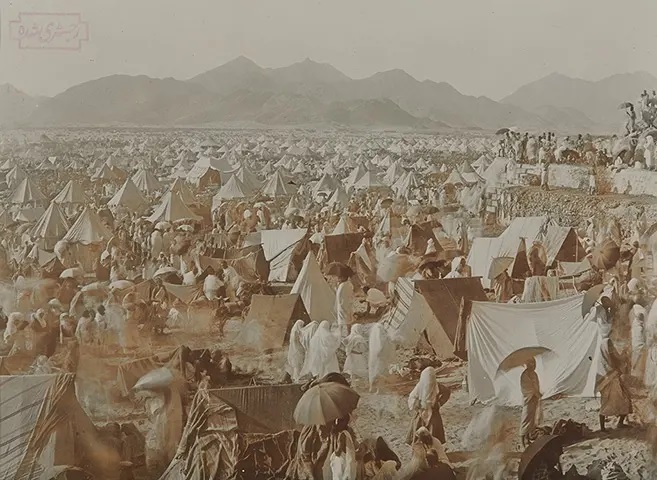
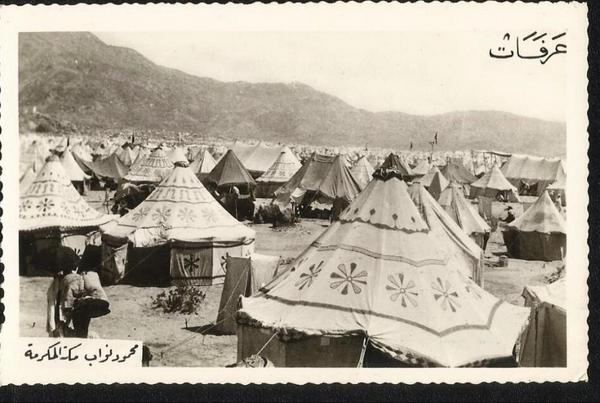

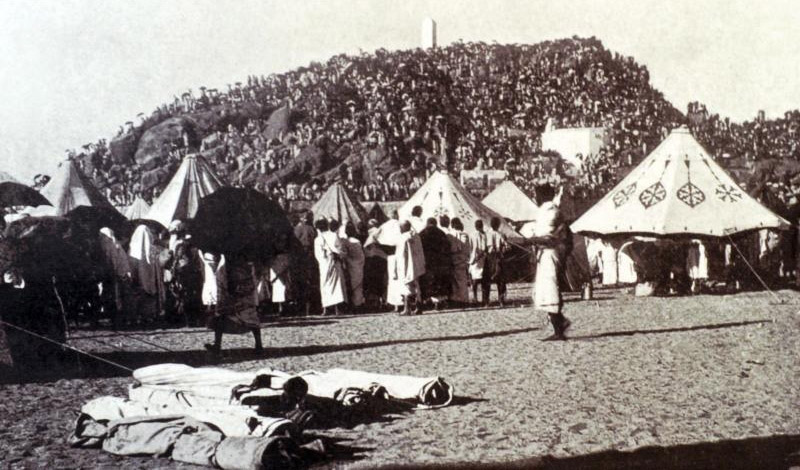
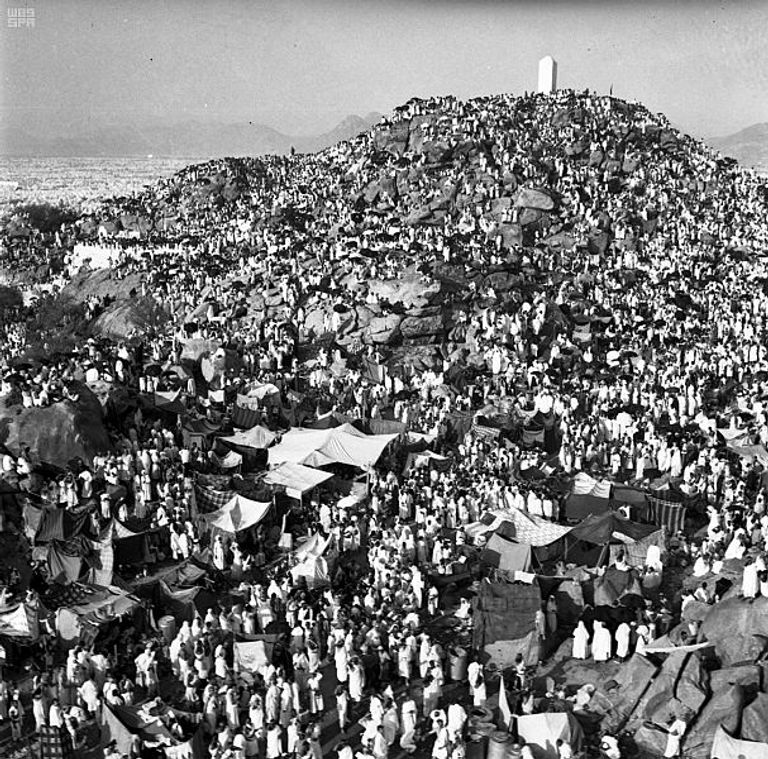
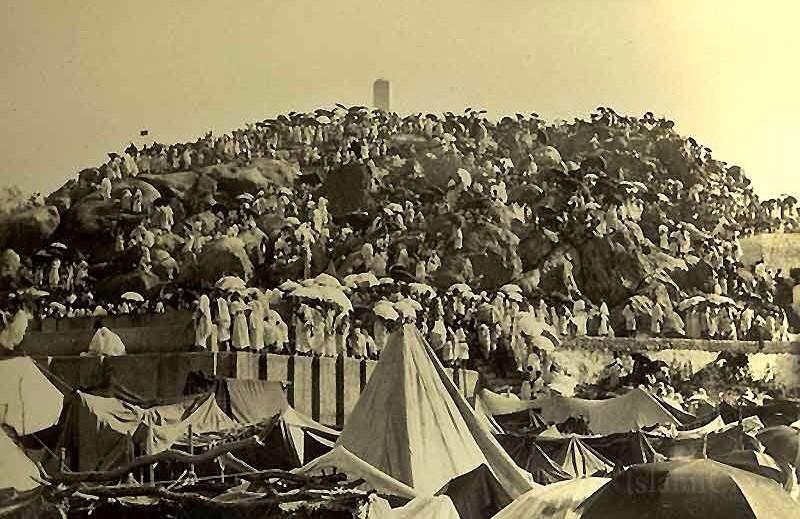
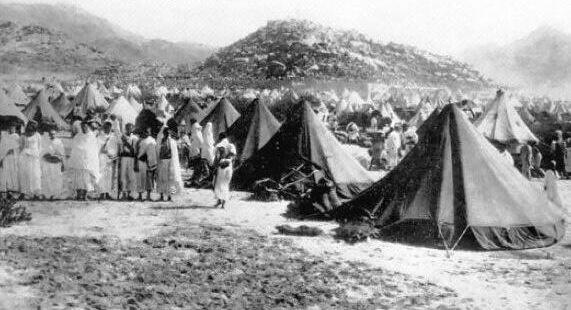
Here’s an old picture of Mount Arafah (also called Mount Rahmah) without the people:
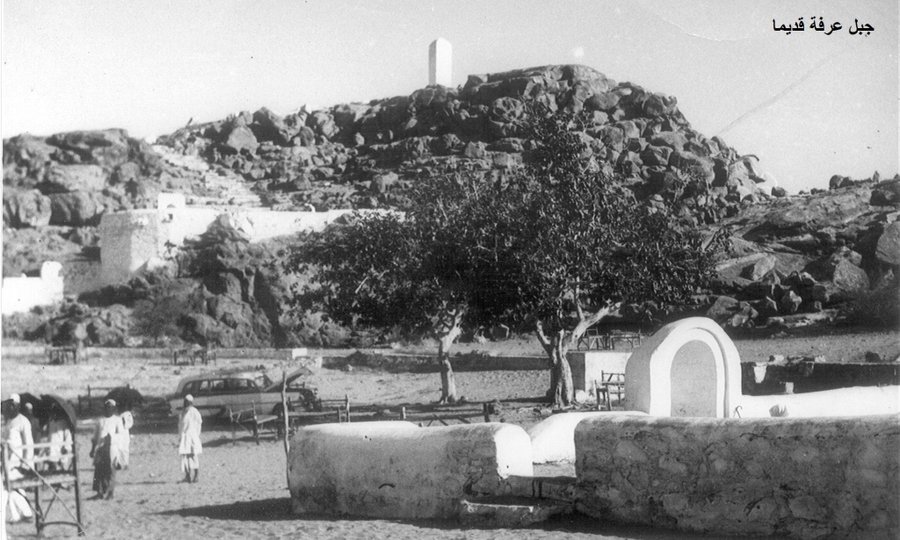
Here’s what Arafah looks like at the present time:
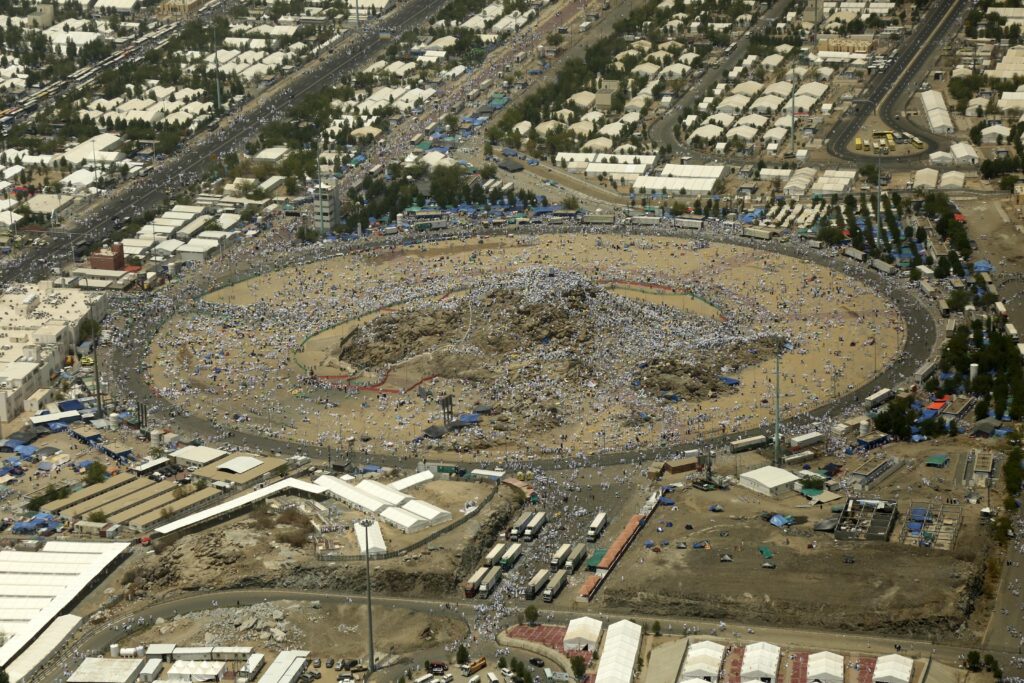
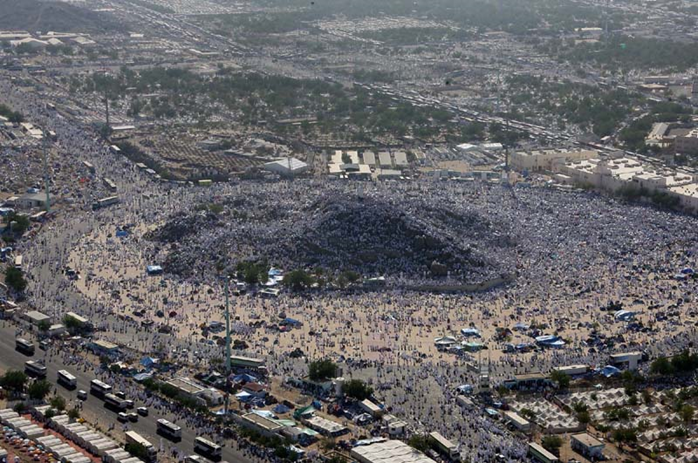
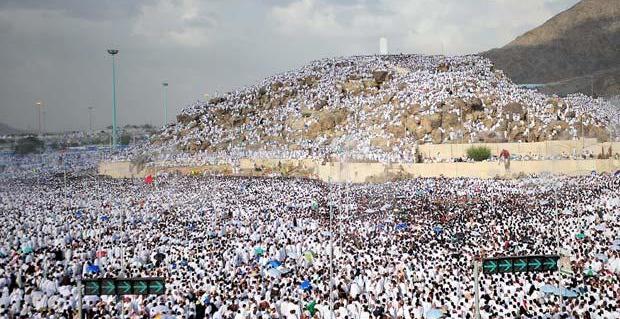
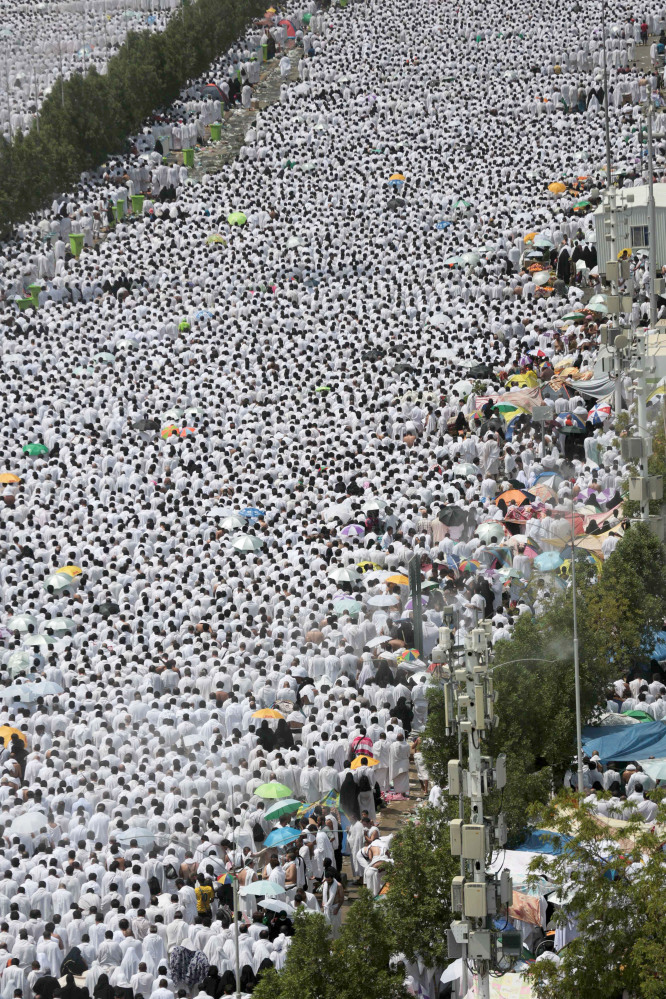
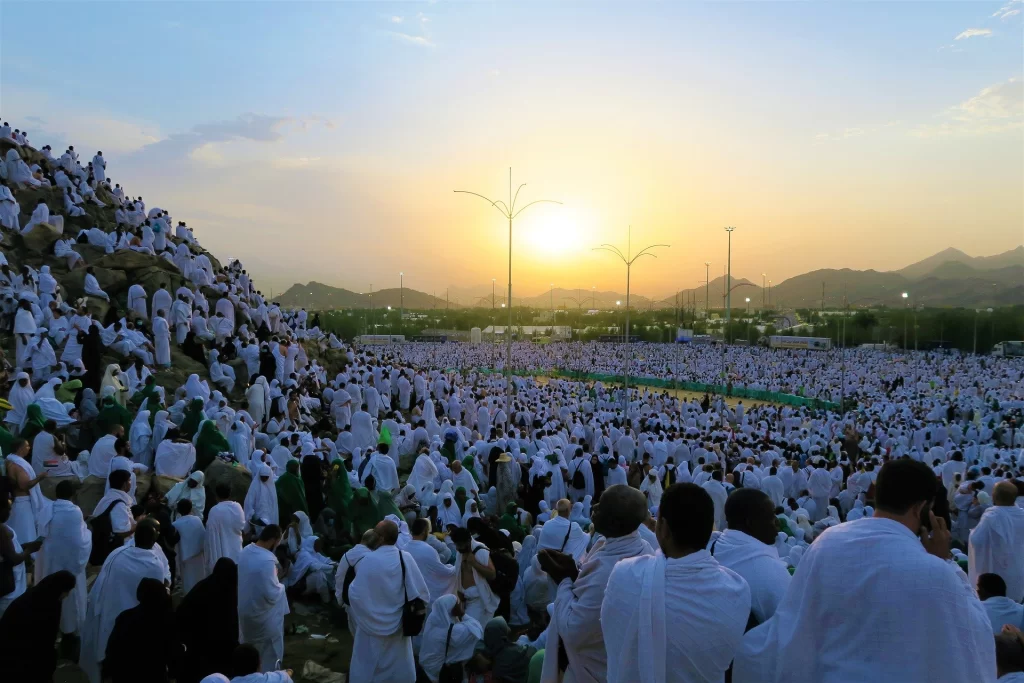
This gathering of people should remind one of the gathering of mankind that will take place on the Last Day. That gathering will take place in Shaam (which includes Syria, Lebanon, Palestine and Jordan), not in Arafah. Please refer to this short article for more details.
Here’s a look at the tents in Arafah.
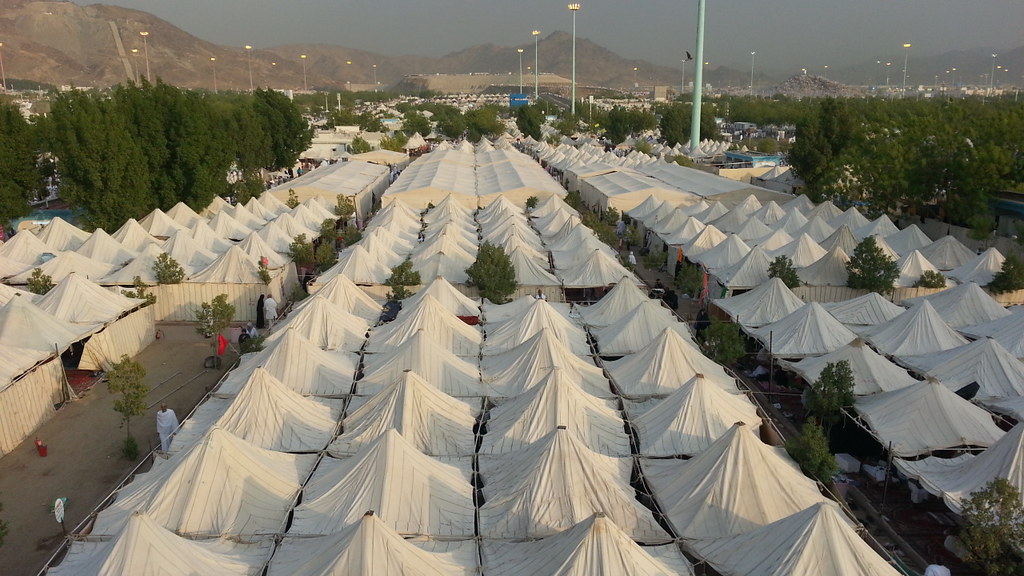
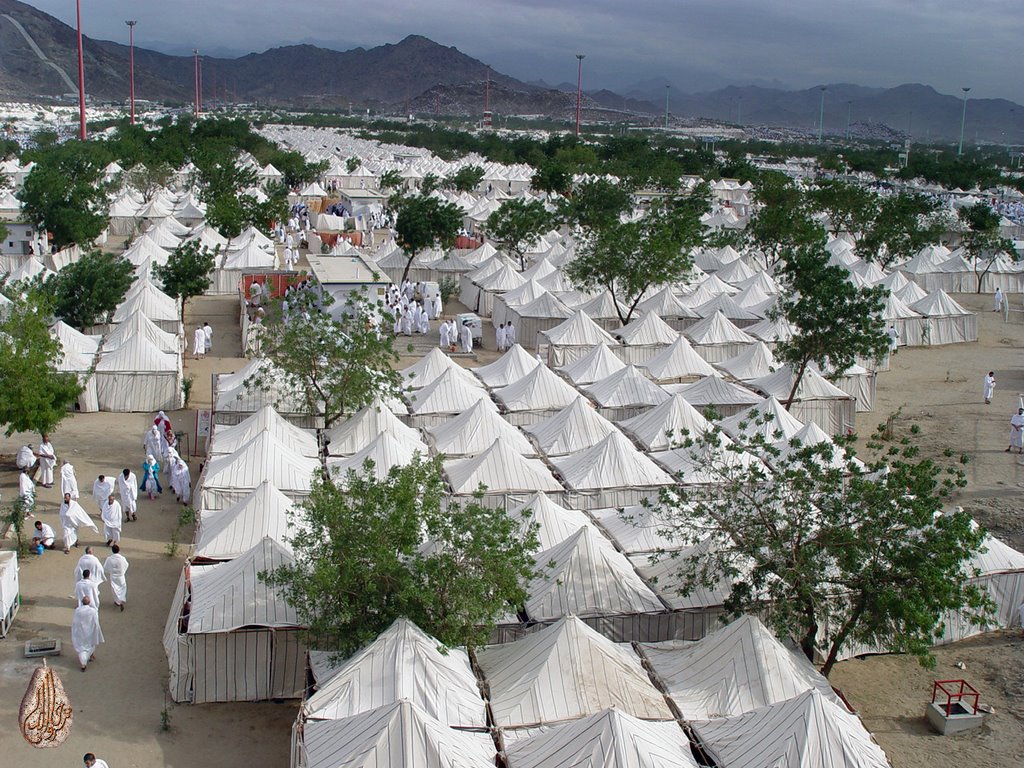
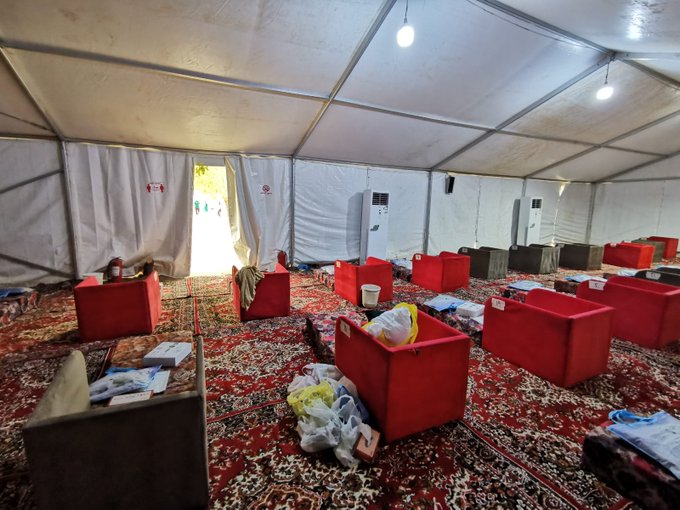
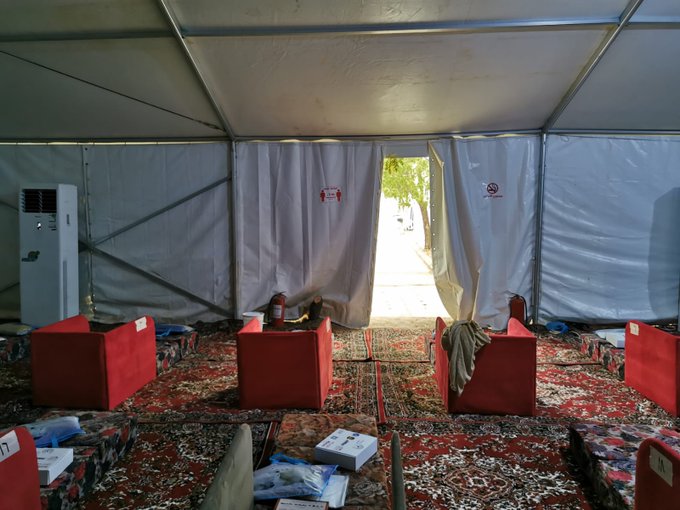
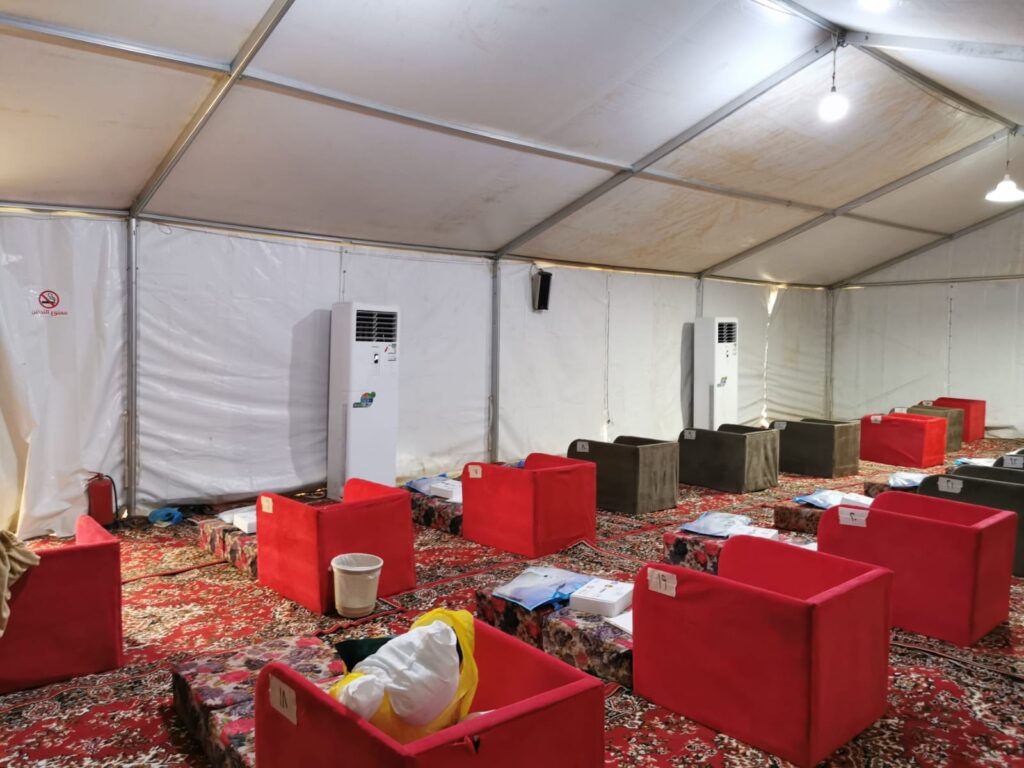
The tents in Arafah are far more simple than the tents in Mina, because the latter tents were made for a stay of about 6 days whereas the former tents are for a stopover of half a day.
5. Combine and shorten the Dhuhr and Asr prayers and pray them at Dhuhr time.
The Prophet (sallallahu alaihi wasallam) combined and shortened both the Dhuhr and Asr prayers and prayed them at Dhuhr time.
عَنِ ابْنِ عُمَرَ، قَالَ غَدَا رَسُولُ اللَّهِ صلى الله عليه وسلم مِنْ مِنًى حِينَ صَلَّى الصُّبْحَ صَبِيحَةَ يَوْمِ عَرَفَةَ حَتَّى أَتَى عَرَفَةَ فَنَزَلَ بِنَمِرَةَ وَهِيَ مَنْزِلُ الإِمَامِ الَّذِي يَنْزِلُ بِهِ بِعَرَفَةَ حَتَّى إِذَا كَانَ عِنْدَ صَلاَةِ الظُّهْرِ رَاحَ رَسُولُ اللَّهِ صلى الله عليه وسلم مُهَجِّرًا فَجَمَعَ بَيْنَ الظُّهْرِ وَالْعَصْرِ ثُمَّ خَطَبَ النَّاسَ ثُمَّ رَاحَ فَوَقَفَ عَلَى الْمَوْقِفِ مِنْ عَرَفَةَ
Ibn Umar (radiallahu anhuma) said the Messenger of Allah (sallallahu alaihi wasallam) proceeded from Mina when he offered the dawn prayer on the Day of Arafah (9th of Dhul Hijjah) in the morning till he came to Arafah and he descended at Namirah. This is the place where the imam (prayer leader at Arafah) takes his place. When the time of the noon prayer came, the Messenger of Allah (sallallahu alaihi wasallam) proceeded earlier and combined the noon and afternoon prayers. He then addressed the people (i.e., recited the sermon) and proceeded. He stationed at a place of stationing in Arafah. [Sunan Abee Dawood, Hadeeth No. 1913. Graded “hasan” (good) by Al-Albani.]
عَنْ نَافِعٍ، أَنَّ عَبْدَ اللَّهِ بْنَ عُمَرَ، كَانَ يُصَلِّي الظُّهْرَ وَالْعَصْرَ وَالْمَغْرِبَ وَالْعِشَاءَ وَالصُّبْحَ بِمِنًى ثُمَّ يَغْدُو إِذَا طَلَعَتِ الشَّمْسُ إِلَى عَرَفَةَ . قَالَ مَالِكٌ وَالأَمْرُ الَّذِي لاَ اخْتِلاَفَ فِيهِ عِنْدَنَا أَنَّ الإِمَامَ لاَ يَجْهَرُ بِالْقُرْآنِ فِي الظُّهْرِ يَوْمَ عَرَفَةَ وَأَنَّهُ يَخْطُبُ النَّاسَ يَوْمَ عَرَفَةَ وَأَنَّ الصَّلاَةَ يَوْمَ عَرَفَةَ إِنَّمَا هِيَ ظُهْرٌ وَإِنْ وَافَقَتِ الْجُمُعَةَ فَإِنَّمَا هِيَ ظُهْرٌ وَلَكِنَّهَا قُصِرَتْ مِنْ أَجْلِ السَّفَرِ . قَالَ مَالِكٌ فِي إِمَامِ الْحَاجِّ إِذَا وَافَقَ يَوْمُ الْجُمُعَةِ يَوْمَ عَرَفَةَ أَوْ يَوْمَ النَّحْرِ أَوْ بَعْضَ أَيَّامِ التَّشْرِيقِ إِنَّهُ لاَ يُجَمِّعُ فِي شَىْءٍ مِنْ تِلْكَ الأَيَّامِ
Nafi narrated that Abdullah ibn Umar (radiallahu anhuma) used to pray dhuhr, asr, maghrib, isha and subh (Fajr) at Mina. Then in the morning, after the sun had risen, he would go to Arafah .
Malik said, “What we are all agreed upon here (in Madinah) is that the imam does not recite the Quran out loud in dhuhr on the day of Arafah, and that he gives a khutbah to the people on that day, and that the prayer on the day of Arafah is really a dhuhr prayer, and even if it coincides with a jumua (Friday) it is still a dhuhr prayer, but one which has been shortened because of travelling.”
Malik said that the imam of the pilgrims should not pray the jumua (Friday) prayer if the day of Arafah, the day of sacrifice or one of the three days after the day of sacrifice, was a Friday. [Muwatta Malik, Narration Numbers 1188-1190 in Muawatta Malik. Here is the online numbering. Shuaib Al-Arnaut has authenticated a narration similar to the one above (about Ibn Umar) in another book of his.]
It is also from the sunnah that a khutbah (sermon) be delivered before the prayer.
عَنْ سَالِمٍ، قَالَ كَتَبَ عَبْدُ الْمَلِكِ إِلَى الْحَجَّاجِ أَنْ لاَ يُخَالِفَ ابْنَ عُمَرَ فِي الْحَجِّ، فَجَاءَ ابْنُ عُمَرَ ـ رضى الله عنه ـ وَأَنَا مَعَهُ يَوْمَ عَرَفَةَ حِينَ زَالَتِ الشَّمْسُ، فَصَاحَ عِنْدَ سُرَادِقِ الْحَجَّاجِ، فَخَرَجَ وَعَلَيْهِ مِلْحَفَةٌ مُعَصْفَرَةٌ فَقَالَ مَا لَكَ يَا أَبَا عَبْدِ الرَّحْمَنِ فَقَالَ الرَّوَاحَ إِنْ كُنْتَ تُرِيدُ السُّنَّةَ. قَالَ هَذِهِ السَّاعَةَ قَالَ نَعَمْ. قَالَ فَأَنْظِرْنِي حَتَّى أُفِيضَ عَلَى رَأْسِي ثُمَّ أَخْرُجَ. فَنَزَلَ حَتَّى خَرَجَ الْحَجَّاجُ، فَسَارَ بَيْنِي وَبَيْنَ أَبِي، فَقُلْتُ إِنْ كُنْتَ تُرِيدُ السُّنَّةَ فَاقْصُرِ الْخُطْبَةَ وَعَجِّلِ الْوُقُوفَ. فَجَعَلَ يَنْظُرُ إِلَى عَبْدِ اللَّهِ، فَلَمَّا رَأَى ذَلِكَ عَبْدُ اللَّهِ قَالَ صَدَقَ
Narrated Salim: Abdul Malik wrote to Al-Hajjaj that he should not differ from Ibn Umar during Hajj. On the Day of Arafah, when the sun declined at midday, Ibn Umar came along with me and shouted near Al- Hajjaj’s cotton (cloth) tent. Al-Hajjaj came out, wrapping himself with a waist-sheet dyed with safflower, and said, “O Abu Abdur-Rahman! What is the matter?” He said, If you want to follow the Sunnah (the tradition of the Prophet (sallallahu alaihi wasallam) then proceed (to Arafah).” Al-Hajjaj asked, “At this very hour?” Ibn Umar said, “Yes.” He replied, “Please wait for me till I pour some water over my head (i.e. take a bath) and come out.” Then Ibn Umar dismounted and waited till Al-Hajjaj came out. So, he (Al-Hajjaj) walked in between me and my father (Ibn Umar). I said to him, “If you want to follow the Sunnah then deliver a brief sermon and hurry up for the stay at Arafah.” He started looking at Abdullah (Ibn Umar) (inquiringly), and when Abdullah noticed that, he said that he had told the truth. [Sahih Al-Bukhari, Volume 2, Hadeeth No. 722]
The Prophet’s (sallallahu alaihi wasallam) khutbah was as follows:
فَأَتَى بَطْنَ الْوَادِي. فَخَطَبَ النَّاسَ وَقَالَ: إِنَّ دِمَاءَكُمْ وَأَمْوَالَكُمْ حَرَامٌ عَلَيْكُمْ، كَحُرْمَةِ يَوْمِكُمْ هذَا، فِي شَهْرِكُمْ هذَا، فِي بَلَدِكُمْ هذَا. أَلاَ كُلُّ شَيْءٍ مِنْ أَمْرِ الْجَاهِلِيَّةِ تَحْتَ قَدَمَيَّ مَوْضُوعٌ، وَدِمَاءُ الْجَاهِلِيَّةِ مَوْضُوعَةٌ، وَإِنَّ أَوَّلَ دَمٍ أَضَعُ مِنْ دِمَائِنَا دَمُ ابْنِ رَبِيعَةَ بْنِ الْحَارِثِ، كَانَ مُسْتَرْضِعاً فِي بَنِي سَعْدٍ فَقَتَلَتْهُ هُذَيْلٌ، وَرِبَا الْجَاهِلِيَّةِ مَوْضُوعٌ، وَأَوَّلُ رِباً أَضَعُ رِبَانَا، رِبَا عَبَّاسِ بْنِ عَبْدِ الْمُطَّلِبِ. فَإِنَّهُ مَوْضُوعٌ كُلُّهُ. فَاتَّقُوا اللّهِ فِي النِّسَاءِ. فَإِنَّكُمْ أَخَذْتُمُوهُنَّ بِأَمَانِ اللّهِ، وَاسْتَحْلَلْتُمْ فُرُوجَهُنَّ بِكَلِمَةِ اللّهِ. وَلَكُمْ عَلَيْهِنَّ أَنْ لاَ يُوطِئْنَ فُرُشَكُمْ أَحَداً تَكْرَهُونَهُ. فَإِنْ فَعَلْنَ ذَلِكَ فَاضْرِبُوهُنَّ ضَرْباً غَيْرَ مُبَرِّحٍ. وَلَهُنَّ عَلَيْكُمْ رِزْقُهُنَّ وَكِسْوَتُهُنَّ بِالْمَعْرُوفِ. وَقَدْ تَرَكْتُ فِيكُمْ مَا لَنْ تَضِلُّوا بَعْدَهُ إِنِ اعْتَصَمْتُمْ بِهِ. كِتَابُ اللّهِ. وَأَنْتُمْ تُسْأَلُونَ عَنِّي. فَمَا أَنْتُمْ قَائِلُونَ؟ قَالُوا: نَشْهَدُ أَنَّكَ قَدْ بَلَّغْتَ وَأَدَّيْتَ وَنَصَحْتَ. فَقَالَ بِإِصْبَعِهِ السَّبَّابَةِ، يَرْفَعُهَا إِلَى السَّمَاءِ وَيَنْكُتُهَا إِلَى النَّاسِ: اللَّهُمَّ اشْهَدْ. اللَّهُمَّ اشْهَدْ. ثَلاَثَ مَرَّاتٍ. ثُمَّ أَذَّنَ. ثُمَّ أَقَامَ فَصَلَّى الظُّهْرَ. ثُمَّ أَقَامَ فَصَلَّى الْعَصْرَ. وَلَمْ يُصَلِّ بَيْنَهُمَا شَيْئاً
Then he came to the bottom of the valley, and addressed the people saying: Verily your blood, your property are as sacred and inviolable as the sacredness of this day of yours, in this month of yours, in this town of yours. Behold! Everything pertaining to the Days of Ignorance is under my feet completely abolished. Abolished are also the blood-revenges of the Days of Ignorance. The first claim of ours on blood-revenge which I abolish is that of the son of Rabia ibn al-Harith, who was nursed among the tribe of Sad and killed by Hudhail. And the riba of the pre-Islamic period is abolished, and the first of our riba I abolish is that of Abbas ibn Abdil-Muttalib, for it is all abolished. Fear Allah concerning women! Verily you have taken them on the security of Allah, and intercourse with them has been made lawful unto you by words of Allah. You too have right over them, and that they should not allow anyone to sit on your bed whom you do not like. But if they do that, you can chastise them but not severely. Their rights upon you are that you should provide them with food and clothing in a fitting manner. I have left among you the Book of Allah, and if you hold fast to it, you would never go astray. And you would be asked about me (on the Day of Resurrection), (now tell me) what would you say?
They (the audience) said: We will bear witness that you have conveyed (the message), discharged (the ministry of Prophethood) and given wise (sincere) counsel. He (the narrator) said: He (the Prophet) then raised his forefinger towards the sky and pointing it at the people (said):” O Allah, be witness. 0 Allah, be witness,” saying it thrice. (Bilal then) pronounced Adhan and later on Iqamah and he (the Prophet) led the noon prayer. He (Bilal) then uttered Iqamah and he (the Prophet) led the afternoon prayer and he observed no other prayer in between the two. [Sahih Muslim, Hadeeth No. 2803]
عَنْ سُلَيْمَانَ بْنِ عَمْرِو بْنِ الأَحْوَصِ، عَنْ أَبِيهِ، قَالَ سَمِعْتُ النَّبِيَّ ـ صلى الله عليه وسلم ـ يَقُولُ فِي حَجَّةِ الْوَدَاعِ : يَا أَيُّهَا النَّاسُ أَلاَ أَىُّ يَوْمٍ أَحْرَمُ . ثَلاَثَ مَرَّاتٍ قَالُوا يَوْمُ الْحَجِّ الأَكْبَرِ . قَالَ : فَإِنَّ دِمَاءَكُمْ وَأَمْوَالَكُمْ وَأَعْرَاضَكُمْ بَيْنَكُمْ حَرَامٌ كَحُرْمَةِ يَوْمِكُمْ هَذَا فِي شَهْرِكُمْ هَذَا فِي بَلَدِكُمْ هَذَا أَلاَ لاَ يَجْنِي جَانٍ إِلاَّ عَلَى نَفْسِهِ وَلاَ يَجْنِي وَالِدٌ عَلَى وَلَدِهِ وَلاَ مَوْلُودٌ عَلَى وَالِدِهِ . أَلاَ إِنَّ الشَّيْطَانَ قَدْ أَيِسَ أَنْ يُعْبَدَ فِي بَلَدِكُمْ هَذَا أَبَدًا وَلَكِنْ سَيَكُونُ لَهُ طَاعَةٌ فِي بَعْضِ مَا تَحْتَقِرُونَ مِنْ أَعْمَالِكُمْ فَيَرْضَى بِهَا أَلاَ وَكُلُّ دَمٍ مِنْ دِمَاءِ الْجَاهِلِيَّةِ مَوْضُوعٌ وَأَوَّلُ مَا أَضَعُ مِنْهَا دَمُ الْحَارِثِ بْنِ عَبْدِ الْمُطَّلِبِ – كَانَ مُسْتَرْضِعًا فِي بَنِي لَيْثٍ فَقَتَلَتْهُ هُذَيْلٌ – أَلاَ وَإِنَّ كُلَّ رِبًا مِنْ رِبَا الْجَاهِلِيَّةِ مَوْضُوعٌ لَكُمْ رُءُوسُ أَمْوَالِكُمْ لاَ تَظْلِمُونَ وَلاَ تُظْلَمُونَ أَلاَ يَا أُمَّتَاهُ هَلْ بَلَّغْتُ . ثَلاَثَ مَرَّاتٍ قَالُوا نَعَمْ . قَالَ : اللَّهُمَّ اشْهَدْ . ثَلاَثَ مَرَّاتٍ
عَنْ جَابِرِ بْنِ عَبْدِ اللَّهِ، قَالَ رَأَيْتُ رَسُولَ اللَّهِ صلى الله عليه وسلم فِي حَجَّتِهِ يَوْمَ عَرَفَةَ وَهُوَ عَلَى نَاقَتِهِ الْقَصْوَاءِ يَخْطُبُ فَسَمِعْتُهُ يَقُولُ : يَا أَيُّهَا النَّاسُ إِنِّي قَدْ تَرَكْتُ فِيكُمْ مَا إِنْ أَخَذْتُمْ بِهِ لَنْ تَضِلُّوا كِتَابَ اللَّهِ وَعِتْرَتِي أَهْلَ بَيْتِي
In today’s time, the iman gives the khutbah from Masjid Namirah. Here’s what it looked liked in the past.
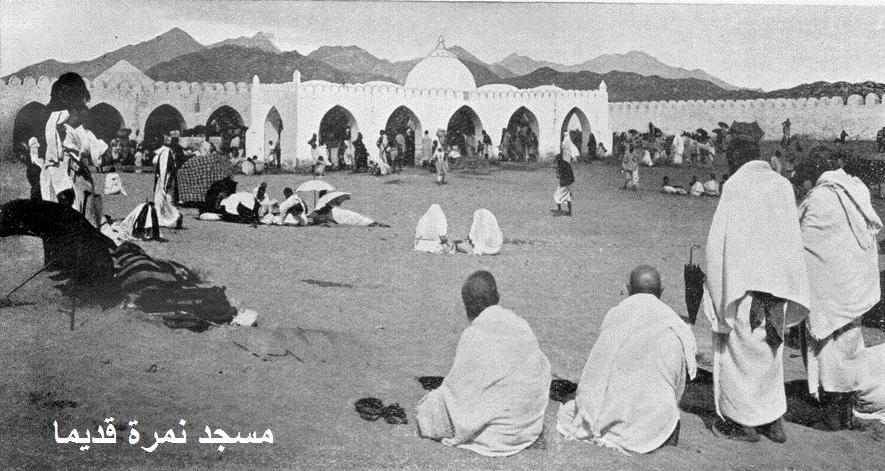
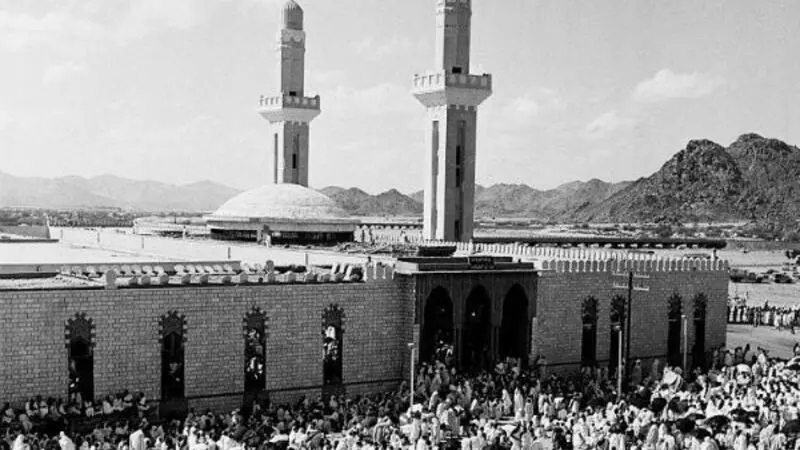
Here is what it looks like in the present time:
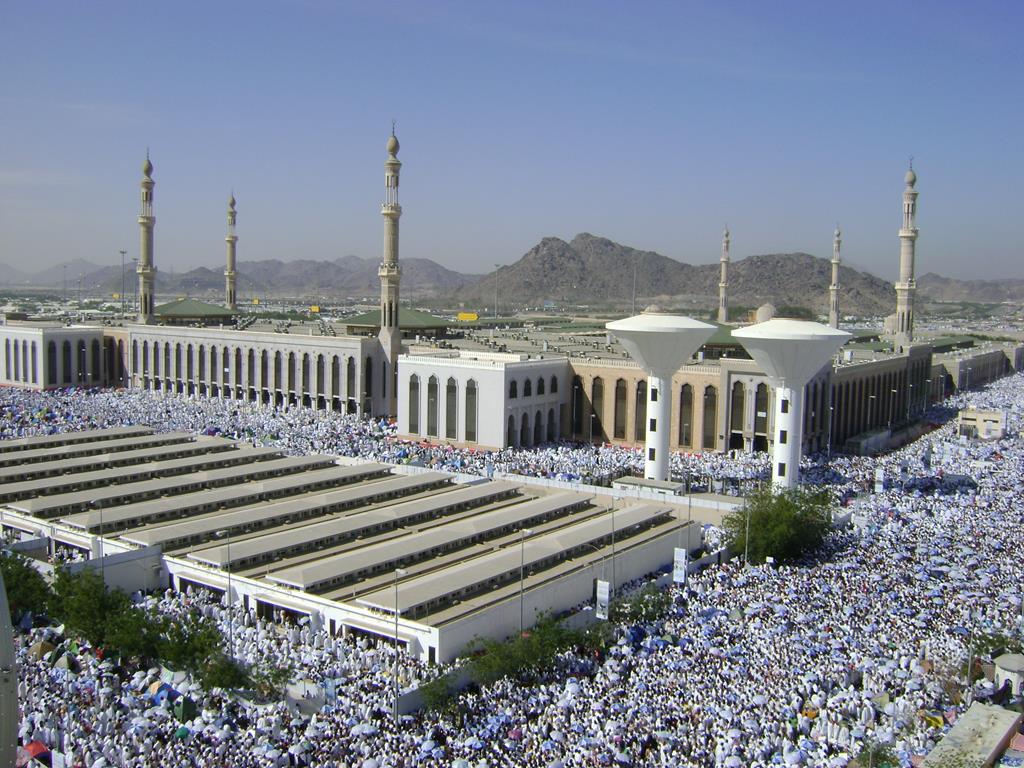
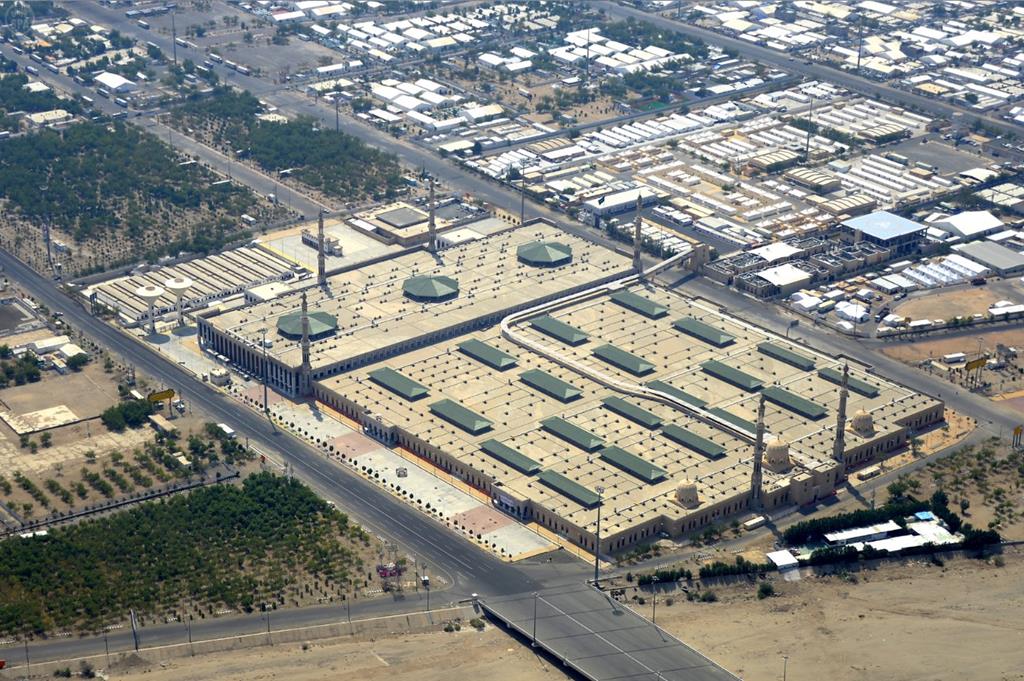
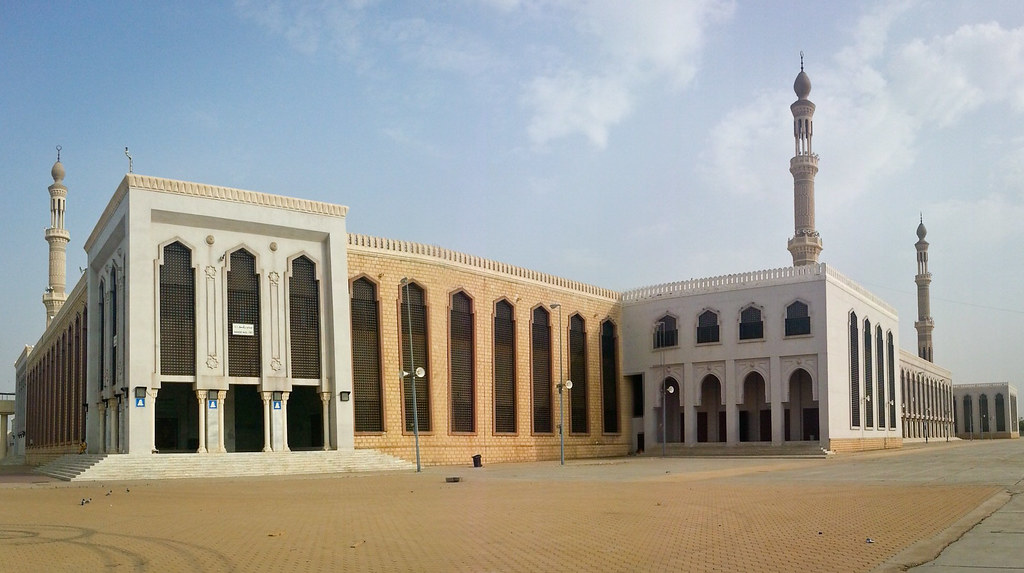
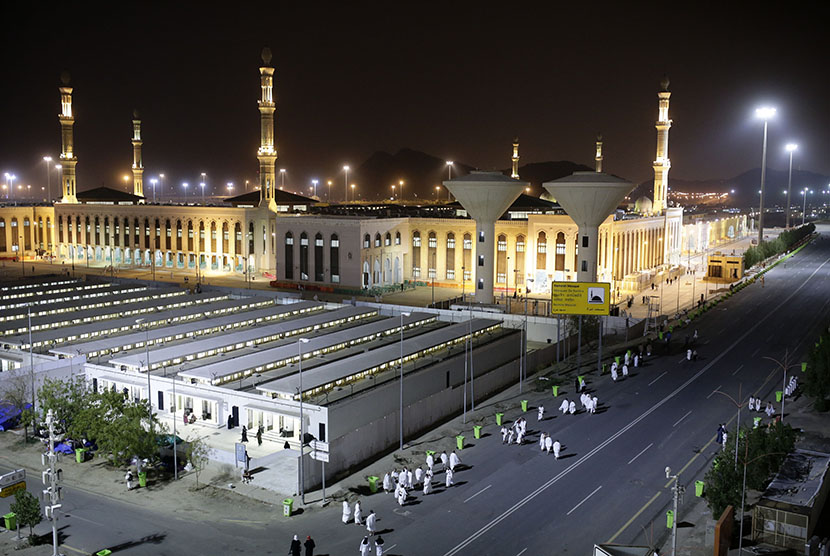
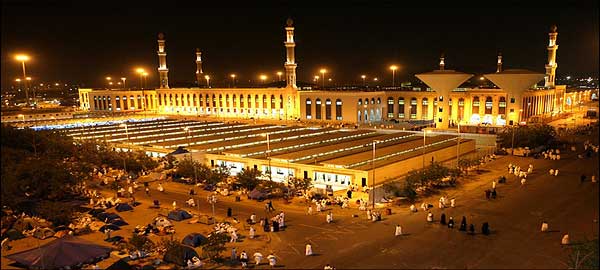
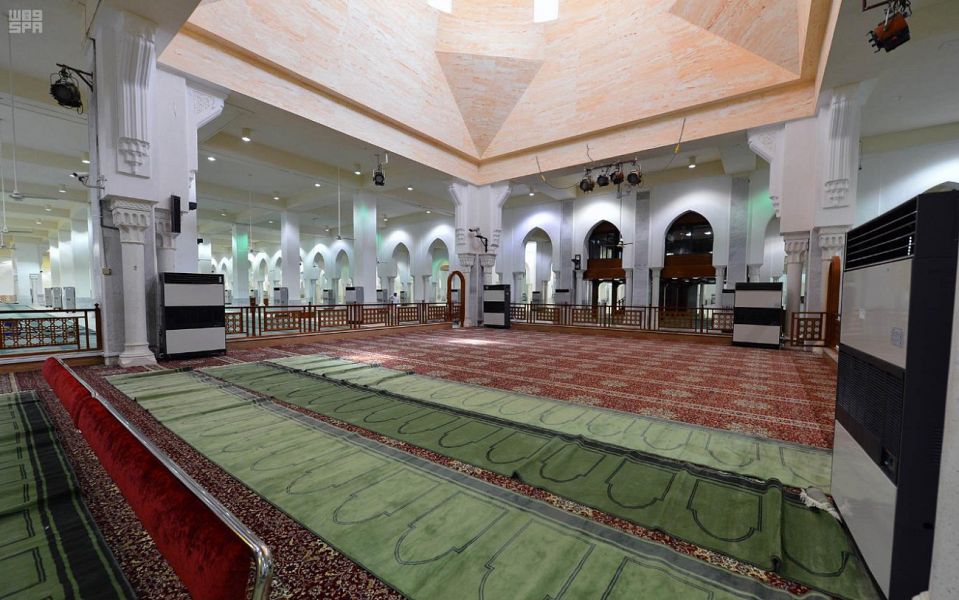
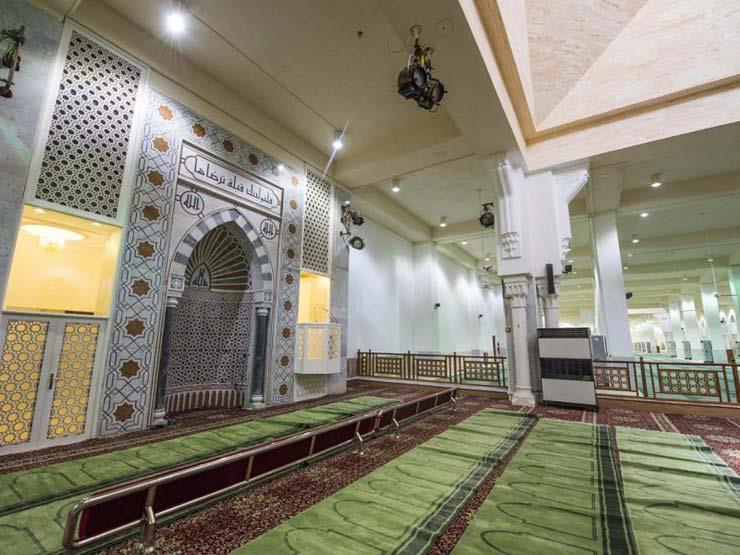
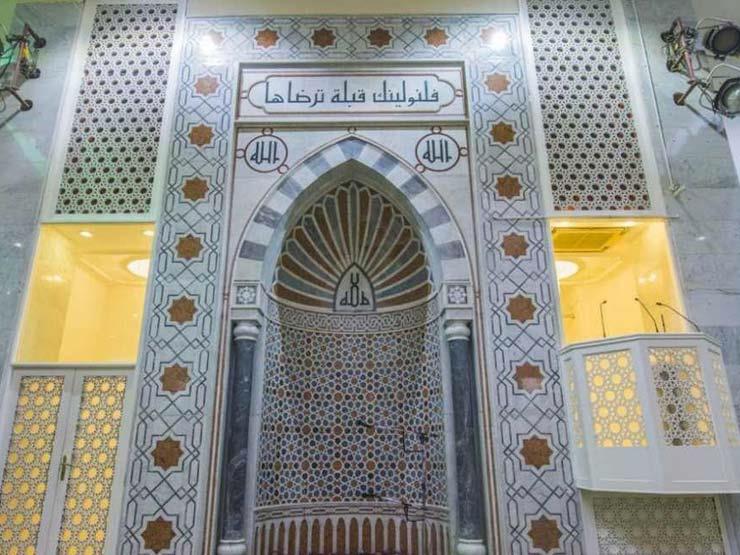
After a recent expansion, parts of this masjid fell outside of the bounds of Arafah so make sure you are not in those parts after the prayer and sunrise!
One could listen to the khutbah (sermon) from their tents through the livestream. Here’s a khutbah from 1975:
Here’s part of the khutbah from 2011:
A word of warning: A recent Arafah khutbah delivered by a new gentleman had some issues. He spoke about “interfaith harmony”, it appears.
Islam is the religion of tawheed (worshipping Allah alone) whereas all the other religions are religions of shirk (attributing partners to Allah) and kufr (disbelief). We cannot treat Islam like the other religions. Believing in Islam means one disbelieves in every other religion or belief system. Tawheed and shirk can never exist in the same heart.
We need to call the disbelievers to the truth and also give them their rights and treat them properly. We should NOT refer to them as “brothers and sisters” nor treat their religions as though they are true rather we are supposed to CALL them to Islam. True harmony is in accepting and practicing Islam, not equating all the religions.
So, when listening to the khutbah of Arafah, one needs to be careful, because it might be delivered by one not grounded in aqeedah (creed).
6. Stay in Arafah remembering Allah until sunset
One needs to stay in Arafah until sunset. If one leaves before sunset, one needs to offer a ransom as they have left an obligatory act.
All of Arafah is a standing place except the valley of Uranah.
عَنْ جَابِرٍ، فِي حَدِيثِهِ ذَلِكَ أَنَّ رَسُولَ اللَّهِ صلى الله عليه وسلم قَالَ : نَحَرْتُ هَا هُنَا وَمِنًى كُلُّهَا مَنْحَرٌ فَانْحَرُوا فِي رِحَالِكُمْ وَوَقَفْتُ هَا هُنَا وَعَرَفَةُ كُلُّهَا مَوْقِفٌ وَوَقَفْتُ هَا هُنَا وَجَمْعٌ كُلُّهَا مَوْقِفٌ
Jabir (radiallahu anhu) reported Allah’s Messenger (sallallahu alaihi wasallam) as saying: I have sacrificed (the animals) here, and the whole of Mina is a place for sacrifice; so sacrifice your animals at your places. 1 have stayed here (near these rocks), and the whole of Arafah is a place for stay. And I have stayed here (at Muzdalifah near Mashar al-Haram and the whole of Muzdalifah) is a place for stay (i. e. one is permitted to spend night in any part of it, as one likes). [Sahih Muslim, Hadeeth, No. 2805]
عَنْ جَابِر بْن عَبْدِ اللَّهِ، أَنَّ رَسُولَ اللَّهِ صلى الله عليه وسلم قَالَ : كُلُّ عَرَفَةَ مَوْقِفٌ وَكُلُّ مِنًى مَنْحَرٌ وَكُلُّ الْمُزْدَلِفَةِ مَوْقِفٌ وَكُلُّ فِجَاجِ مَكَّةَ طَرِيقٌ وَمَنْحَرٌ
عَنْ جَابِرِ بْنِ عَبْدِ اللَّهِ، قَالَ قَالَ رَسُولُ اللَّهِ ـ صلى الله عليه وسلم : كُلُّ عَرَفَةَ مَوْقِفٌ وَارْفَعُوا عَنْ بَطْنِ عُرَنَةَ وَكُلُّ الْمُزْدَلِفَةِ مَوْقِفٌ وَارْفَعُوا عَنْ بَطْنِ مُحَسِّرٍ وَكُلُّ مِنًى مَنْحَرٌ إِلاَّ مَا وَرَاءَ الْعَقَبَةِ
This is what the valley of Uranah seems to look like:
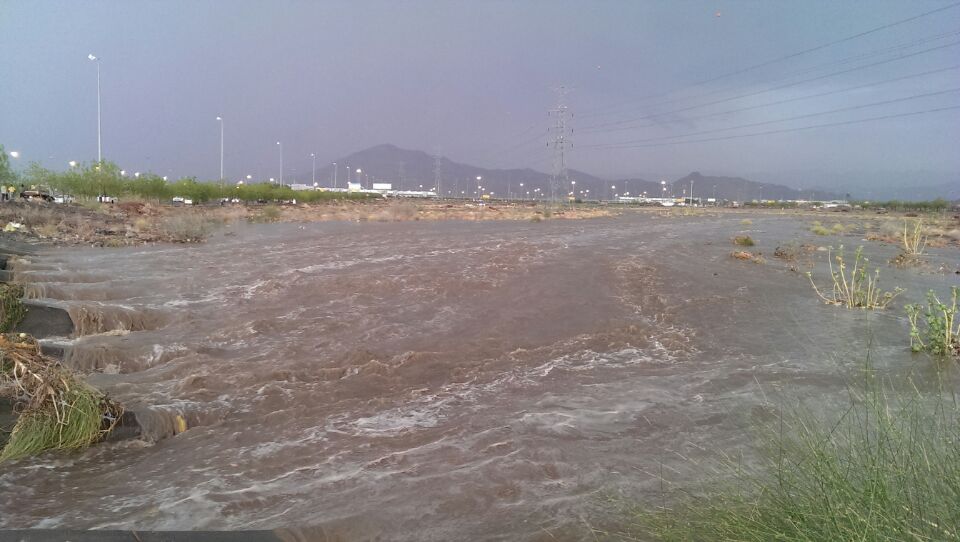
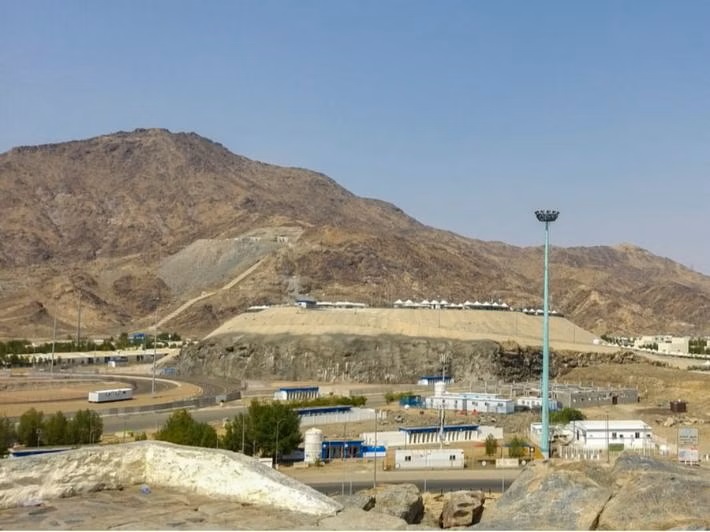
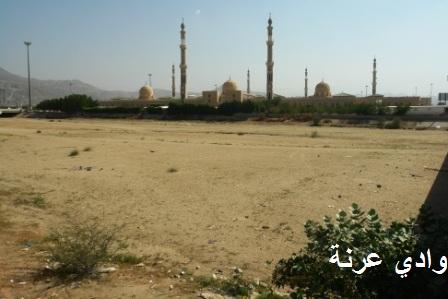
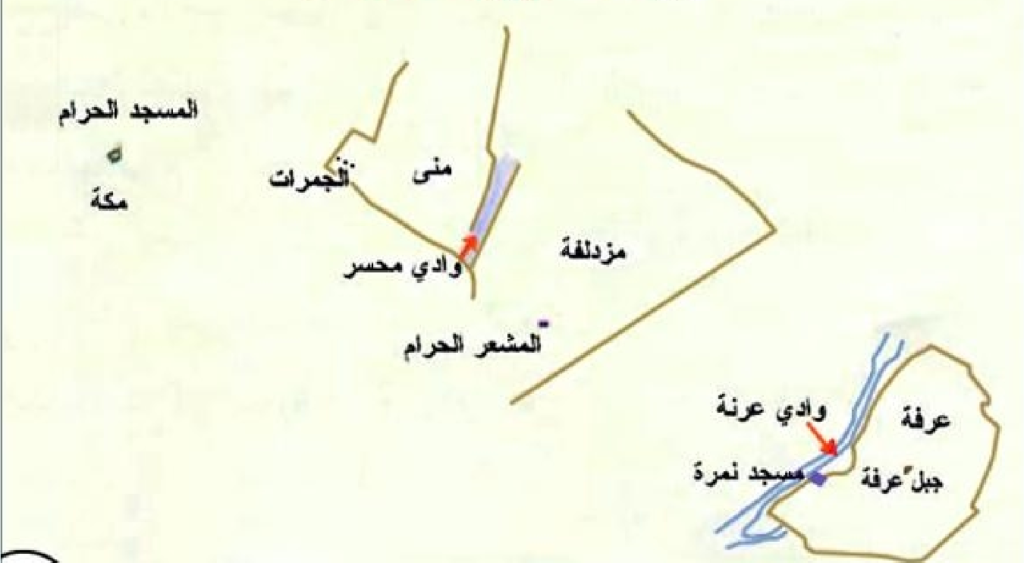
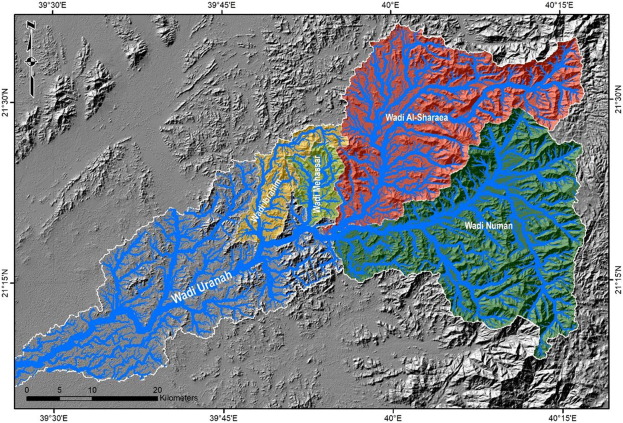
There are signposts indicating the beginning and end of Arafah so make sure you stay within that area.
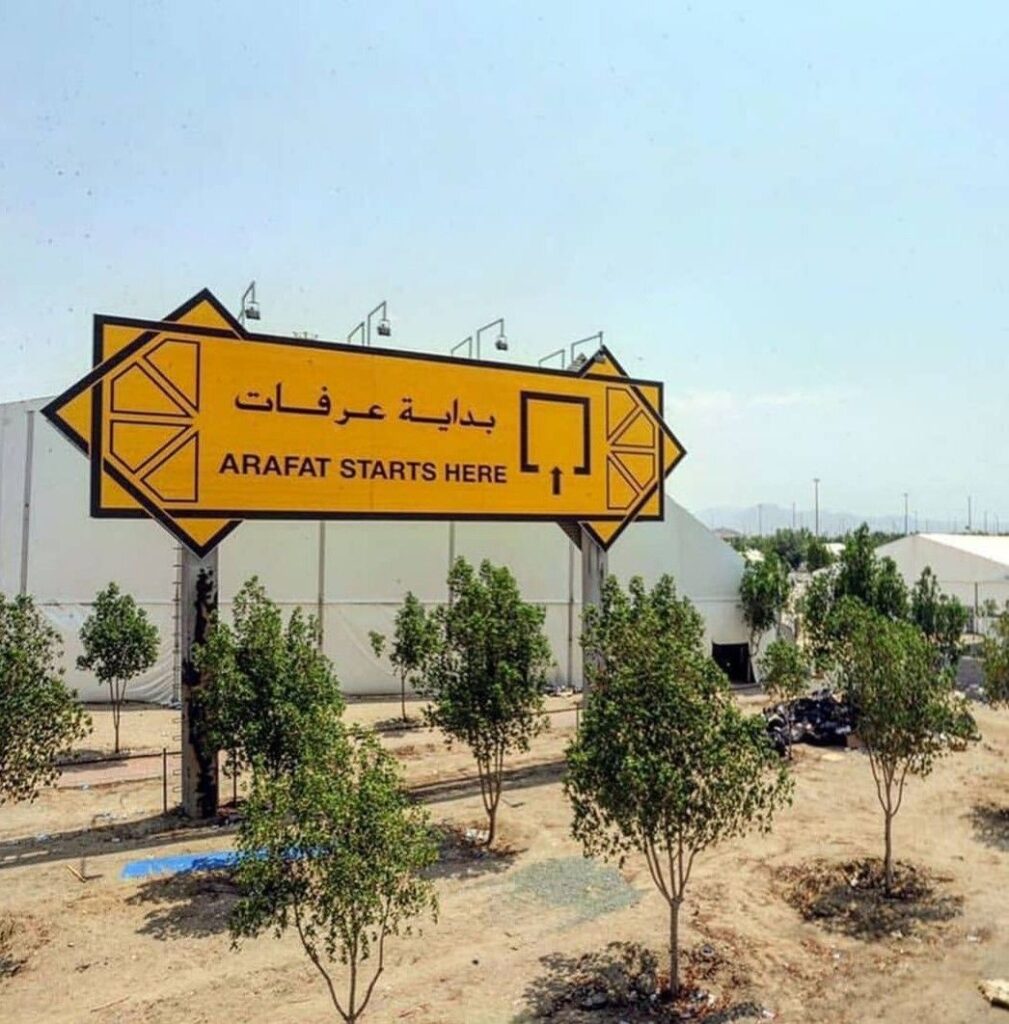
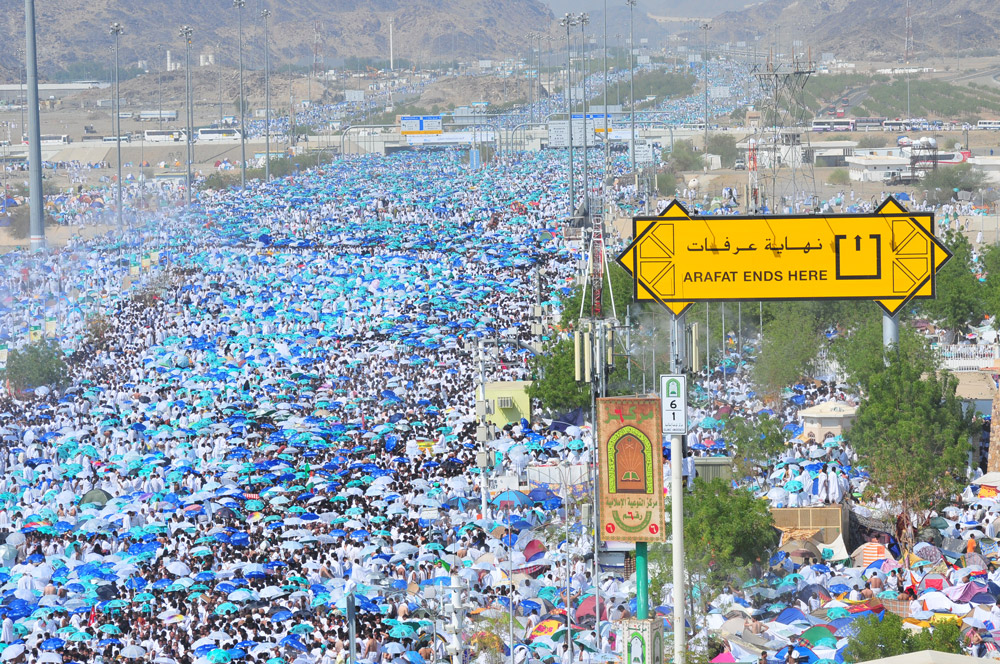
Many people go stand on Jabal Rahmah (Mount Rahmah) also known as Mount Arafat. This is what it looks like with and without people.
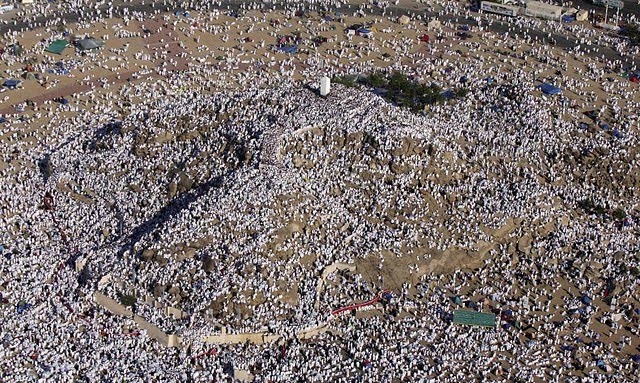
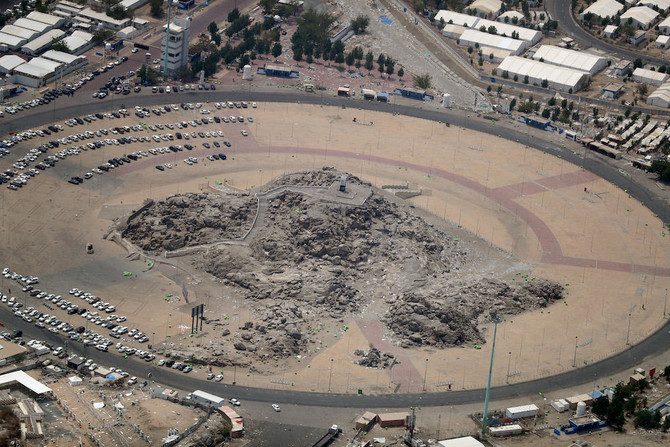
However, is it recommended to climb this mountain and stand on it on the Day of Arafah? No, one is not required to climb it. Please refer to this article for more details.
What does one need to do on this great day? Well, one needs to remember Allah. So one should keep reciting the talbiyah. Also, as this day is one of the ten days of Dhul Hijjah, one needs to recite the takbeer as well.
The day of Arafah also has a special supplication to be recited in it so one needs to keep reciting it as well.
عَنْ عَمْرِو بْنِ شُعَيْبٍ، عَنْ أَبِيهِ، عَنْ جَدِّهِ، أَنَّ النَّبِيَّ صلى الله عليه وسلم قَالَ : خَيْرُ الدُّعَاءِ دُعَاءُ يَوْمِ عَرَفَةَ وَخَيْرُ مَا قُلْتُ أَنَا وَالنَّبِيُّونَ مِنْ قَبْلِي لاَ إِلَهَ إِلاَّ اللَّهُ وَحْدَهُ لاَ شَرِيكَ لَهُ لَهُ الْمُلْكُ وَلَهُ الْحَمْدُ وَهُوَ عَلَى كُلِّ شَيْءٍ قَدِيرٌ
Amr ibn Shuaib narrated from his father, from his grandfather, that the Prophet (sallallahu alaihi wasallam) said: “The best of supplication is the supplication of the Day of Arafah. And the best of what I and the Prophets before me have said is: None has the right to be worshipped but Allah, Alone, without partner, to Him belongs all that exists, and to Him belongs the Praise, and He is powerful over all things. (Lā ilāha illallāh, waḥdahu lā sharīka lahu, lahul-mulku wa lahul-ḥamdu, wa huwa `alā kulli shai’in qadīr).’” [Jaami At-Tirmidhi, Hadeeth No. 3585. Graded “hasan” (good) by Al-Albani.]
Some narrations mention an addition to this dua but they all seem to be weak.
Here are some benefits from this dua.
One can alternate between all three (this dua, the tabkeer and the talbiyah). If it is a Friday, one should also invoke blessings on the Prophet (sallallahu alaihi wasallam).
عَنْ أَوْسِ بْنِ أَوْسٍ، قَالَ قَالَ رَسُولُ اللَّهِ صلى الله عليه وسلم : إِنَّ مِنْ أَفْضَلِ أَيَّامِكُمْ يَوْمَ الْجُمُعَةِ فِيهِ خُلِقَ آدَمُ وَفِيهِ قُبِضَ وَفِيهِ النَّفْخَةُ وَفِيهِ الصَّعْقَةُ فَأَكْثِرُوا عَلَىَّ مِنَ الصَّلاَةِ فِيهِ فَإِنَّ صَلاَتَكُمْ مَعْرُوضَةٌ عَلَىَّ . قَالَ قَالُوا يَا رَسُولَ اللَّهِ وَكَيْفَ تُعْرَضُ صَلاَتُنَا عَلَيْكَ وَقَدْ أَرِمْتَ يَقُولُونَ بَلِيتَ . فَقَالَ : إِنَّ اللَّهَ عَزَّ وَجَلَّ حَرَّمَ عَلَى الأَرْضِ أَجْسَادَ الأَنْبِيَاءِ
Narrated Aws ibn Aws (radiallahu anhu): The Prophet (sallallahu alaihi wasallam) said: Among the most excellent of your days is Friday; on it Adam was created, on it he died, on it the last trumpet will be blown, and on it the shout will be made, so invoke more blessings on me that day, for your blessings will be submitted to me. The people asked: Messenger of Allah, how can it be that our blessings will be submitted to you while your body is decayed? He replied: Allah, the Exalted, has prohibited the earth from consuming the bodies of Prophets. [Sunan Abee Dawood, Hadeeth No. 1047. Graded “sahih” (authentic) by Al-Albani.]
Here’s how to send blessings on the Prophet (sallallahu alaihi wasallam).
One should also recite the Quran and remember to recite the evening remembrance. Apart from this, one should do a lot of dua (supplication) (especially in the latter part of the day) and seek forgiveness as this is a time when dua is accepted.
عَنْ عَطَاءٍ، قَالَ قَالَ أُسَامَةُ بْنُ زَيْدٍ كُنْتُ رَدِيفَ النَّبِيِّ صلى الله عليه وسلم بِعَرَفَاتٍ فَرَفَعَ يَدَيْهِ يَدْعُو فَمَالَتْ بِهِ نَاقَتُهُ فَسَقَطَ خِطَامُهَا فَتَنَاوَلَ الْخِطَامَ بِإِحْدَى يَدَيْهِ وَهُوَ رَافِعٌ يَدَهُ الأُخْرَى
Ataa narrated that Usaamah bin Zaid (radiallahu anhuma) said: “I was a companion rider with the Prophet (sallallahu alaihi wasallam) at Arafat. He raised his hands in supplication, so his she-camel began leaning and he dropped her halter, so he took the halter with one of his hands while he was raising the other hand.” [Sunan An-Nasai, Hadeeth No. 3014. Al-Albani said that its isnaad (chain of narrators) was “sahih” (authentic).]
If it is a Friday, then the time between Asr and Maghrib is always a time when dua is accepted meaning that two times (when dua is accepted) are coinciding.
عَنْ أَنَسِ بْنِ مَالِكٍ، عَنِ النَّبِيِّ صلى الله عليه وسلم أَنَّهُ قَالَ : الْتَمِسُوا السَّاعَةَ الَّتِي تُرْجَى فِي يَوْمِ الْجُمُعَةِ بَعْدَ الْعَصْرِ إِلَى غَيْبُوبَةِ الشَّمْسِ
Anas ibn Malik (radiallahu anhu) narrated that the Prophet (sallallahu alaihi wasallam) said: “Seek out the hour that is hoped for on Friday after Asr until the sun has set.” [Jaami At-Tirmidhi, Hadeeth No. 489. Graded “hasan” (good) by Al-Albani.]
One could make a dua list of all things they want (starting with the Pleasure of Allah and Paradise obviously) prepared beforehand. Dua has certain etiquettes so one should try to follow that. Here’s a lovely compilation of the manners of dua.
One needs to keep remembering Allah until sunset and then head for Muzdalifah after that. This is one of the most important days of your life so don’t be lax. Remember how you were in the last ten nights of Ramadan and try to push yourself that way again.
Menstruating women should also make sure to keep supplicating. Do not get lazy simply because you think that you are “off”.
What if one is unable to make it to Arafah before sunset? Well, the last time to reach Arafah, for one’s Hajj to be valid, is before the break of dawn on the 10th of Dhul Hijjah.
عَنْ عَبْدِ الرَّحْمَنِ بْنِ يَعْمَرَ، قَالَ شَهِدْتُ رَسُولَ اللَّهِ صلى الله عليه وسلم فَأَتَاهُ نَاسٌ فَسَأَلُوهُ عَنِ الْحَجِّ فَقَالَ رَسُولُ اللَّهِ صلى الله عليه وسلم : الْحَجُّ عَرَفَةُ فَمَنْ أَدْرَكَ لَيْلَةَ عَرَفَةَ قَبْلَ طُلُوعِ الْفَجْرِ مِنْ لَيْلَةِ جَمْعٍ فَقَدْ تَمَّ حَجُّهُ .
It was narrated that Abdur-Rahman bin Yamur (radiallahu anhu) said: “I saw the Messenger of Allah when people came to him and asked him about Hajj. The Messenger of Allah (sallallahu alaihi wasallam) said: ‘Hajj is Arafah. Whoever catches up with the night of Arafah before dawn comes on the night of Jam (Al-Muzdalifah), his Hajj is complete.’” [Sunan An-Nasai, Hadeeth No. 3019. Graded “sahih” (authentic) by Al-Albani.]
عَنْ عَبْدِ الرَّحْمَنِ بْنِ يَعْمَرَ، قَالَ قَالَ رَسُولُ اللَّهِ صلى الله عليه وسلم : الْحَجُّ عَرَفَاتٌ الْحَجُّ عَرَفَاتٌ الْحَجُّ عَرَفَاتٌ أَيَّامُ مِنًى ثَلاَثٌ (فَمَنْ تَعَجَّلَ فِي يَوْمَيْنِ فَلاَ إِثْمَ عَلَيْهِ وَمَنْ تَأَخَّرَ فَلاَ إِثْمَ عَلَيْهِ ) وَمَنْ أَدْرَكَ عَرَفَةَ قَبْلَ أَنْ يَطْلُعَ الْفَجْرُ فَقَدْ أَدْرَكَ الْحَجَّ
فَمَن تَعَجَّلَ فِي يَوْمَيْنِ فَلَا إِثْمَ عَلَيْهِ وَمَن تَأَخَّرَ فَلَا إِثْمَ عَلَيْهِ
But whosoever hastens to leave in two days, there is no sin on him and whosoever stays on, there is no sin on him. [Surah Al-Baqarah (2) : 203]
And whoever sees (attends) Arafah before the rising of Fajr, then he has performed the Hajj.” [Jaami At-Tirmidhi, Hadeeth No. 2975. Graded “sahih” (authentic) by Al-Albani.]
Shaikh Saleh Al-Fawzan stated in “A Summary of Islamic Jurisprudence – Part 1” that the one who arrived in Arafah at night (i.e. after sunset) can stay for any length of time, even if for only a moment based on the above hadeeth. However, the one who arrived in Arafah at daytime is obliged to stay until sunset.
7. After sunset, proceed to Muzdalifah calmly
One needs to head for Muzdalifah after sunset and also remember to keep reciting the talbiyah.
فَلَمْ يَزَلْ وَاقِفاً حَتَّى غَرَبَتِ الشَّمْسُ. وَذَهَبَتِ الصُّفْرَةُ قَلِيلاً حَتَّى غَابَ الْقُرْصُ. وَأَرْدَفَ أُسَامَةَ خَلْفَهُ. وَدَفَعَ رَسُولُ اللّهِ وَقَدْ شَنَقَ لِلْقَصْوَاءِ الزِّمَامَ. حَتَّى إِنَّ رَأْسَهَا لَيُصِيبُ مَوْرِكَ رَحْلِهِ. وَيَقُولُ بِيَدِهِ الْيُمْنَى: أَيُّهَا النَّاسُ السَّكِينَةَ السَّكِينَةَ. كُلَّمَا أَتَى حَبْلاً مِنَ الْحِبَالِ أَرْخَى لَهَا قَليلاً.حَتَّى تَصْعَدَ. حَتَّى أَتَى الْمُزْدَلِفَةَ
He kept standing there until the sun set, and the yellow light had somewhat gone, and the disc of the sun had disappeared. He made Usama (radiallahu anhu) sit behind him, and he pulled the nose-string of Qaswa so forcefully that its head touched the saddle (in order to keep her under perfect control), and he pointed out to the people with his right hand to be moderate (in speed), and whenever he happened to pass over an elevated tract of sand, he slightly loosened it (the nose-string of his camel) until she climbed up and this is how he reached al-Muzdalifah. [Sahih Muslim, Hadeeth No. 2803]
One should proceed to Muzdalifah calmly.
عَنِ ابْنِ عَبَّاسٍ، أَنَّ أُسَامَةَ بْنَ زَيْدٍ، قَالَ أَفَاضَ رَسُولُ اللَّهِ صلى الله عليه وسلم مِنْ عَرَفَةَ وَأَنَا رَدِيفُهُ فَجَعَلَ يَكْبَحُ رَاحِلَتَهُ حَتَّى أَنَّ ذِفْرَاهَا لَيَكَادُ يُصِيبُ قَادِمَةَ الرَّحْلِ وَهُوَ يَقُولُ : يَا أَيُّهَا النَّاسُ عَلَيْكُمْ بِالسَّكِينَةِ وَالْوَقَارِ فَإِنَّ الْبِرَّ لَيْسَ فِي إِيضَاعِ الإِبِلِ
عَنْ أَبِي غَطَفَانَ بْنِ طَرِيفٍ، حَدَّثَهُ أَنَّهُ، سَمِعَ ابْنَ عَبَّاسٍ، يَقُولُ لَمَّا دَفَعَ رَسُولُ اللَّهِ صلى الله عليه وسلم شَنَقَ نَاقَتَهُ حَتَّى أَنَّ رَأْسَهَا لَيَمَسُّ وَاسِطَةَ رَحْلِهِ وَهُوَ يَقُولُ لِلنَّاسِ : السَّكِينَةَ السَّكِينَةَ . عَشِيَّةَ عَرَفَةَ
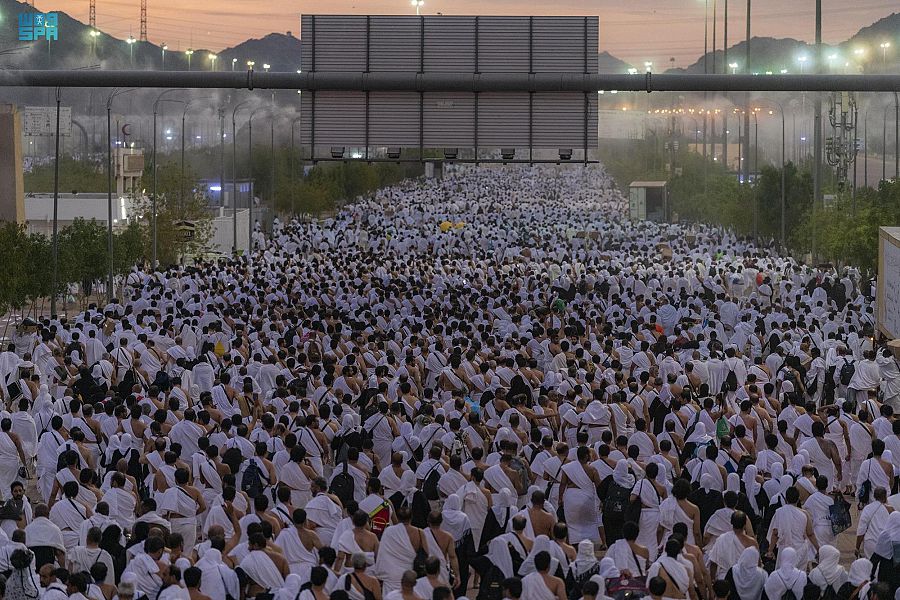
HEADING TO MUZDALIFAH
It states in the Hadeeth of Jaabir (radiallahu anhu):
ثُمَّ رَكِبَ رَسُولُ اللّهِ . حَتَّى أَتَى الْمَوْقِفَ. فَجَعَلَ بَطْنَ نَاقَتِهِ الْقَصْوَاءِ إِلَى الصَّخَرَاتِ. وَجَعَلَ حَبْلَ الْمُشَاةِ بَيْنَ يَدَيْهِ. وَاسْتَقْبَلَ الْقِبْلَةَ. فَلَمْ يَزَلْ وَاقِفاً حَتَّى غَرَبَتِ الشَّمْسُ. وَذَهَبَتِ الصُّفْرَةُ قَلِيلاً حَتَّى غَابَ الْقُرْصُ. وَأَرْدَفَ أُسَامَةَ خَلْفَهُ. وَدَفَعَ رَسُولُ اللّهِ وَقَدْ شَنَقَ لِلْقَصْوَاءِ الزِّمَامَ. حَتَّى إِنَّ رَأْسَهَا لَيُصِيبُ مَوْرِكَ رَحْلِهِ. وَيَقُولُ بِيَدِهِ الْيُمْنَى: أَيُّهَا النَّاسُ السَّكِينَةَ السَّكِينَةَ. كُلَّمَا أَتَى حَبْلاً مِنَ الْحِبَالِ أَرْخَى لَهَا قَليلاً.حَتَّى تَصْعَدَ. حَتَّى أَتَى الْمُزْدَلِفَةَ. فَصَلَّى بِهَا الْمَغْرِبَ وَالْعِشَاءَ بِأَذَانٍ وَاحِدٍ وَإِقَامَتَيْنِ. وَلَمْ يُسَبِّحْ بَيْنَهُمَا شَيْئاً. ثُمَّ اضْطَجَعَ رَسُولُ اللّهِ حَتَّى طَلَعَ الْفَجْرُ. وَصَلَّى الْفَجْرَ، حِينَ تَبَيَّنَ لَهُ الصُّبْحُ، بِأَذَانٍ وَإِقَامَةٍ. ثُمَّ رَكِبَ الْقَصْوَاءَ. حَتَّى أَتَى الْمَشْعَرَ الْحَرَامَ. فَاسْتَقْبَلَ الْقِبْلَةَ. فَدَعَاهُ وَكَبَّرَهُ وَهَلَّلَهُ وَوَحَّدَهُ. فَلَمْ يَزَلْ وَاقِفَاً حَتَّى أَسْفَرَ جِدّاً. فَدَفَعَ قَبْلَ أَنْ تَطْلُعَ الشَّمْسُ. وَأَرْدَفَ الْفَضْلَ بْنَ عَبَّاسٍ. وَكَانَ رَجُلاً حَسَنَ الشَّعْرِ أَبْيَضَ وَسِيماً. فَلَمَّا دَفَعَ رَسُولُ اللّهِ مَرَّتْ بِهِ ظُعُنٌ يَجْرِينَ. فَطَفِقَ الْفَضْلُ يَنْظُرُ إِلَيْهِنَّ. فَوَضَعَ رَسُولُ اللّهِ يَدَهُ عَلَى وَجْهِالْفَضْلِ. فَحَوَّلَ الْفَضْلُ وَجْهَهُ إِلَى الشِّقِّ الآخَرِ يَنْظُرُ. فَحَوَّلَ رَسُولُ اللّهِ يَدَهُ مِنَ الشِّقِّ الآخَرِ عَلَى وَجْهِ الْفَضْلِ. يَصْرِفُ وَجْهَهُ مِنَ الشِّقِّ الآخَرِ يَنْظُرُ. حَتَّى أَتَى بَطْنَ مُحَسِّرٍ
The Messenger of Allah (sallahu alaihi wasallam) then mounted his camel and came to the place of stay, making his she-camel al-Qaswa, turn towards the side where there we are rocks, having the path taken by those who went on foot in front of him, and faced the Qibla. He kept standing there until the sun set, and the yellow light had somewhat gone, and the disc of the sun had disappeared. He made Usama (radiallahu anhu) sit behind him, and he pulled the nose-string of Qaswa so forcefully that its head touched the saddle (in order to keep her under perfect control), and he pointed out to the people with his right hand to be moderate (in speed), and whenever he happened to pass over an elevated tract of sand, he slightly loosened it (the nose-string of his camel) until she climbed up and this is how he reached al-Muzdalifa. There he led the Maghrib and Isha prayers with one Adhan and two Iqamas and did not glorify (Allah) in between them (i. e. he did not observe supererogatory rakahs between the Maghrib and Isha prayers). The Messenger of Allah (sallahu alaihi wasallam) then lay down until dawn and offered the Fajr prayer with an Adhan and Iqama when the morning light was clear. He again mounted al-Qaswa, and when he came to al-Mashar al-Haram, he faced towards Qibla, supplicated to Him, Glorified Him, and pronounced His Uniqueness (Laa ilaaha illa Allah) and Oneness, and kept standing until the daylight was very clear. He then went quickly before the sun rose. [Sahih Muslim, Hadeeth No. 2803]
Muzdalifah is referred to as Mashar Al-Haram and Jam (جَمْع). Here’s what one needs to do after reaching it:
1. Halt at Muzdalifah
This is what Muzdalifah looked like in the past.

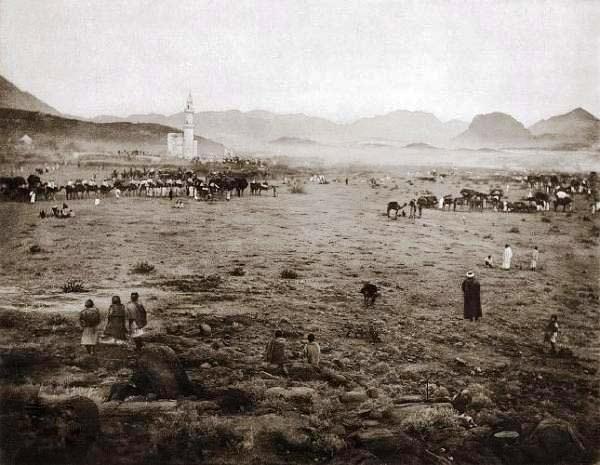
This was what the masjid there looked like:
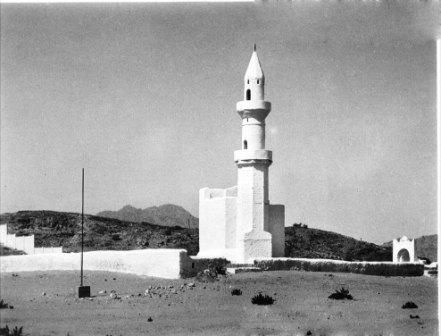
This is Muzdalifah looks like in the present time:
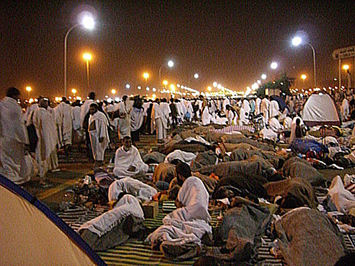
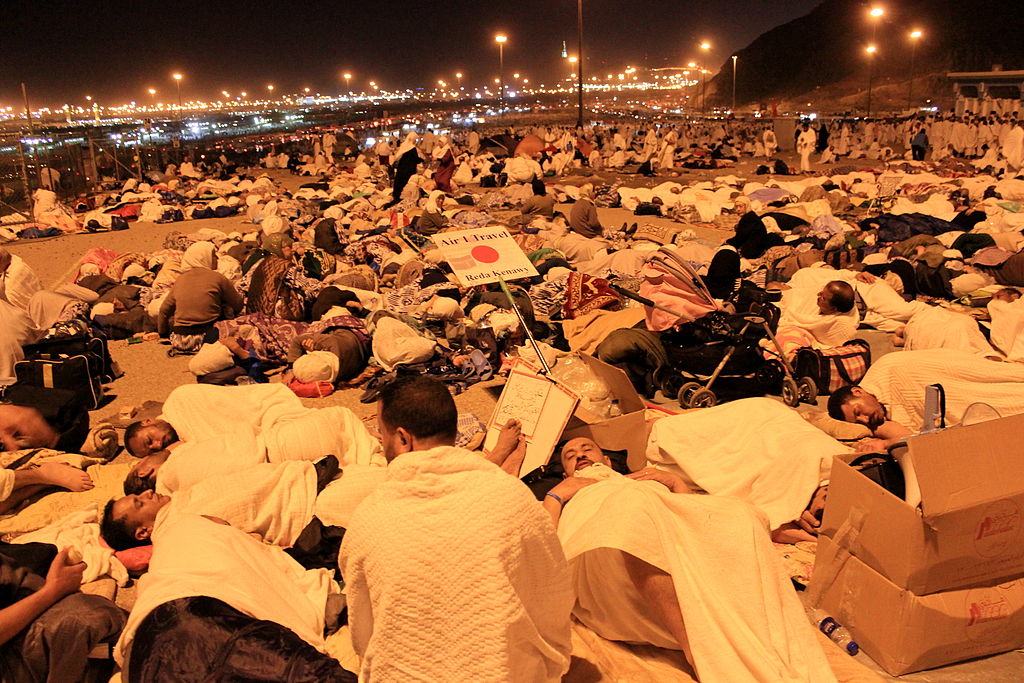
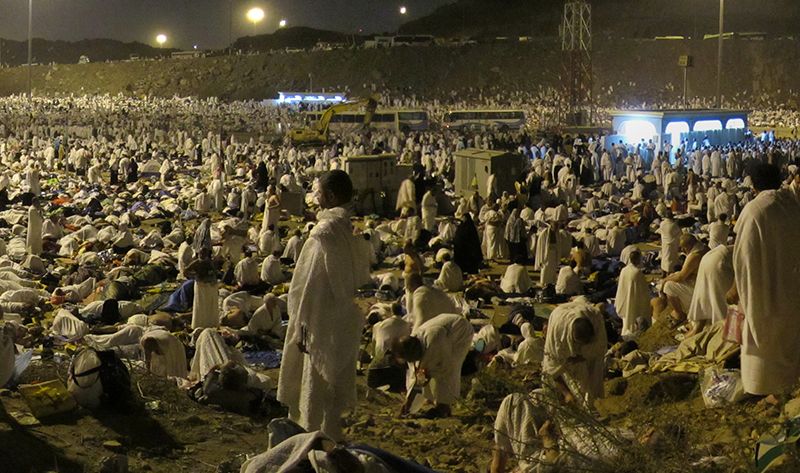
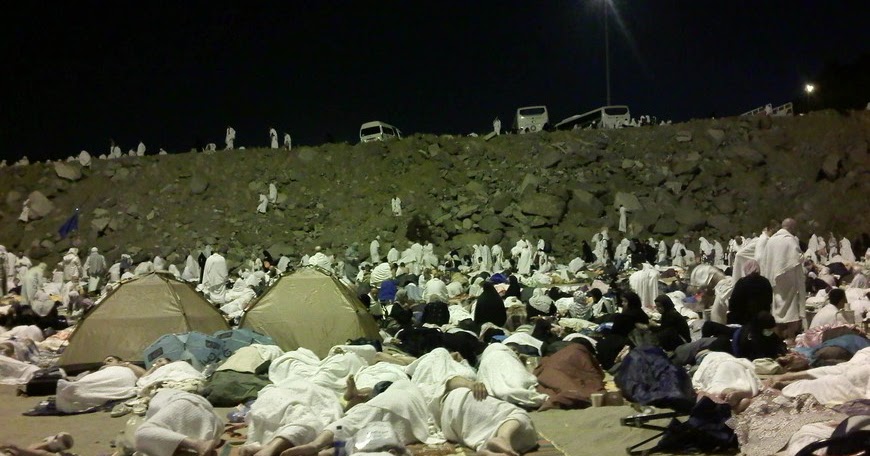
This is what the masjid there looks like in today’s time:
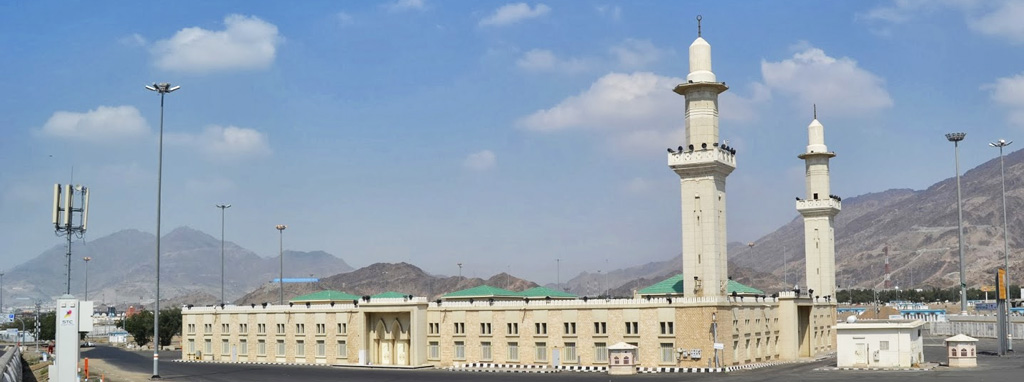
One can be anywhere in Mina except the valley of Muhassir.
عَنْ جَابِرِ بْنِ عَبْدِ اللَّهِ، قَالَ قَالَ رَسُولُ اللَّهِ ـ صلى الله عليه وسلم : كُلُّ عَرَفَةَ مَوْقِفٌ وَارْفَعُوا عَنْ بَطْنِ عُرَنَةَ وَكُلُّ الْمُزْدَلِفَةِ مَوْقِفٌ وَارْفَعُوا عَنْ بَطْنِ مُحَسِّرٍ وَكُلُّ مِنًى مَنْحَرٌ إِلاَّ مَا وَرَاءَ الْعَقَبَةِ
It was narrated from Jabir bin Abdullah (radiallahu anhuma) that the Messenger of Allah (sallallahu alaihi wasallam) said “All of Arafah is the place of standing, but keep away from the interior of Uranah. And all of Muzdalifah is the place of standing but keep away from the interior of Muhassir. And all of Mina is the place of sacrifice, except for what is beyond Aqabah.” [Sunan Ibn Majah, Hadeeth No. 3012. Graded “sahih” (authentic) by Al-Albani except for the words “except what is beyond Aqabah.”]
It seems that the army of Abraha was destroyed in Muhassir. The story of Abraha is mentioned is Surah Al-Feel.
This is what the valley of Muhassir seems to look like:
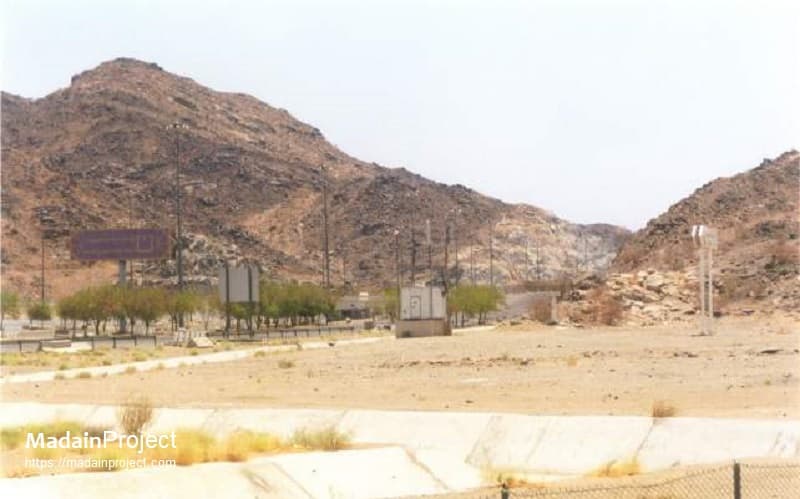
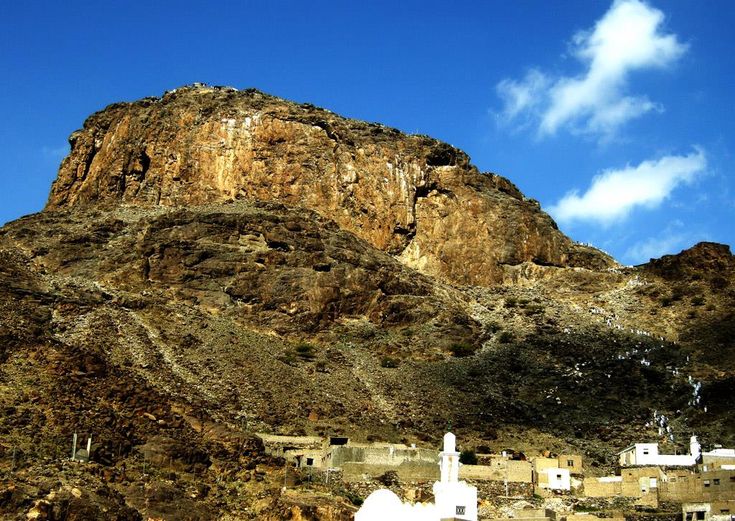
There are signposts pointing out where Muzdalifah begin and ends. Make sure you are within that area.
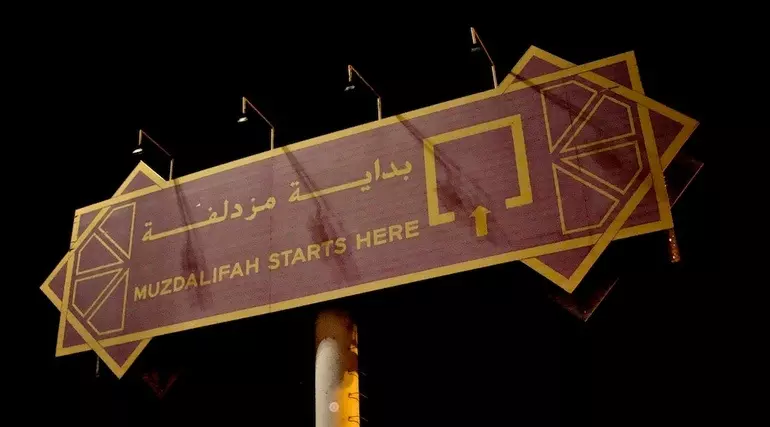
[I’m assuming there must be a “Muzdalifah ends here” sign as well but I was unable to find a picture of it online.]
Please remember that unlike Arafah, Muzdalifah is part of the Haram, so the rules that apply to the Haram applies to Muzdalifah as well.
2. Combine and shorten Maghrib and Isha and pray them upon arrival
Isha is shortened to 2 rakahs and it is prayed with Maghrib upon one’s arrival at Muzdalifah.
فَصَلَّى بِهَا الْمَغْرِبَ وَالْعِشَاءَ بِأَذَانٍ وَاحِدٍ وَإِقَامَتَيْنِ. وَلَمْ يُسَبِّحْ بَيْنَهُمَا شَيْئاً
There he led the Maghrib and Isha prayers with one Adhan and two Iqamas and did not glorify (Allah) in between them (i. e. he did not observe supererogatory rakahs between the Maghrib and Isha prayers). [Sahih Muslim, Hadeeth No. 2803]
عَنْ أُسَامَةَ بْنِ زَيْدٍ، أَنَّهُ سَمِعَهُ يَقُولُ دَفَعَ رَسُولُ اللَّهِ صلى الله عليه وسلم مِنْ عَرَفَةَ حَتَّى إِذَا كَانَ بِالشِّعْبِ نَزَلَ فَبَالَ، ثُمَّ تَوَضَّأَ وَلَمْ يُسْبِغِ الْوُضُوءَ. فَقُلْتُ الصَّلاَةَ يَا رَسُولَ اللَّهِ. فَقَالَ : الصَّلاَةُ أَمَامَكَ . فَرَكِبَ، فَلَمَّا جَاءَ الْمُزْدَلِفَةَ نَزَلَ فَتَوَضَّأَ، فَأَسْبَغَ الْوُضُوءَ، ثُمَّ أُقِيمَتِ الصَّلاَةُ فَصَلَّى الْمَغْرِبَ، ثُمَّ أَنَاخَ كُلُّ إِنْسَانٍ بَعِيرَهُ فِي مَنْزِلِهِ، ثُمَّ أُقِيمَتِ الْعِشَاءُ فَصَلَّى وَلَمْ يُصَلِّ بَيْنَهُمَا
Narrated Usama bin Zaid (radiallahu anhuma): Allah’s Messenger (sallallahu alaihi wasallam) proceeded from Arafah till when he reached the mountain pass, he dismounted, urinated and then performed ablution but not a perfect one. I said to him, (“Is it the time for) the prayer, O Allah’s Messenger?” He said, “The (place of) prayer is ahead of you.” He rode till when he reached Al-Muzdalifah, he dismounted and performed ablution and a perfect one, The (call for) Iqamah was pronounced and he led the Maghrib prayer. Then everybody made his camel kneel down at its place. Then the Iqamah was pronounced for the Isha prayer so he prayed and no prayer was offered in between the two prayers (Isha and Maghrib).[Sahih Al-Bukhari, Volume 1, Hadeeth No. 141]
3. Remember Allah
Don’t waste time at Muzdalifah. Remember to remember Allah!
فَإِذَا أَفَضْتُم مِّنْ عَرَفَاتٍ فَاذْكُرُوا اللَّـهَ عِندَ الْمَشْعَرِ الْحَرَامِ ۖ وَاذْكُرُوهُ كَمَا هَدَاكُمْ وَإِن كُنتُم مِّن قَبْلِهِ لَمِنَ الضَّالِّينَ
Then when you leave Arafaat, remember Allah (by glorifying His Praises, i.e. prayers and invocations, etc.) at the Mashar-al-Haraam. And remember Him (by invoking Allah for all good, etc.) as He has guided you, and verily, you were, before, of those who were astray. Then depart from the place whence all the people depart and ask Allah for His Forgiveness. Truly, Allah is Oft-Forgiving, Most-Merciful. [Surah Al-Baqarah (2) : 198]
Remember to keep reciting the talbiyah as well.
قَالَ كُرَيْبٌ فَأَخْبَرَنِي عَبْدُ اللَّهِ بْنُ عَبَّاسٍ، عَنِ الْفَضْلِ، أَنَّ رَسُولَ اللَّهِ صلى الله عليه وسلم لَمْ يَزَلْ يُلَبِّي حَتَّى بَلَغَ الْجَمْرَةَ
Kuraib said: Abdullah ibn Abbas (radiallahu anhuma) narrated from al-Fadl (radiallahu anhu) that Allah’s Messenger (sallallahu alaihi wasallam) continued pronouncing talbiyah until he reached al-Jamarah (al-Aqaba). [Sahih Muslim, Hadeeth No. 2931]
Also, one should try to continue reciting the takbeer as well.
However, one should not spend the whole night remembering Allah in Muzdalifah because the sunnah is to go to sleep. This way one will be fresh for the next day (which will be a busy one).
وَأَرْدَفَ أُسَامَةَ خَلْفَهُ. وَدَفَعَ رَسُولُ اللّهِ وَقَدْ شَنَقَ لِلْقَصْوَاءِ الزِّمَامَ. حَتَّى إِنَّ رَأْسَهَا لَيُصِيبُ مَوْرِكَ رَحْلِهِ. وَيَقُولُ بِيَدِهِ الْيُمْنَى: أَيُّهَا النَّاسُ السَّكِينَةَ السَّكِينَةَ. كُلَّمَا أَتَى حَبْلاً مِنَ الْحِبَالِ أَرْخَى لَهَا قَليلاً.حَتَّى تَصْعَدَ. حَتَّى أَتَى الْمُزْدَلِفَةَ. فَصَلَّى بِهَا الْمَغْرِبَ وَالْعِشَاءَ بِأَذَانٍ وَاحِدٍ وَإِقَامَتَيْنِ. وَلَمْ يُسَبِّحْ بَيْنَهُمَا شَيْئاً. ثُمَّ اضْطَجَعَ رَسُولُ اللّهِ حَتَّى طَلَعَ الْفَجْرُ. وَصَلَّى الْفَجْرَ، حِينَ تَبَيَّنَ لَهُ الصُّبْحُ، بِأَذَانٍ وَإِقَامَةٍ
He made Usama (radiallahu anhu) sit behind him, and he pulled the nose-string of Qaswa so forcefully that its head touched the saddle (in order to keep her under perfect control), and he pointed out to the people with his right hand to be moderate (in speed), and whenever he happened to pass over an elevated tract of sand, he slightly loosened it (the nose-string of his camel) until she climbed up and this is how he reached al-Muzdalifa. There he led the Maghrib and Isha prayers with one Adhan and two Iqamas and did not glorify (Allah) in between them (i. e. he did not observe supererogatory rakahs between the Maghrib and Isha prayers). The Messenger of Allah (sallahu alaihi wasallam) then lay down until dawn and offered the Fajr prayer with an Adhan and Iqama when the morning light was clear. [Sahih Muslim, Hadeeth No. 2803]
4. Spend the night in Muzdalifah
There are no tents in Muzdalifah so everyone sleeps in the open. Women need to be very careful not to expose themselves.
Try to take a small tent with you to sleep in at Muzdalifah. Many people also sleep inside the buses. Sleeping in corners where one cannot be seen is also an option especially for the ladies.
Remember, spending the night in Mina is an obligation. However, weak and young pilgrims may depart from Muzdalifah after the middle of the night. According to Shaikh Saleh Al-Fawzan in his book “A Summary of Islamic Jurisprudence – Part 1”, those who take care of these weak and young pilgrims can also leave with them. After the middle of the night means halfway between sunset (when Maghrib starts) and dawn (when Fajr starts).
عن ابْن عَبَّاسٍ ـ رضى الله عنهما ـ يَقُولُ أَنَا مِمَّنْ، قَدَّمَ النَّبِيُّ صلى الله عليه وسلم لَيْلَةَ الْمُزْدَلِفَةِ فِي ضَعَفَةِ أَهْلِهِ
Narrated Ibn Abbas (radiallahu anhuma): I was among those whom the Prophet (sallallahu alaihi wasallam) sent on the night of Al-Muzdalifah early being among the weak members of his family. [Sahih Al-Bukhari, Volume 2, Hadeeth No. 738]
عَن سَالِم وَكَانَ عَبْدُ اللَّهِ بْنُ عُمَرَ ـ رضى الله عنهما ـ يُقَدِّمُ ضَعَفَةَ أَهْلِهِ، فَيَقِفُونَ عِنْدَ الْمَشْعَرِ الْحَرَامِ بِالْمُزْدَلِفَةِ بِلَيْلٍ، فَيَذْكُرُونَ اللَّهَ مَا بَدَا لَهُمْ، ثُمَّ يَرْجِعُونَ قَبْلَ أَنْ يَقِفَ الإِمَامُ، وَقَبْلَ أَنْ يَدْفَعَ، فَمِنْهُمْ مَنْ يَقْدَمُ مِنًى لِصَلاَةِ الْفَجْرِ، وَمِنْهُمْ مَنْ يَقْدَمُ بَعْدَ ذَلِكَ، فَإِذَا قَدِمُوا رَمَوُا الْجَمْرَةَ، وَكَانَ ابْنُ عُمَرَ ـ رضى الله عنهما ـ يَقُولُ أَرْخَصَ فِي أُولَئِكَ رَسُولُ اللَّهِ صلى الله عليه وسلم.
Narrated Salim: Abdullah bin Umar (radiallahu anhuma) used to send the weak among his family early to Mina. So they used to depart from Al-Mashar Al-Haram (Al-Muzdalifah) at night (when the moon had set) and invoke Allah as much as they could, and then they would return (to Mina) before the Imam had started from Al-Muzdalifah to Mina. So some of them would reach Mina at the time of the Fajr prayer and some of them would come later. When they reached Mina they would throw pebbles on the Jamrah (Jamrat Al-Aqabah).
Ibn Umar used to say, “Allah’s Messenger (sallallahu alaihi wasallam) gave the permission to them (weak people) to do so.” [Sahih Al-Bukhari, Volume 2, Hadeeth No. 736]
عَنْ عَائِشَةَ ـ رضى الله عنها ـ قَالَتْ نَزَلْنَا الْمُزْدَلِفَةَ فَاسْتَأْذَنَتِ النَّبِيَّ صلى الله عليه وسلم سَوْدَةُ أَنْ تَدْفَعَ قَبْلَ حَطْمَةِ النَّاسِ، وَكَانَتِ امْرَأَةً بَطِيئَةً، فَأَذِنَ لَهَا، فَدَفَعَتْ قَبْلَ حَطْمَةِ النَّاسِ، وَأَقَمْنَا حَتَّى أَصْبَحْنَا نَحْنُ، ثُمَّ دَفَعْنَا بِدَفْعِهِ، فَلأَنْ أَكُونَ اسْتَأْذَنْتُ رَسُولَ اللَّهِ صلى الله عليه وسلم كَمَا اسْتَأْذَنَتْ سَوْدَةُ أَحَبُّ إِلَىَّ مِنْ مَفْرُوحٍ بِهِ
Narrated Aishah (radiallahu anha): We got down at Al-Muzdalifah and Sauda asked the permission of the Prophet (sallallahu alaihi wasallam) to leave (early) before the rush of the people. She was a slow woman and he gave her permission, so she departed (from Al-Muzdalifah) before the rush of the people. We kept on staying at Al-Muzdalifah till dawn, and set out with the Prophet (sallallahu alaihi wasallam) but (I suffered so much that) I wished I had taken the permission of Allah’s Messenger (sallallahu alaihi wasallam) as Sauda had done, and that would have been dearer to me than any other happiness. [Sahih Al-Bukhari, Volume 2, Hadeeth No. 741]
عَن عَبْدُ اللَّهِ، مَوْلَى أَسْمَاءَ عَنْ أَسْمَاءَ، أَنَّهَا نَزَلَتْ لَيْلَةَ جَمْعٍ عِنْدَ الْمُزْدَلِفَةِ، فَقَامَتْ تُصَلِّي، فَصَلَّتْ سَاعَةً، ثُمَّ قَالَتْ يَا بُنَىَّ هَلْ غَابَ الْقَمَرُ قُلْتُ لاَ. فَصَلَّتْ سَاعَةً، ثُمَّ قَالَتْ هَلْ غَابَ الْقَمَرُ قُلْتُ نَعَمْ. قَالَتْ فَارْتَحِلُوا. فَارْتَحَلْنَا، وَمَضَيْنَا حَتَّى رَمَتِ الْجَمْرَةَ، ثُمَّ رَجَعَتْ فَصَلَّتِ الصُّبْحَ فِي مَنْزِلِهَا. فَقُلْتُ لَهَا يَا هَنْتَاهْ مَا أُرَانَا إِلاَّ قَدْ غَلَّسْنَا. قَالَتْ يَا بُنَىَّ، إِنَّ رَسُولَ اللَّهِ صلى الله عليه وسلم أَذِنَ لِلظُّعُنِ
Narrated Abdullah: (the slave of Asma) During the night of Jam, Asma got down at Al-Muzdalifah and stood up for (offering) the prayer and offered the prayer for some time and then asked, “O my son! Has the moon set?” I replied in the negative and she again prayed for another period and then asked, “Has the moon set?” I replied, “Yes.” So she said that we should set out (for Mina), and we departed and went on till she threw pebbles at the Jamrah (Jamrat-Al-Aqabah) and then she returned to her dwelling place and offered the morning prayer. I asked her, “O you! I think we have come (to Mina) early in the night.” She replied, “O my son! Allah’s Messenger (sallallahu alaihi wasallam) gave permission to the women to do so.”[Sahih Al-Bukhari, Volume 2, Hadeeth No. 739]
Some people like those carry water or tend to livestock might be exempt from spending the night at Muzdalifah. A person should refer to a person of knowledge if they require an exemption.
What if one reaches Muzdalifah very late?
عَنْ عُرْوَةَ بْنِ مُضَرِّسٍ الطَّائِيِّ، أَنَّهُ حَجَّ عَلَى عَهْدِ رَسُولِ اللَّهِ ـ صلى الله عليه وسلم ـ فَلَمْ يُدْرِكِ النَّاسَ إِلاَّ وَهُمْ بِجَمْعٍ . قَالَ فَأَتَيْتُ النَّبِيَّ ـ صلى الله عليه وسلم ـ فَقُلْتُ يَا رَسُولَ اللَّهِ إِنِّي أَنْضَيْتُ رَاحِلَتِي وَأَتْعَبْتُ نَفْسِي وَاللَّهِ إِنْ تَرَكْتُ مِنْ حَبْلٍ إِلاَّ وَقَفْتُ عَلَيْهِ فَهَلْ لِي مِنْ حَجٍّ فَقَالَ النَّبِيُّ ـ صلى الله عليه وسلم ـ : مَنْ شَهِدَ مَعَنَا الصَّلاَةَ وَأَفَاضَ مِنْ عَرَفَاتٍ لَيْلاً أَوْ نَهَارًا فَقَدْ قَضَى تَفَثَهُ وَتَمَّ حَجُّهُ
عَنْ عُرْوَة بْنُ مُضَرِّسٍ الطَّائِيُّ، قَالَ أَتَيْتُ رَسُولَ اللَّهِ صلى الله عليه وسلم فَقُلْتُ أَتَيْتُكَ مِنْ جَبَلَىْ طَيِّئٍ أَكْلَلْتُ مَطِيَّتِي وَأَتْعَبْتُ نَفْسِي مَا بَقِيَ مِنْ حَبْلٍ إِلاَّ وَقَفْتُ عَلَيْهِ فَهَلْ لِي مِنْ حَجٍّ فَقَالَ : مَنْ صَلَّى صَلاَةَ الْغَدَاةِ هَا هُنَا مَعَنَا وَقَدْ أَتَى عَرَفَةَ قَبْلَ ذَلِكَ فَقَدْ قَضَى تَفَثَهُ وَتَمَّ حَجُّهُ
One needs to leave Muzdalifah and set out for Mina before sunrise on the 10th of Dhul Hijjah.
عَنْ عَمْرِو بْنِ مَيْمُونٍ، قَالَ قَالَ عُمَرُ ـ رضى الله عنه ـ إِنَّ الْمُشْرِكِينَ كَانُوا لاَ يُفِيضُونَ مِنْ جَمْعٍ حَتَّى تَشْرُقَ الشَّمْسُ عَلَى ثَبِيرٍ، فَخَالَفَهُمُ النَّبِيُّ صلى الله عليه وسلم فَأَفَاضَ قَبْلَ أَنْ تَطْلُعَ الشَّمْسُ
Narrated Amr bin Maimoon: Umar (radiallahu anhu) said: The pagans used not to leave Jam’ (i.e. Muzdalifa) till the sun had risen on Thabir mountain. The Prophet (sallallahu alaihi wasallan) contradicted them by leaving (Muzdalifa) before the sun rose. [Sahih Al-Bukhari, Volume 5, Hadeeth No. 179]
This will be discussed in the next part, in shaa Allah.
[Here’s Part 10.]
